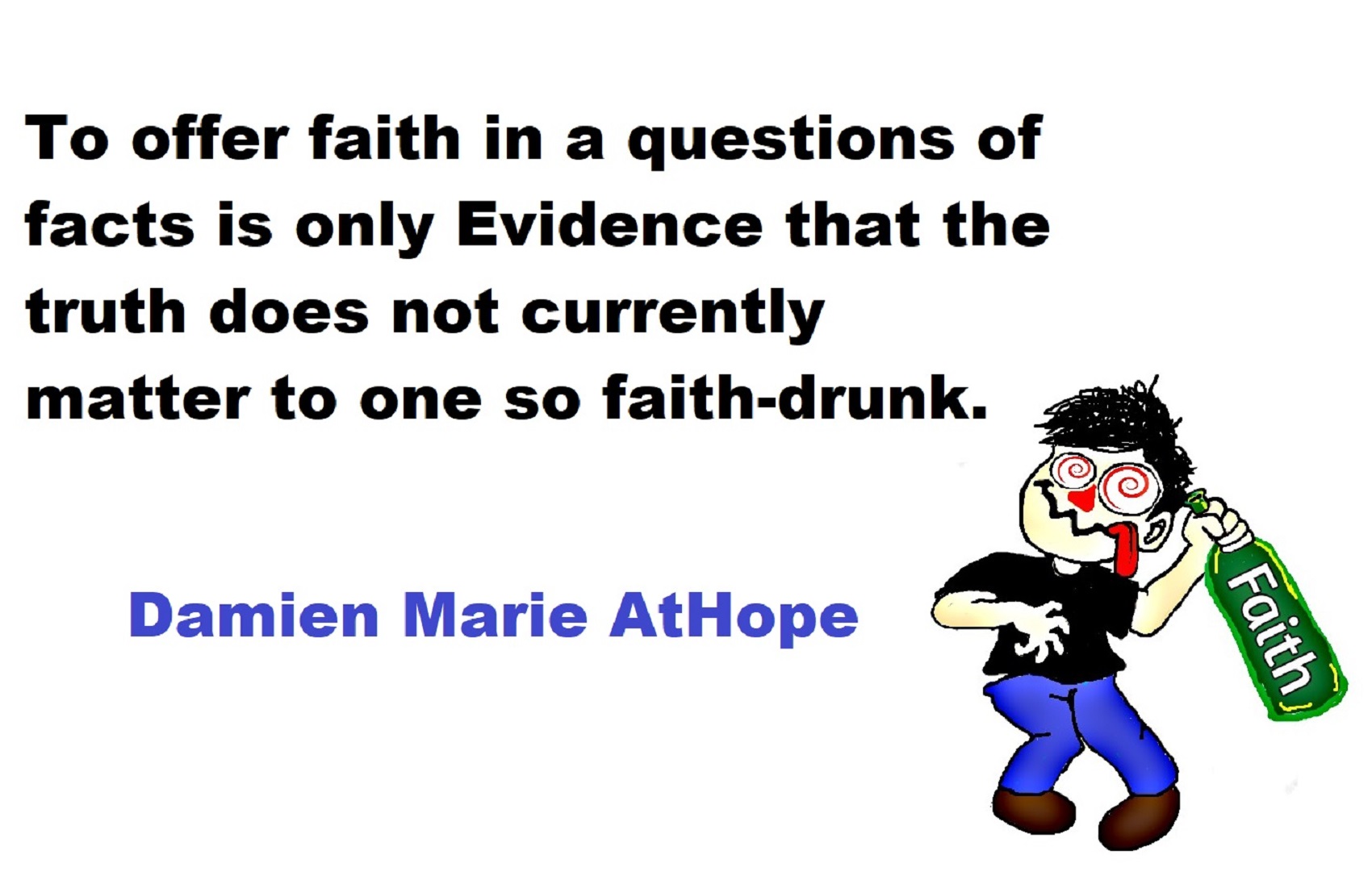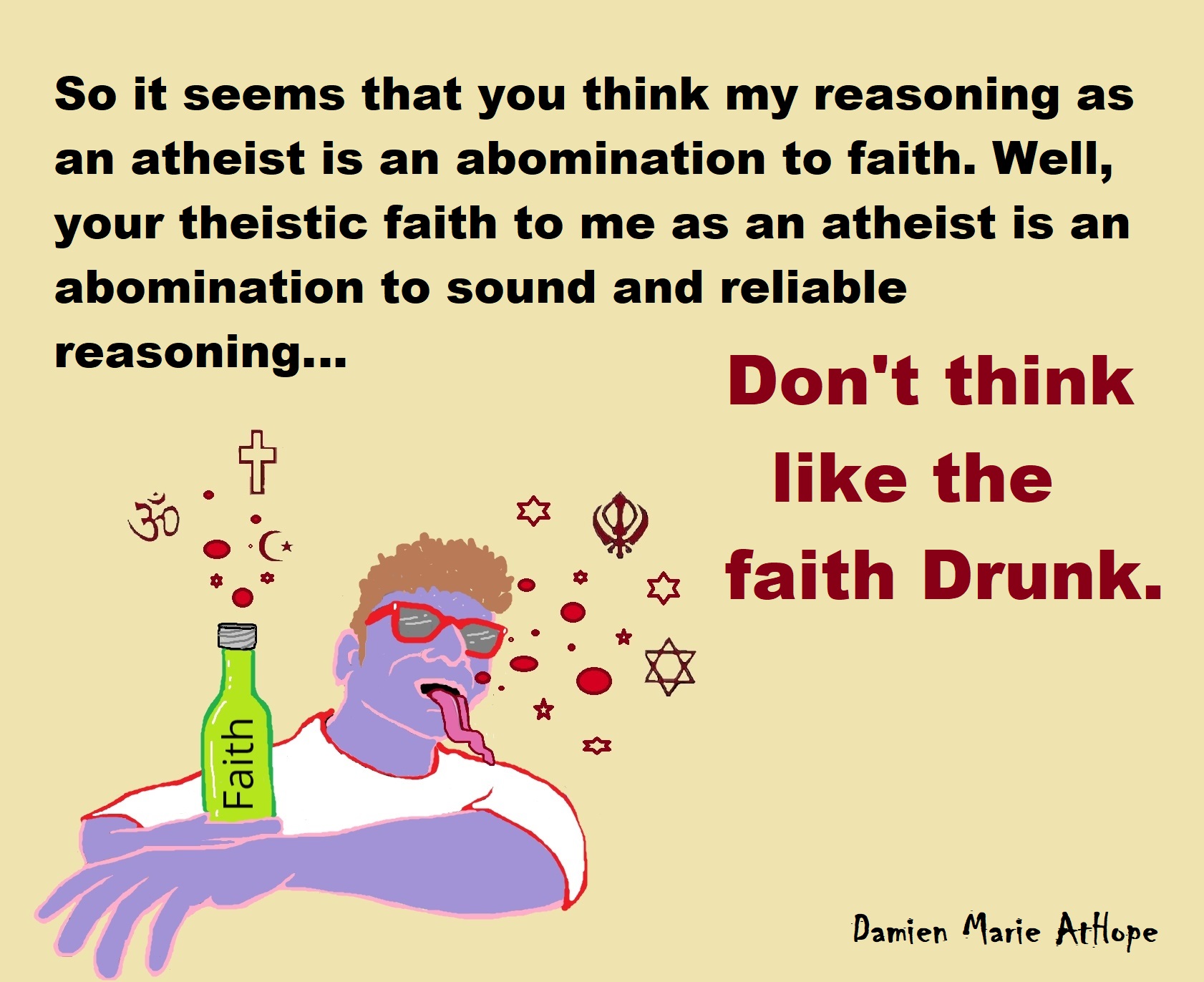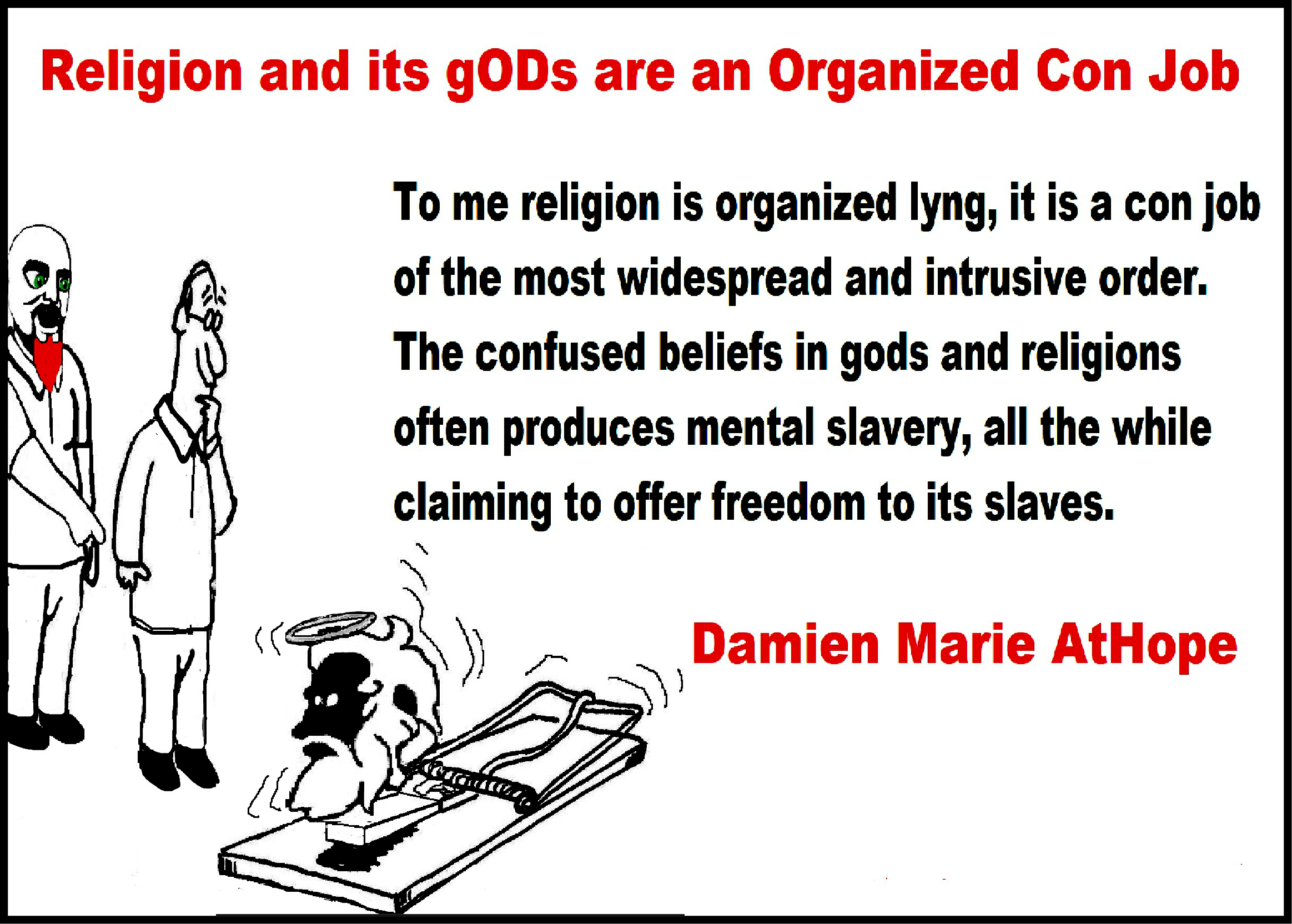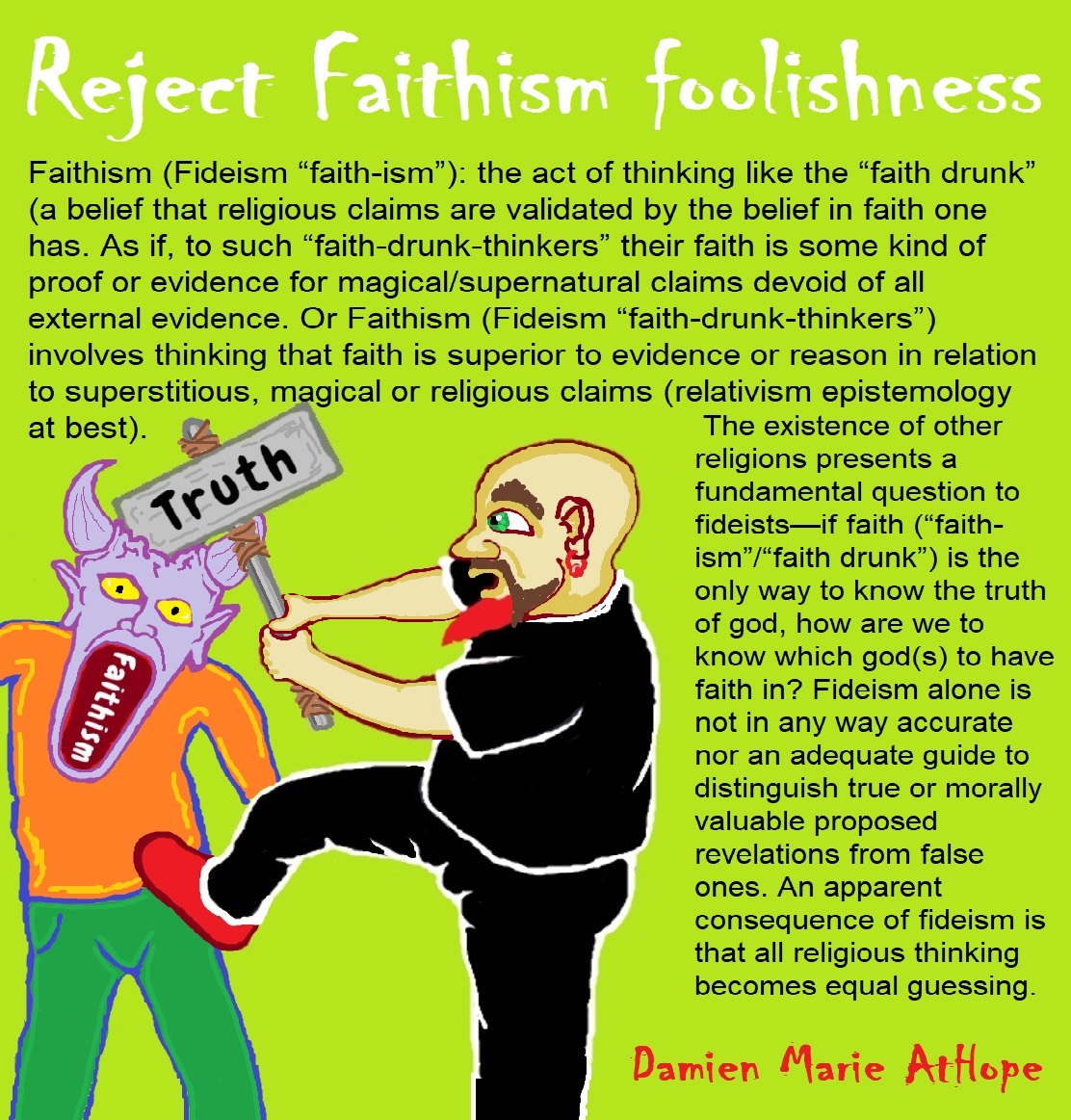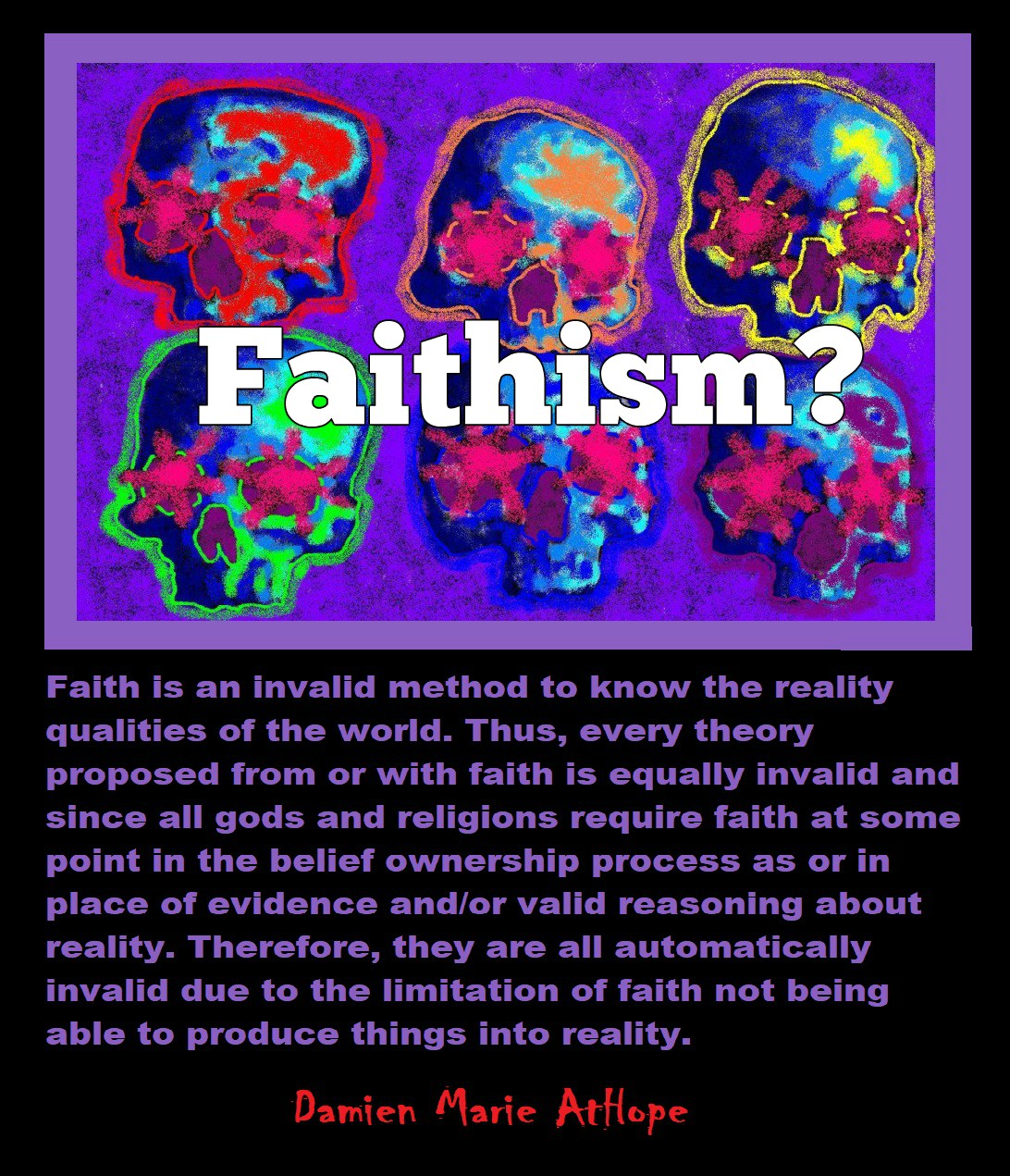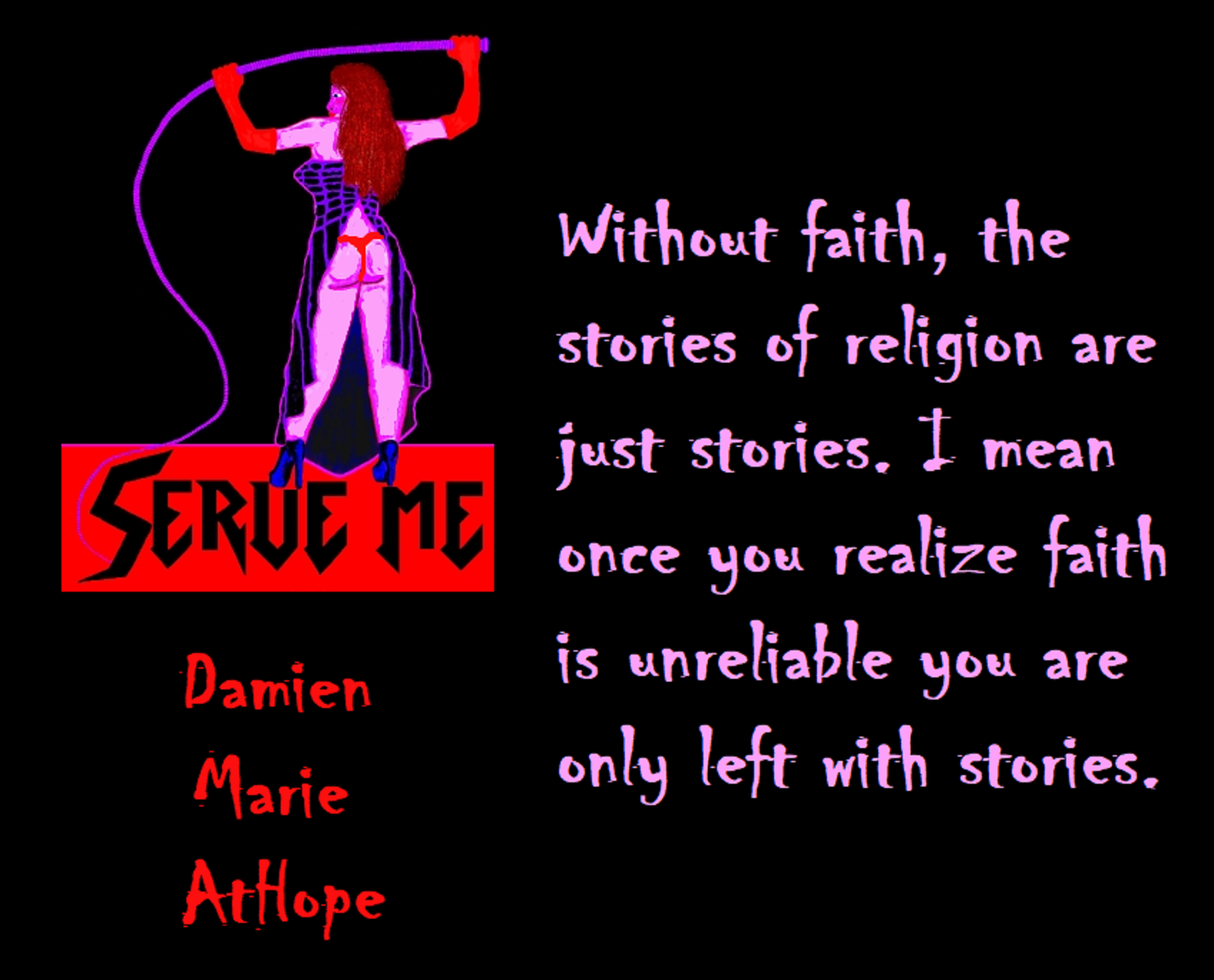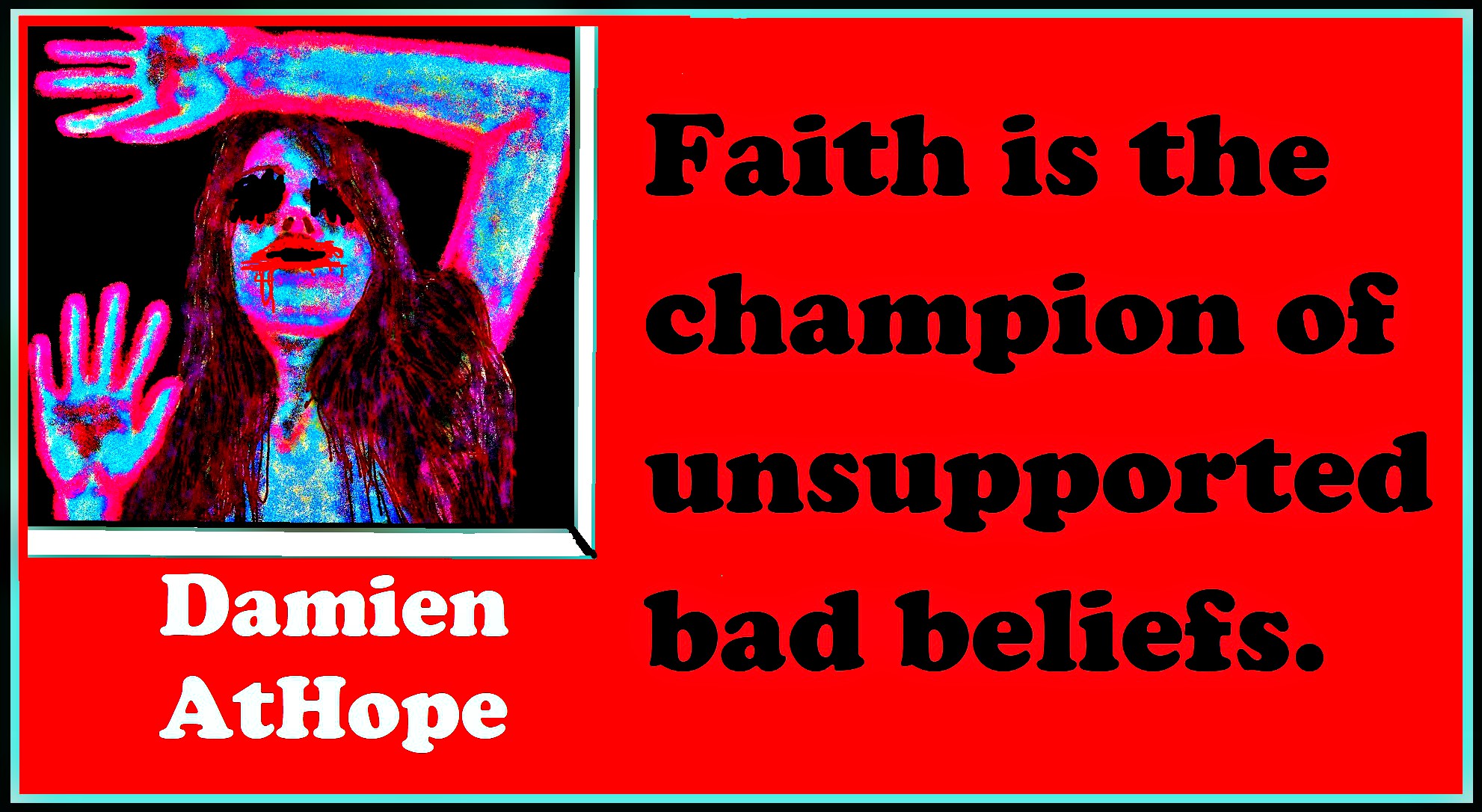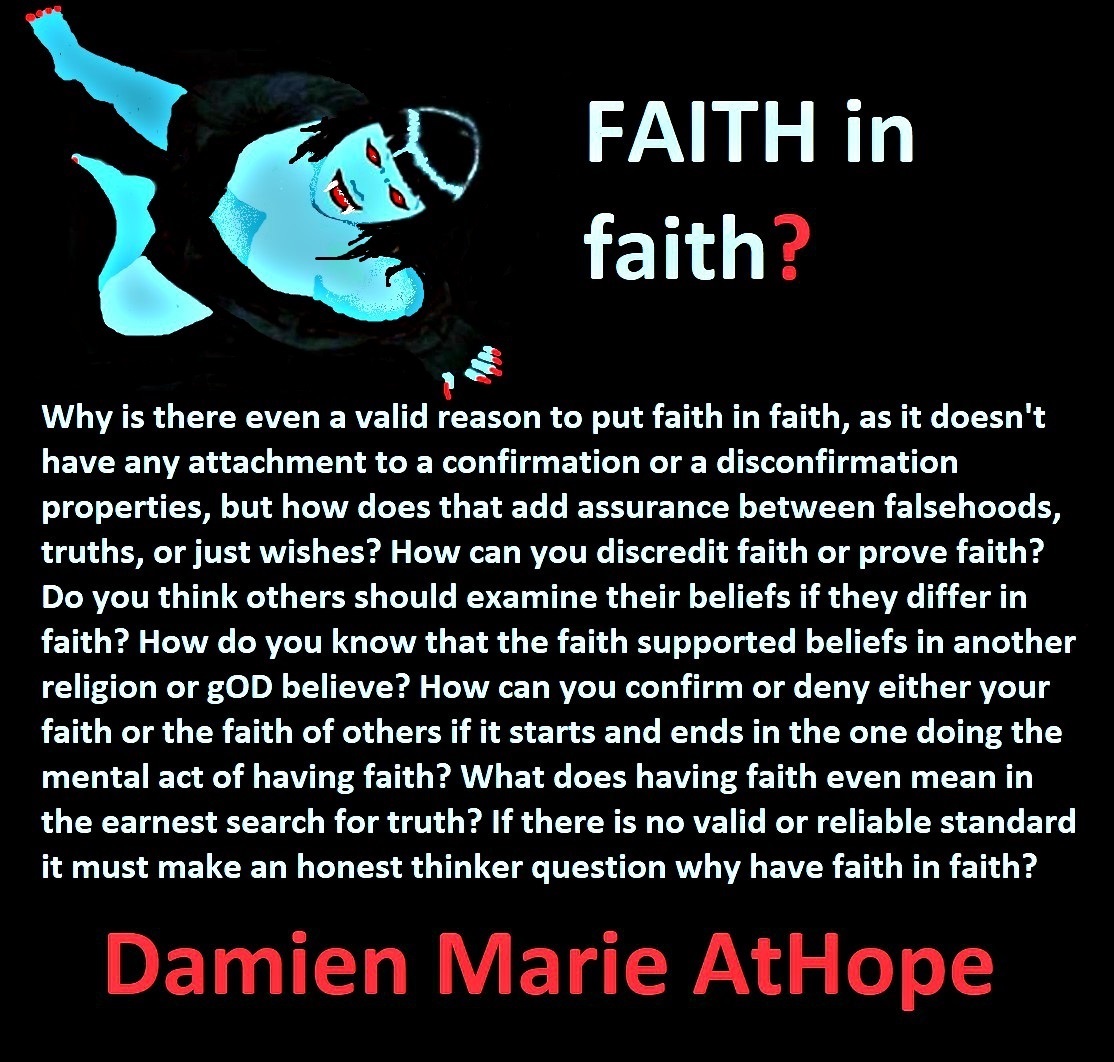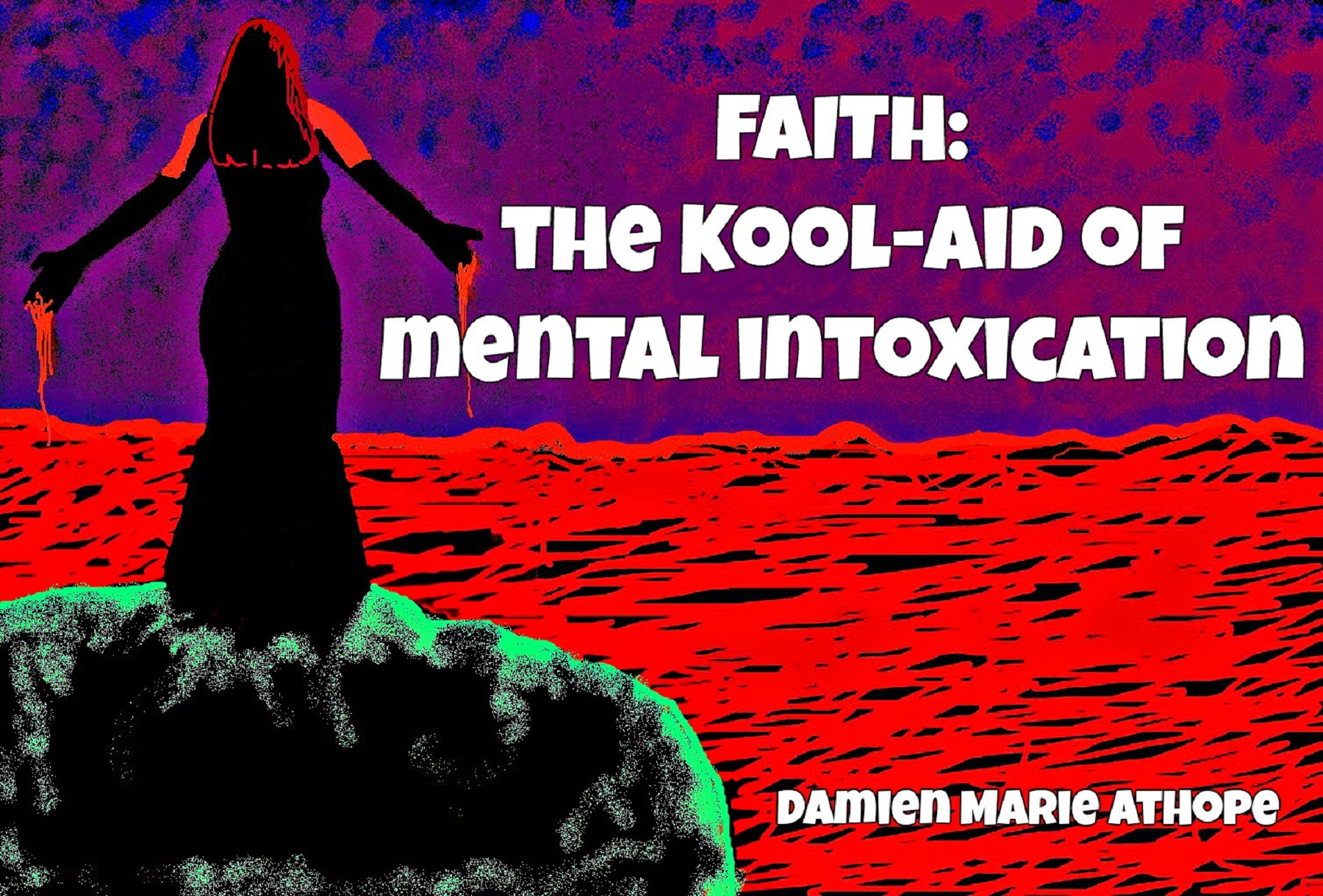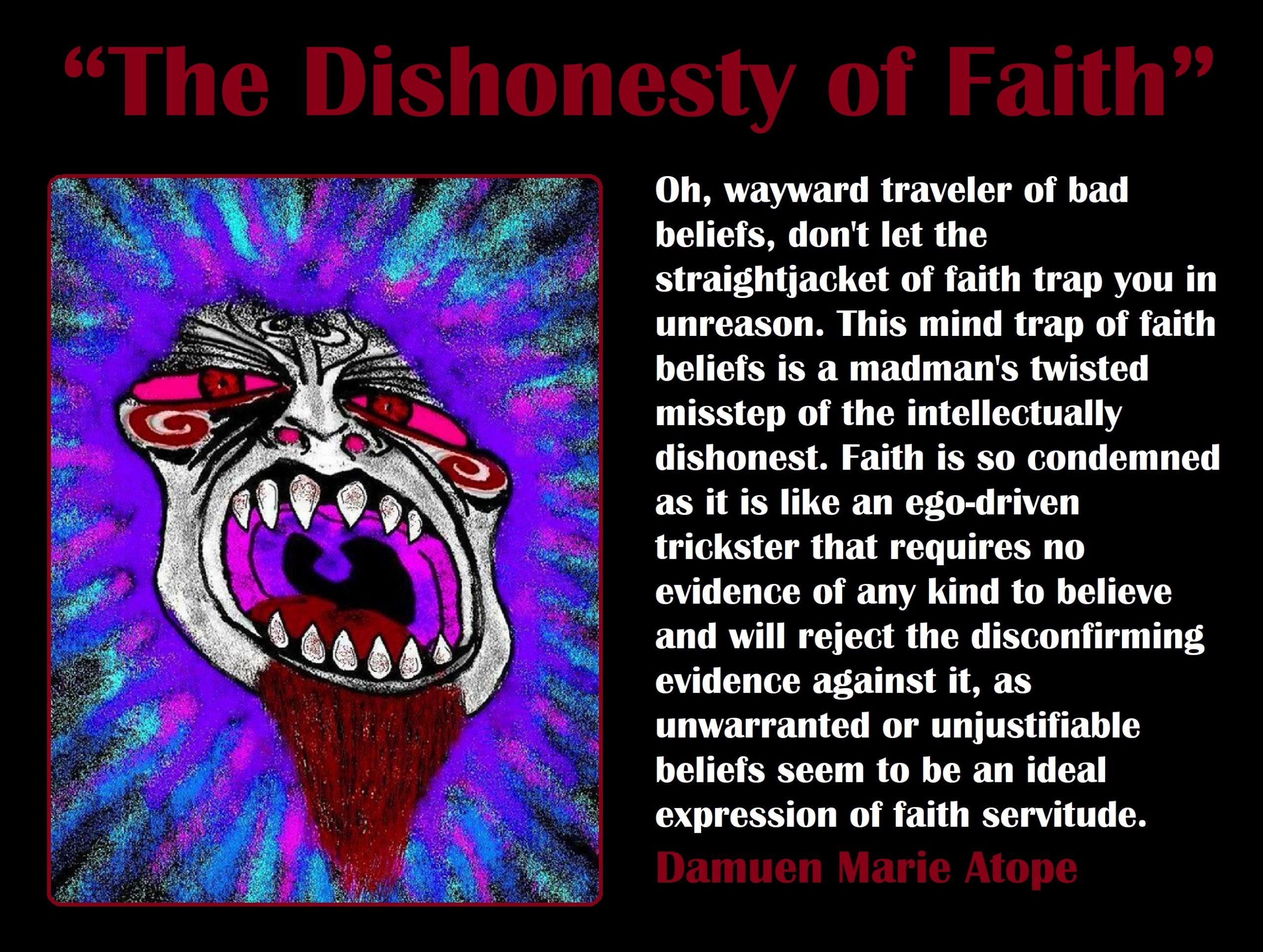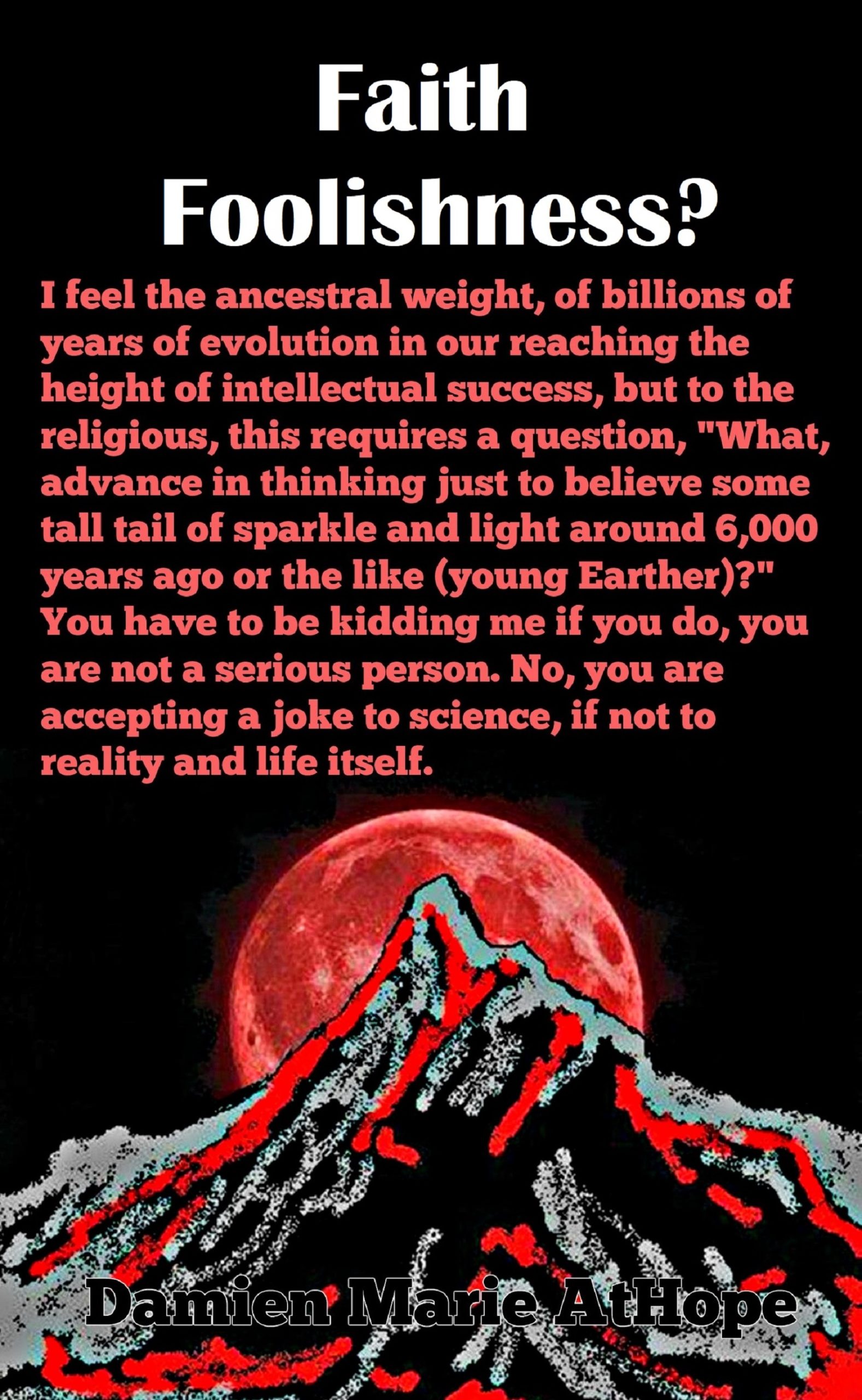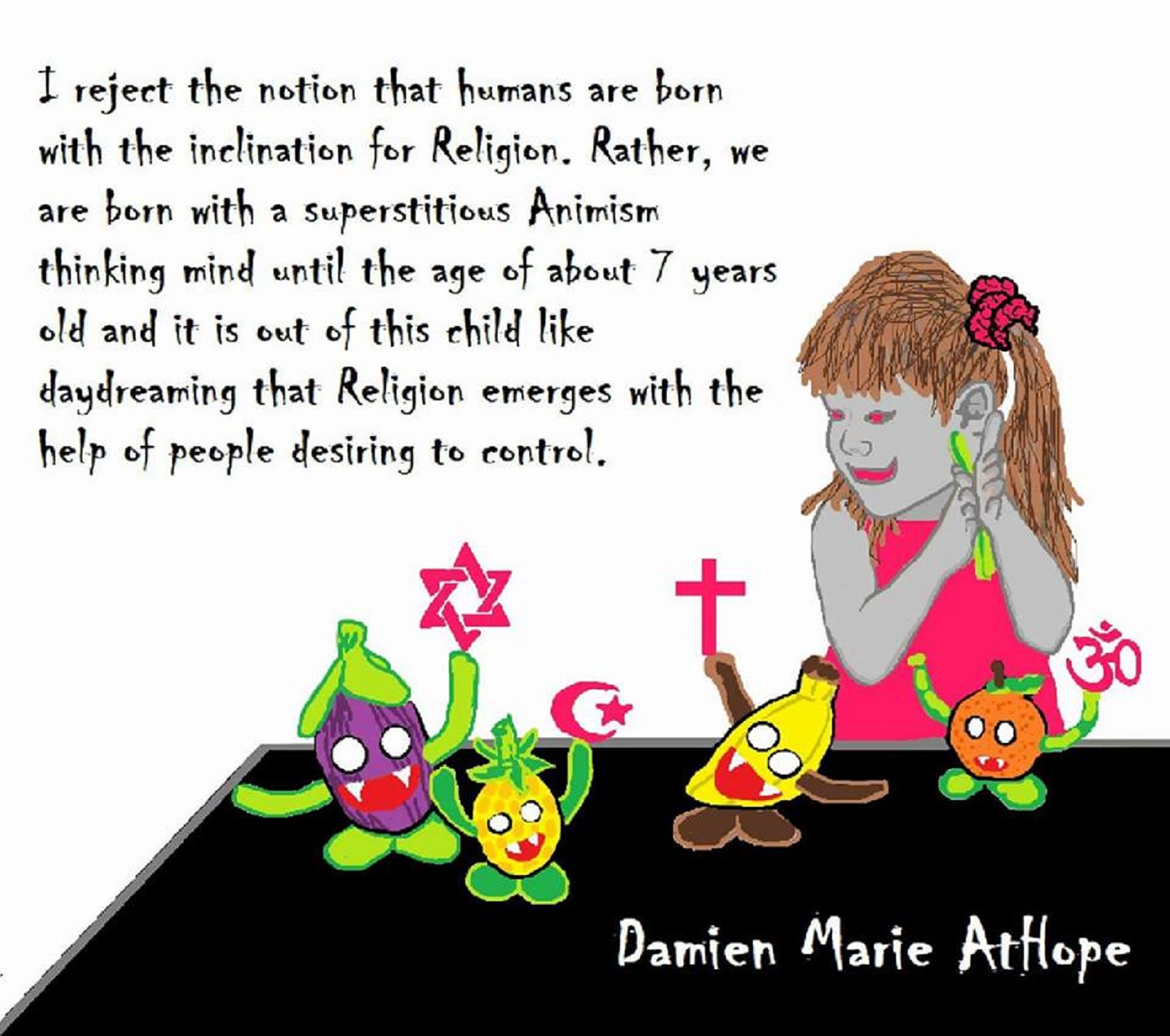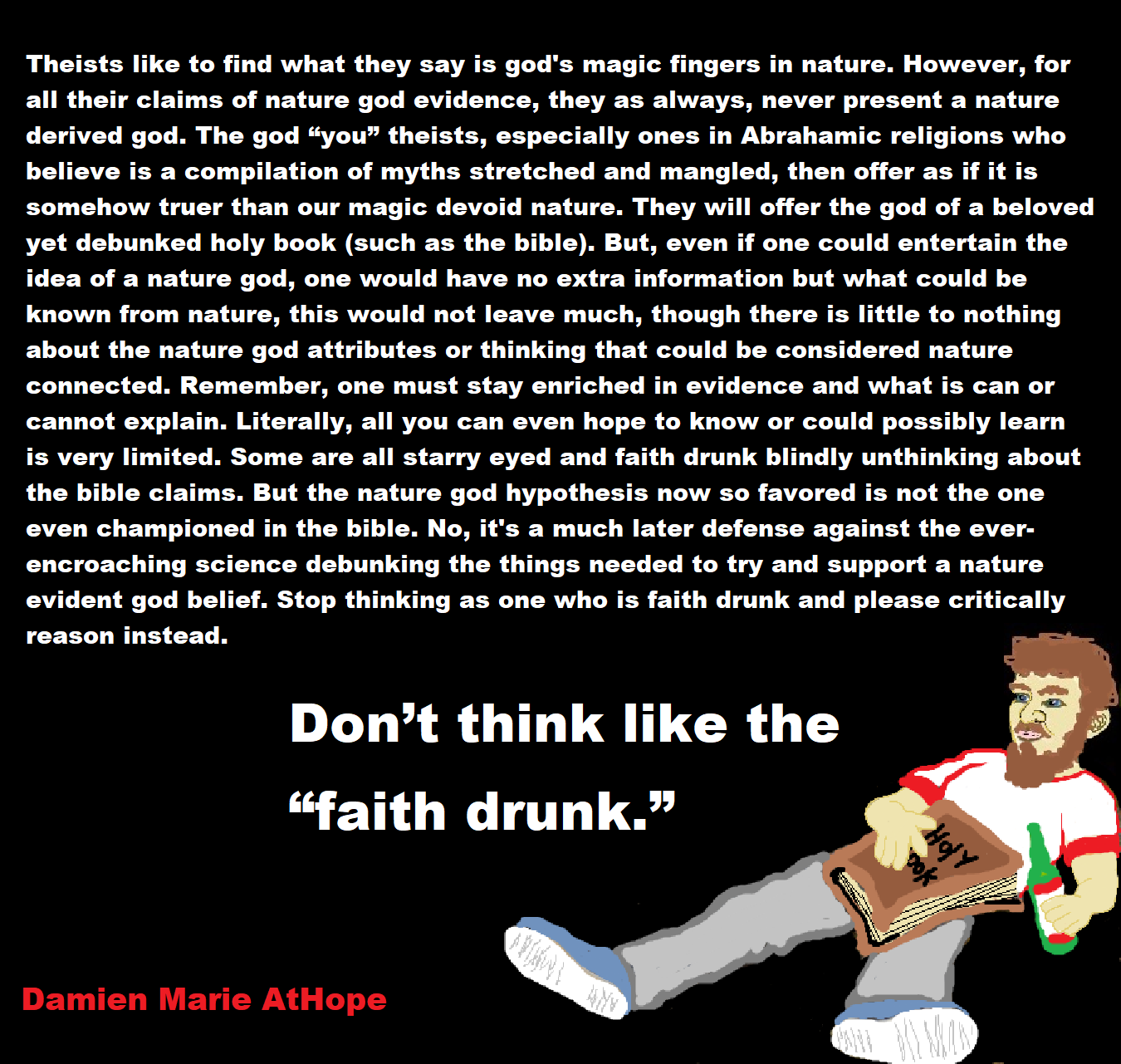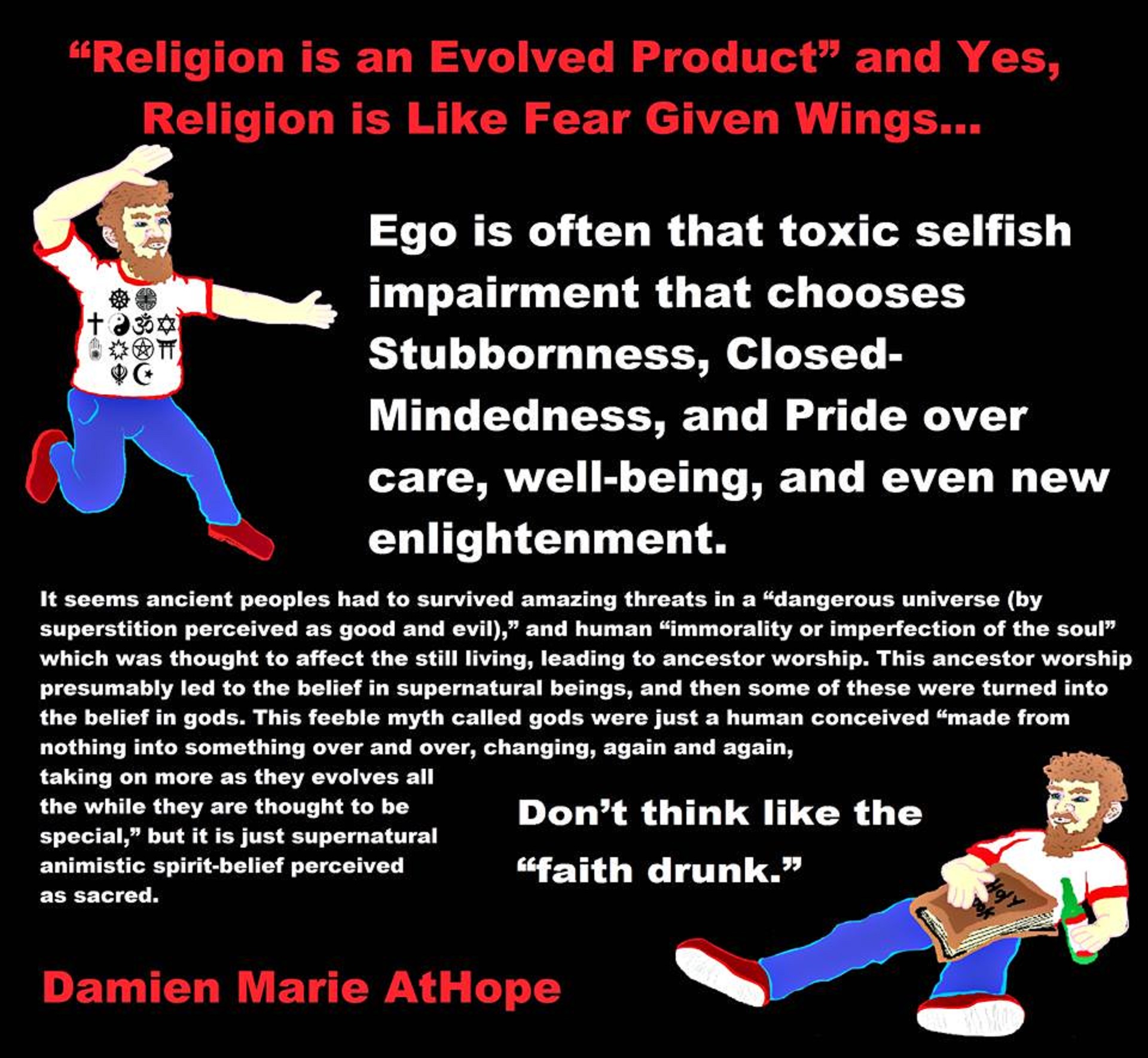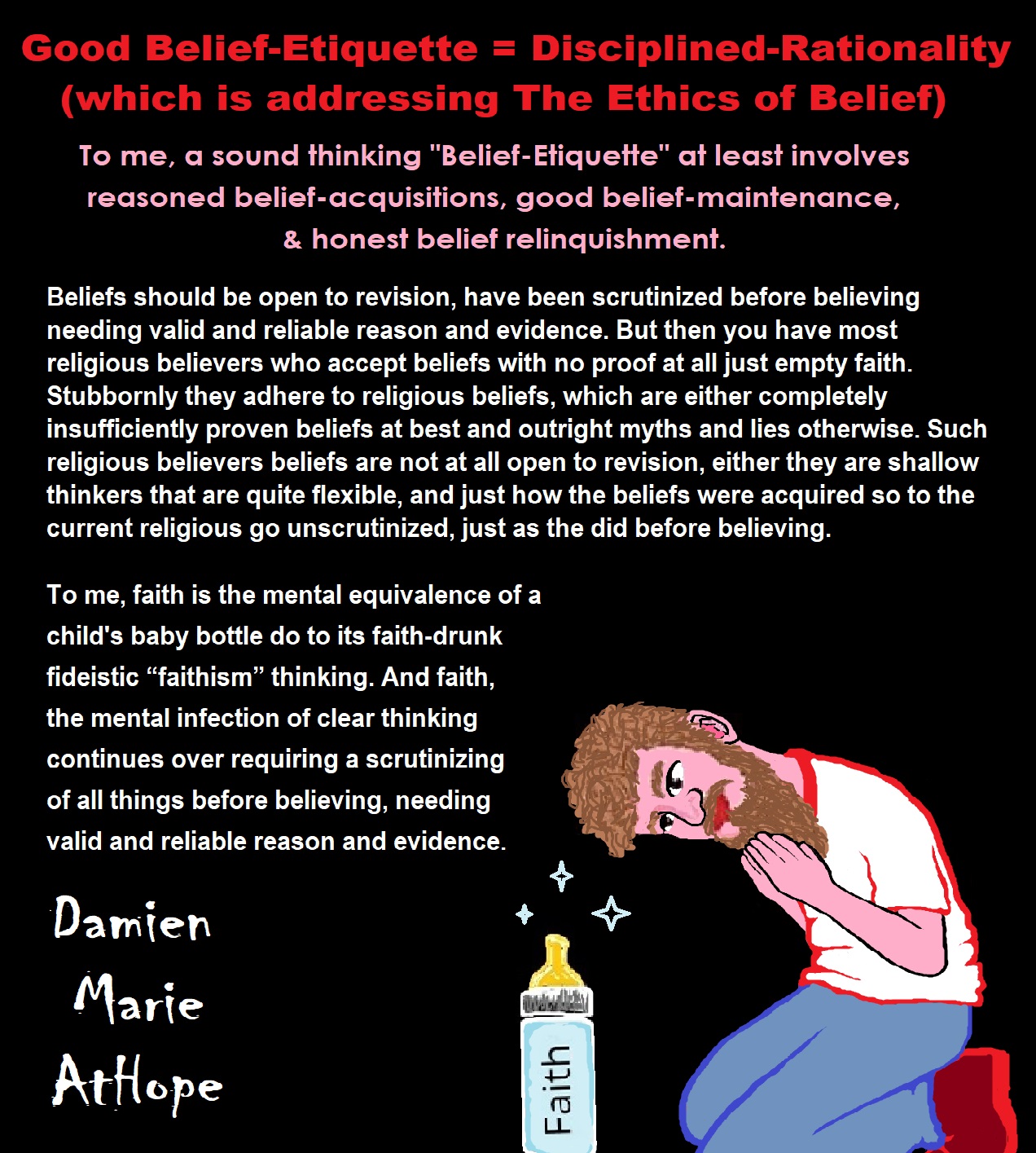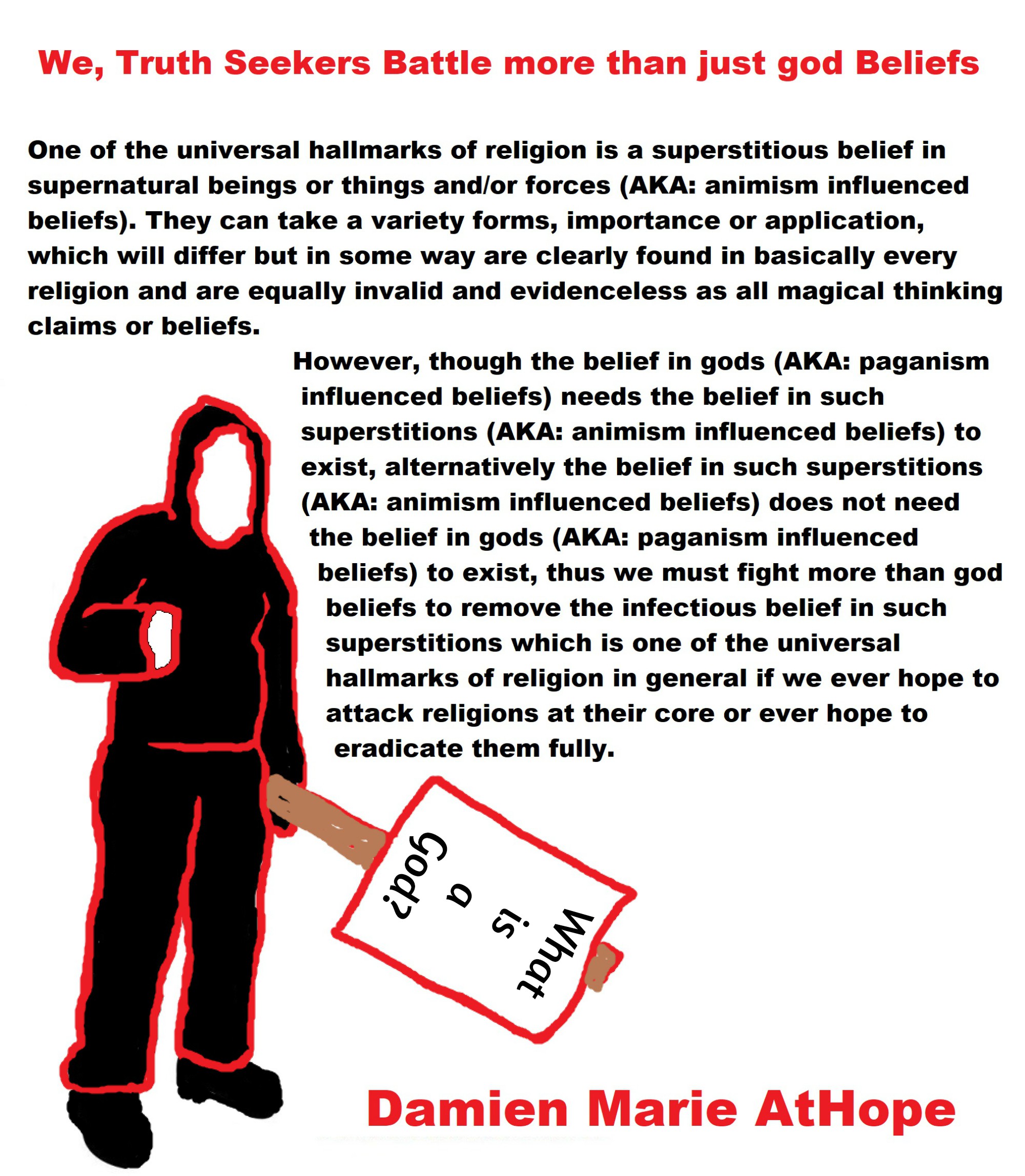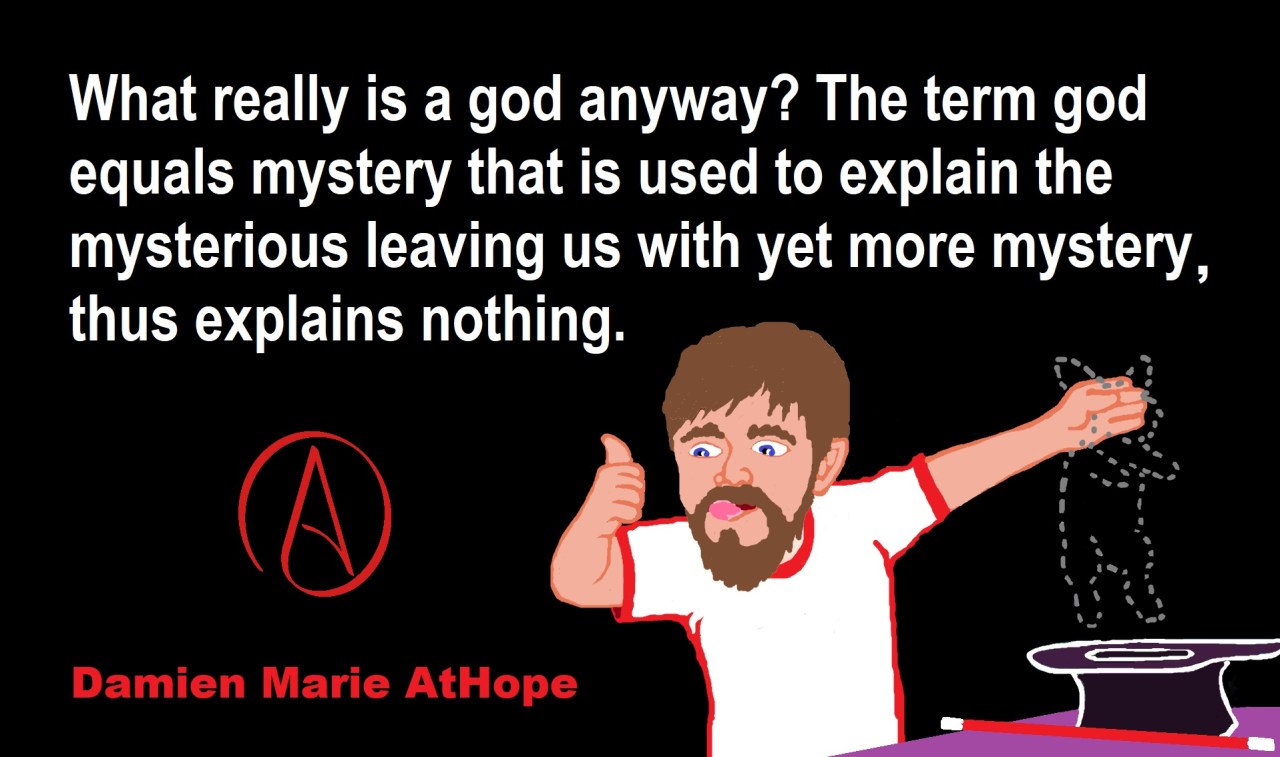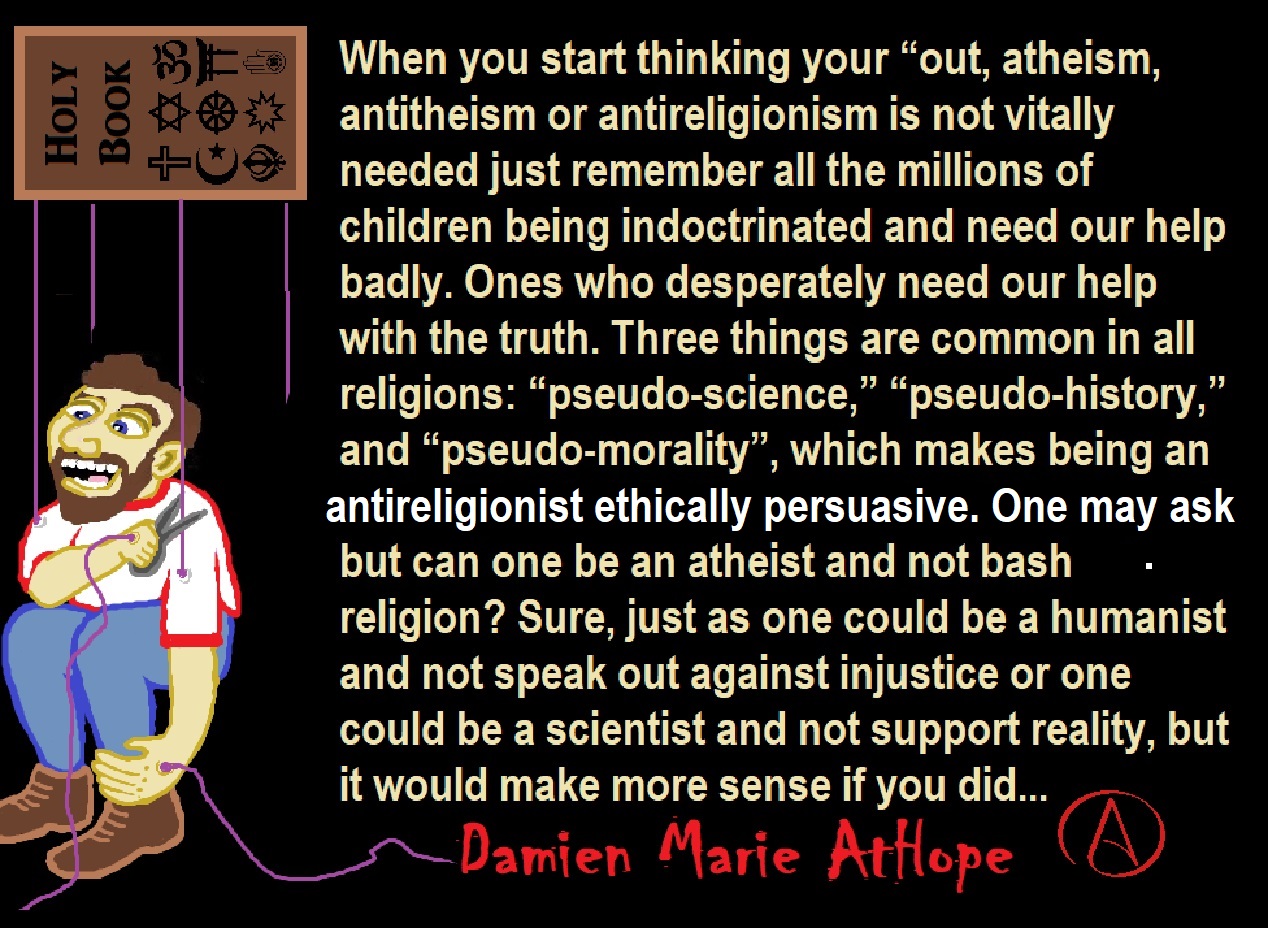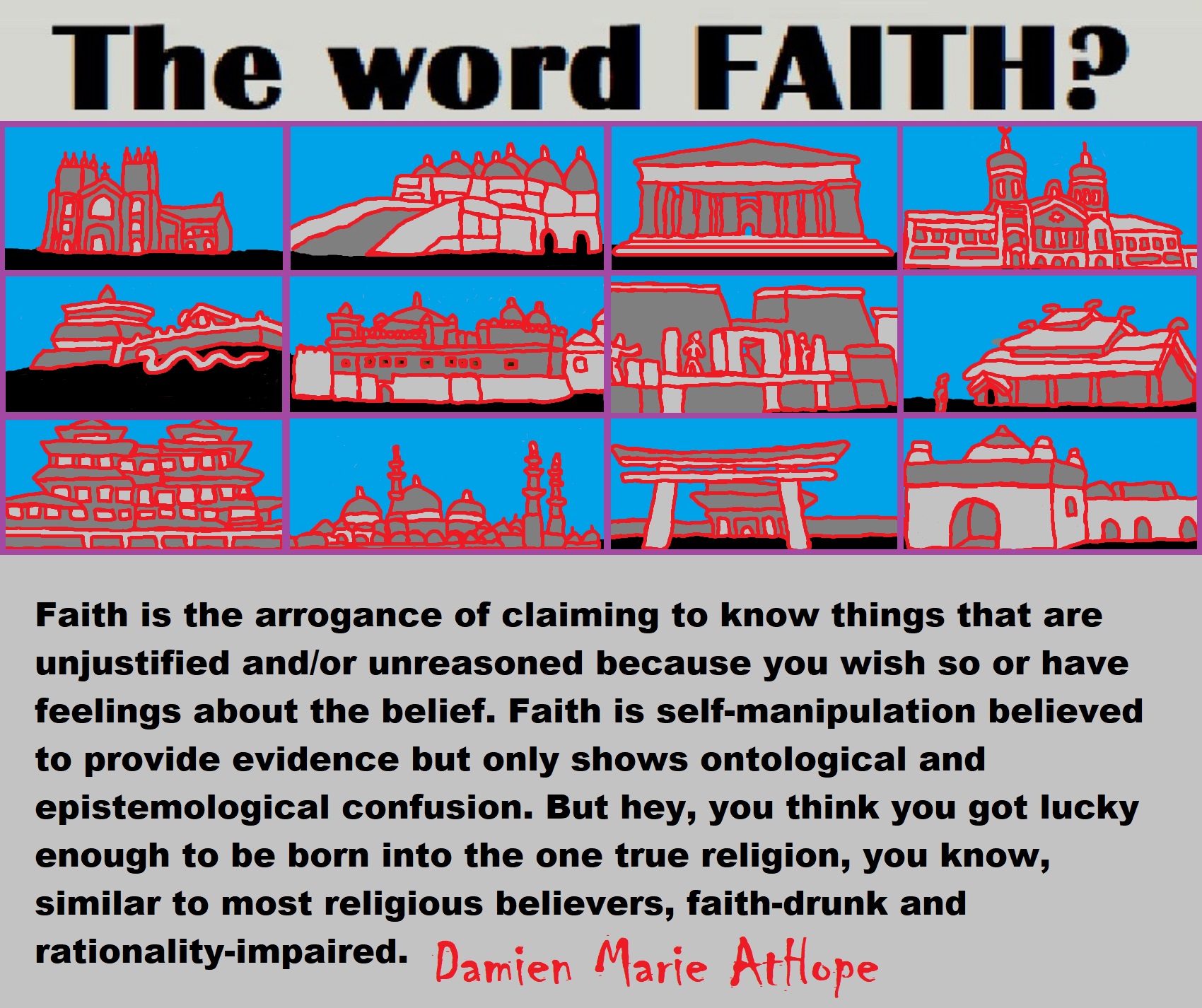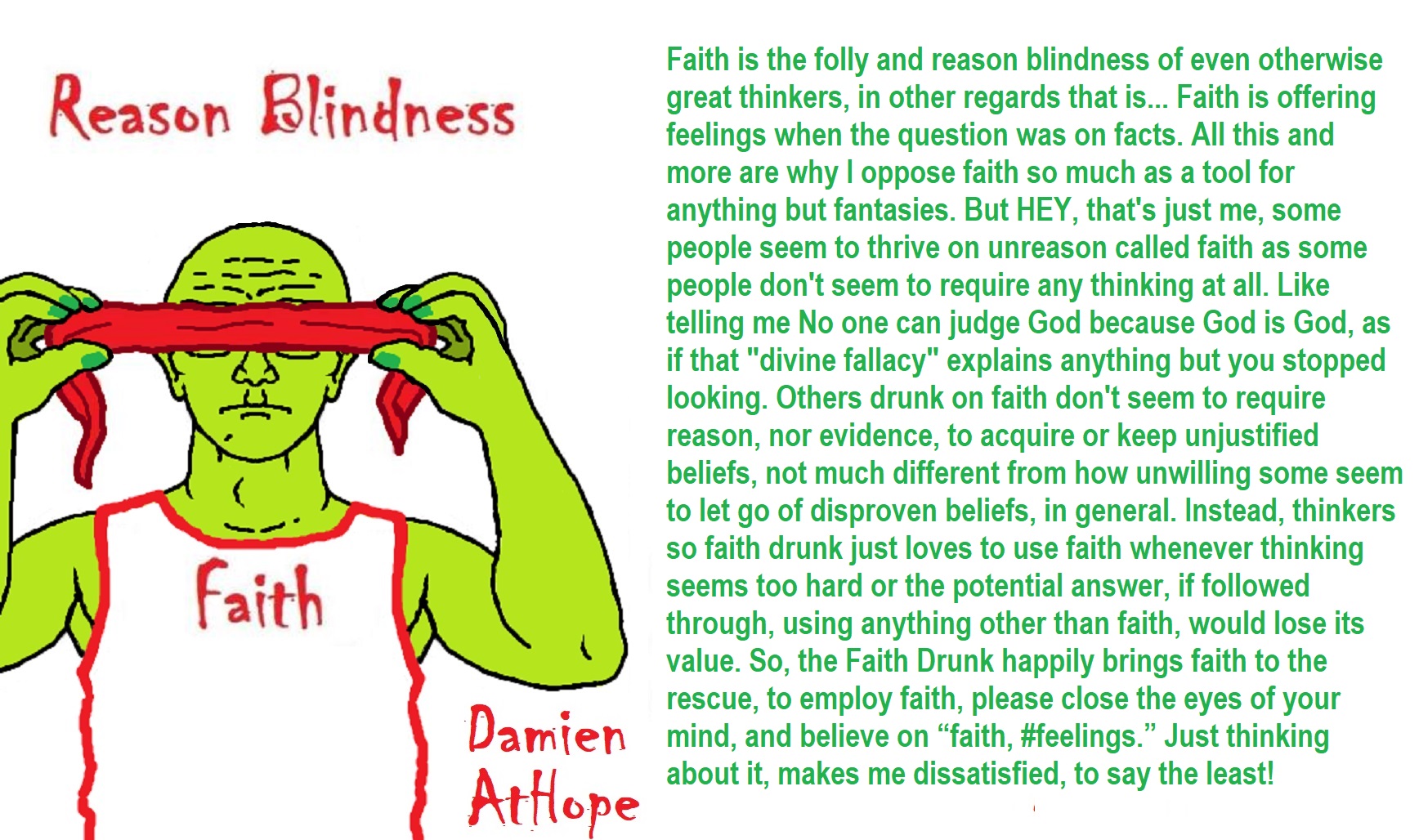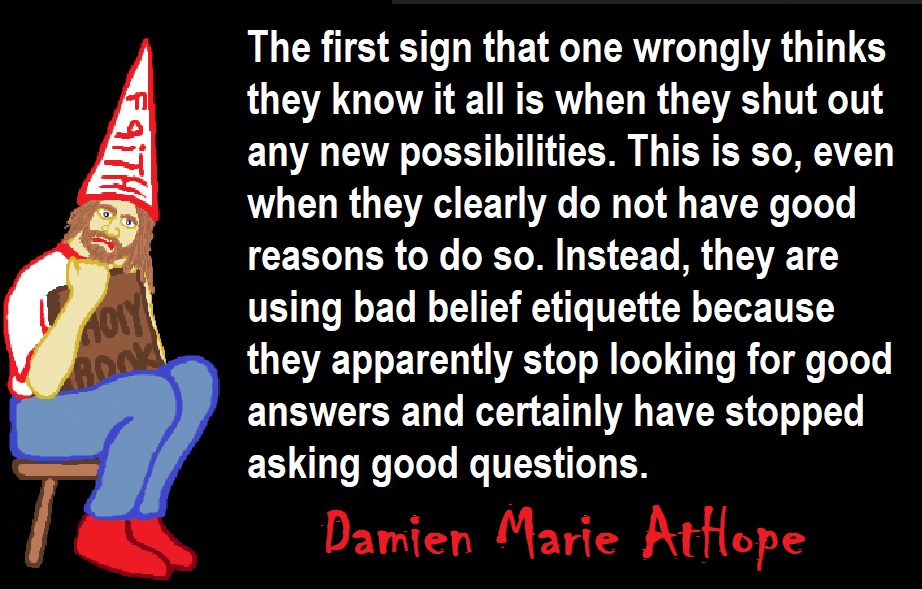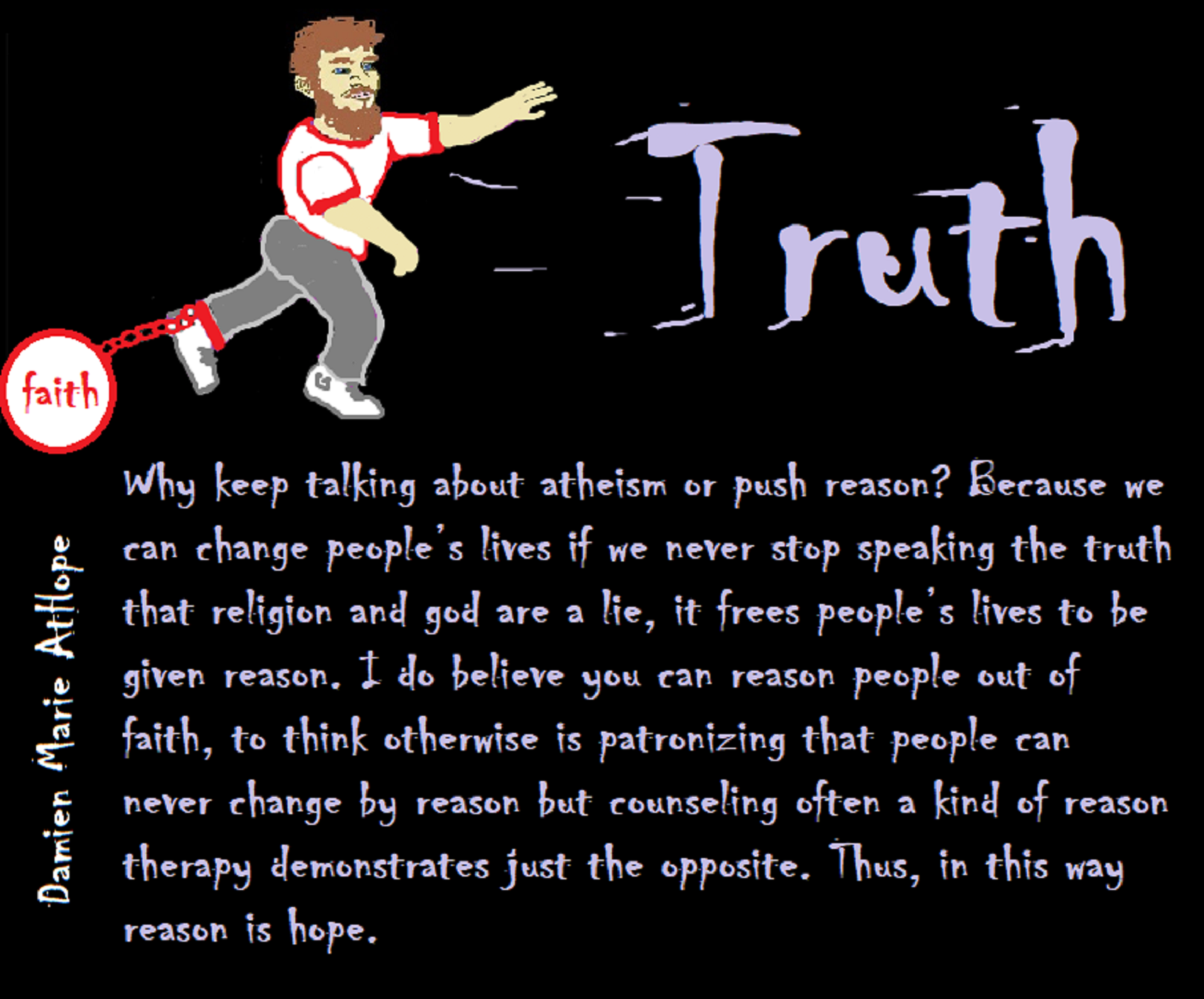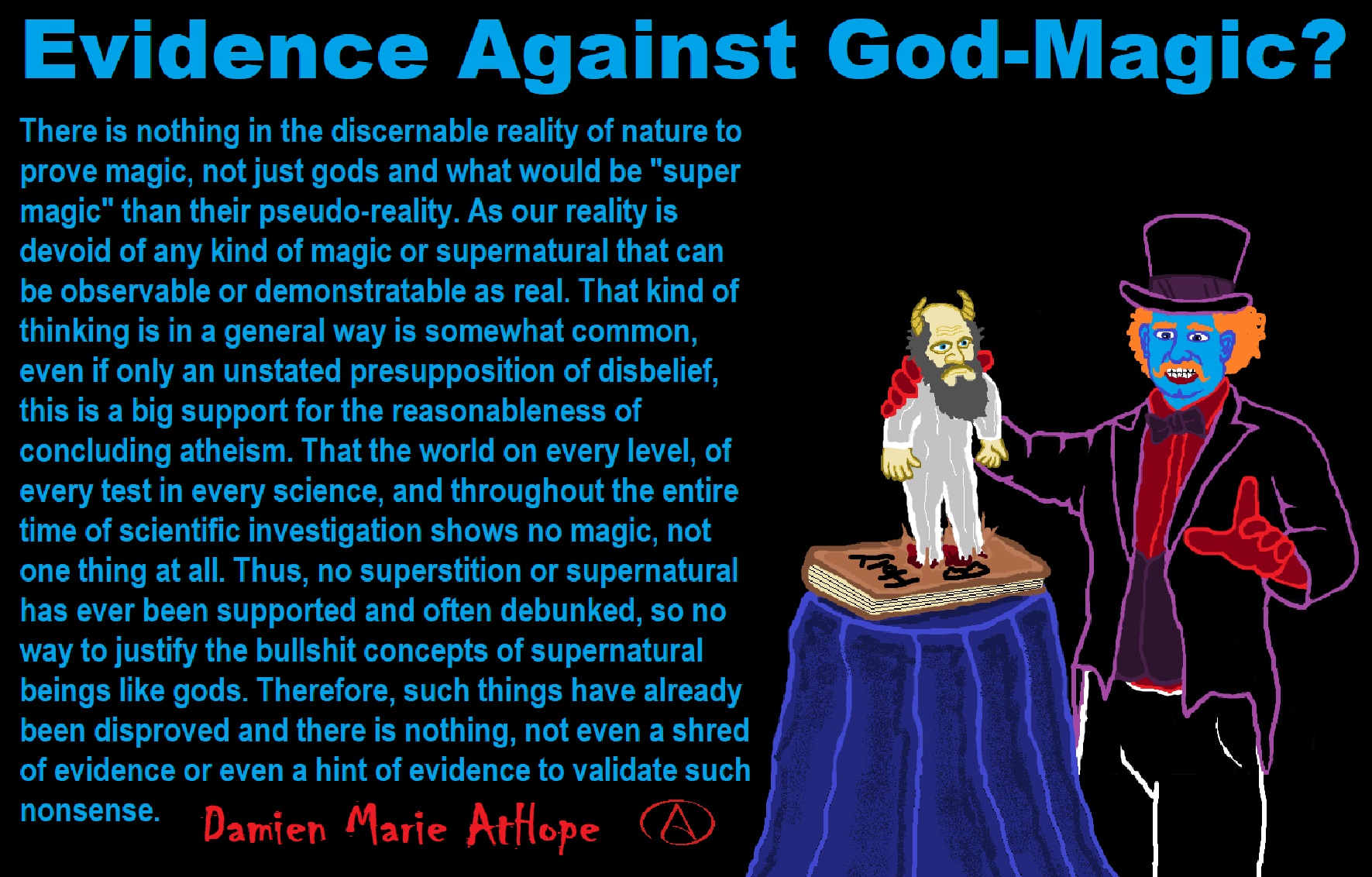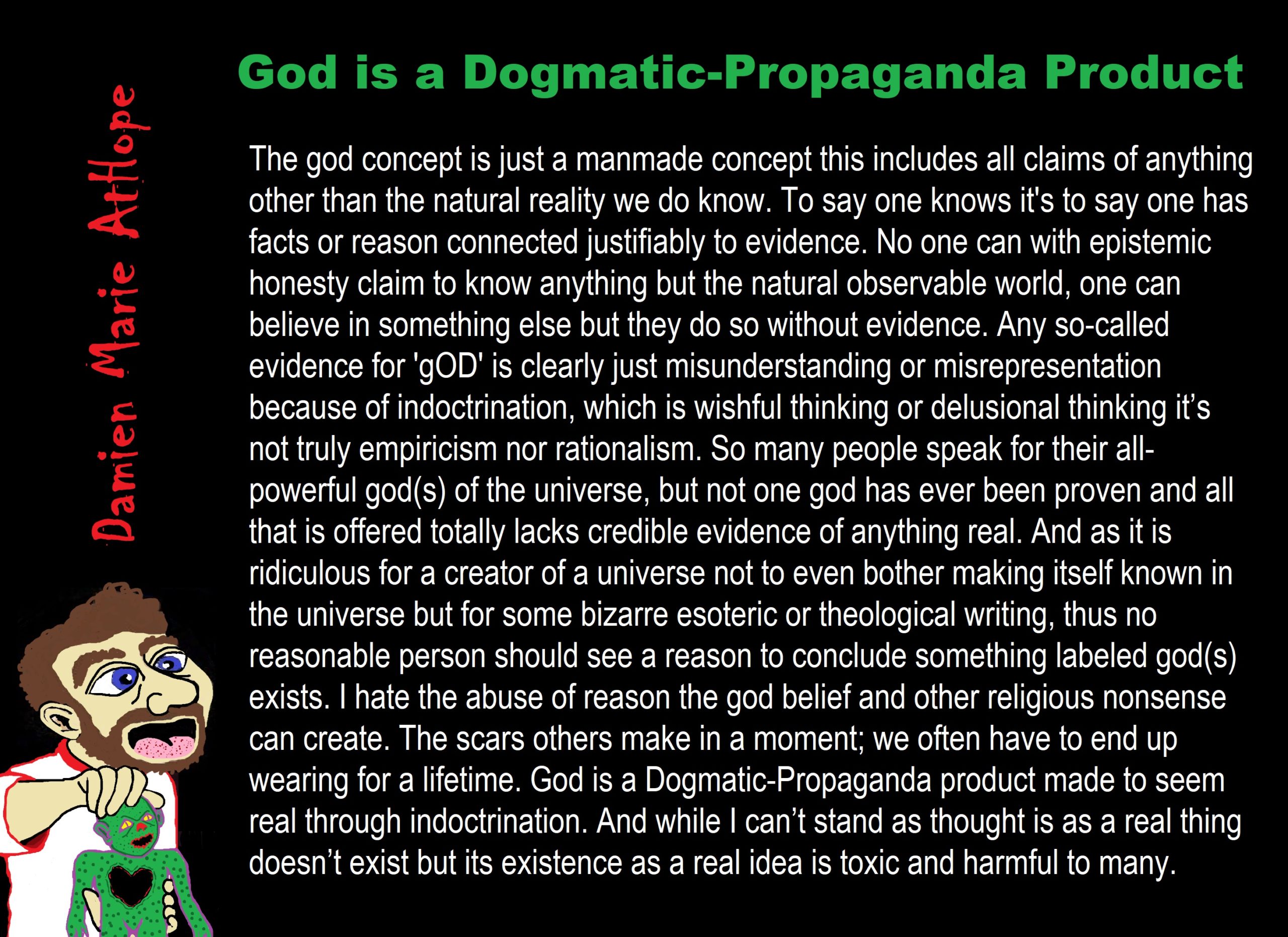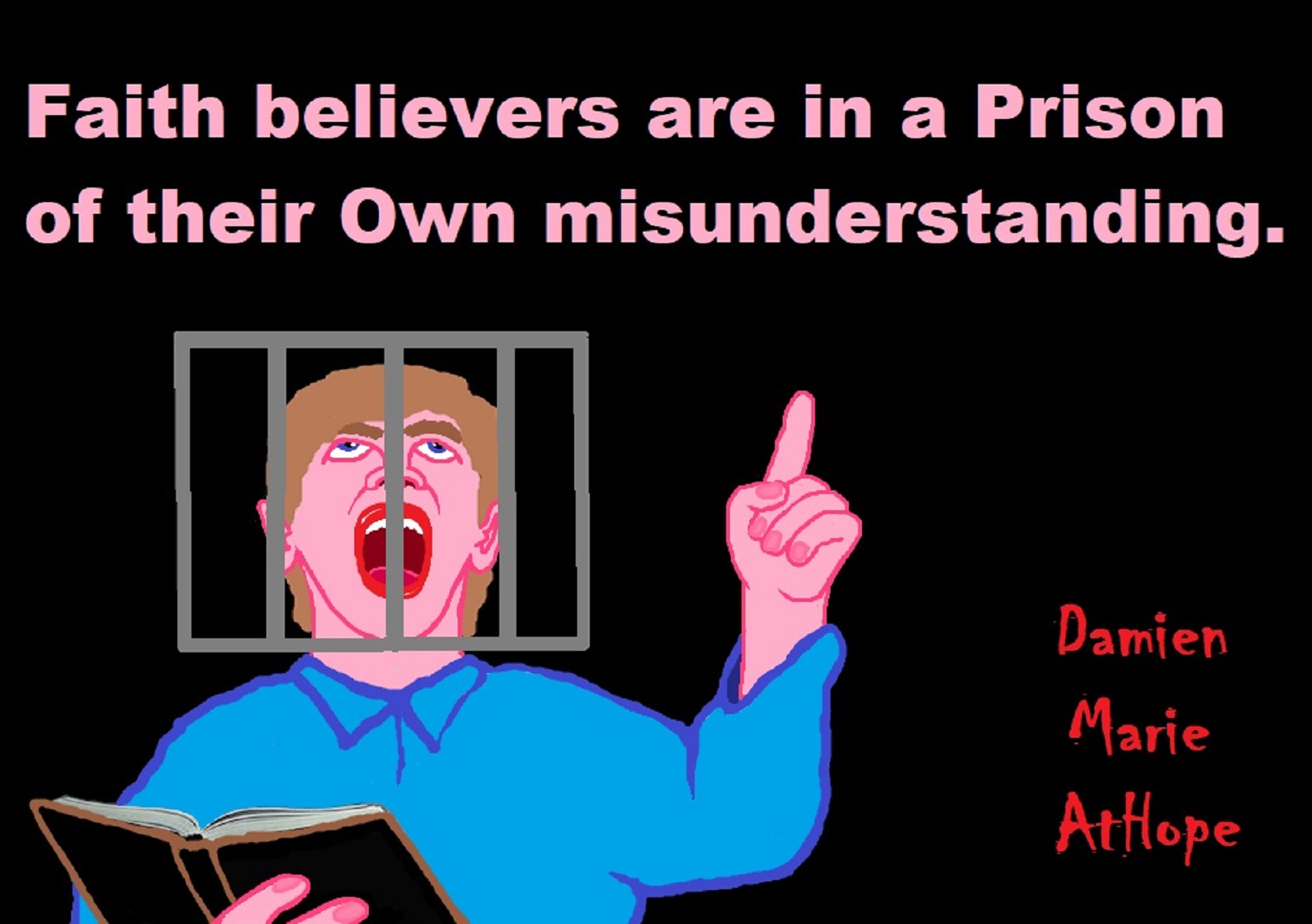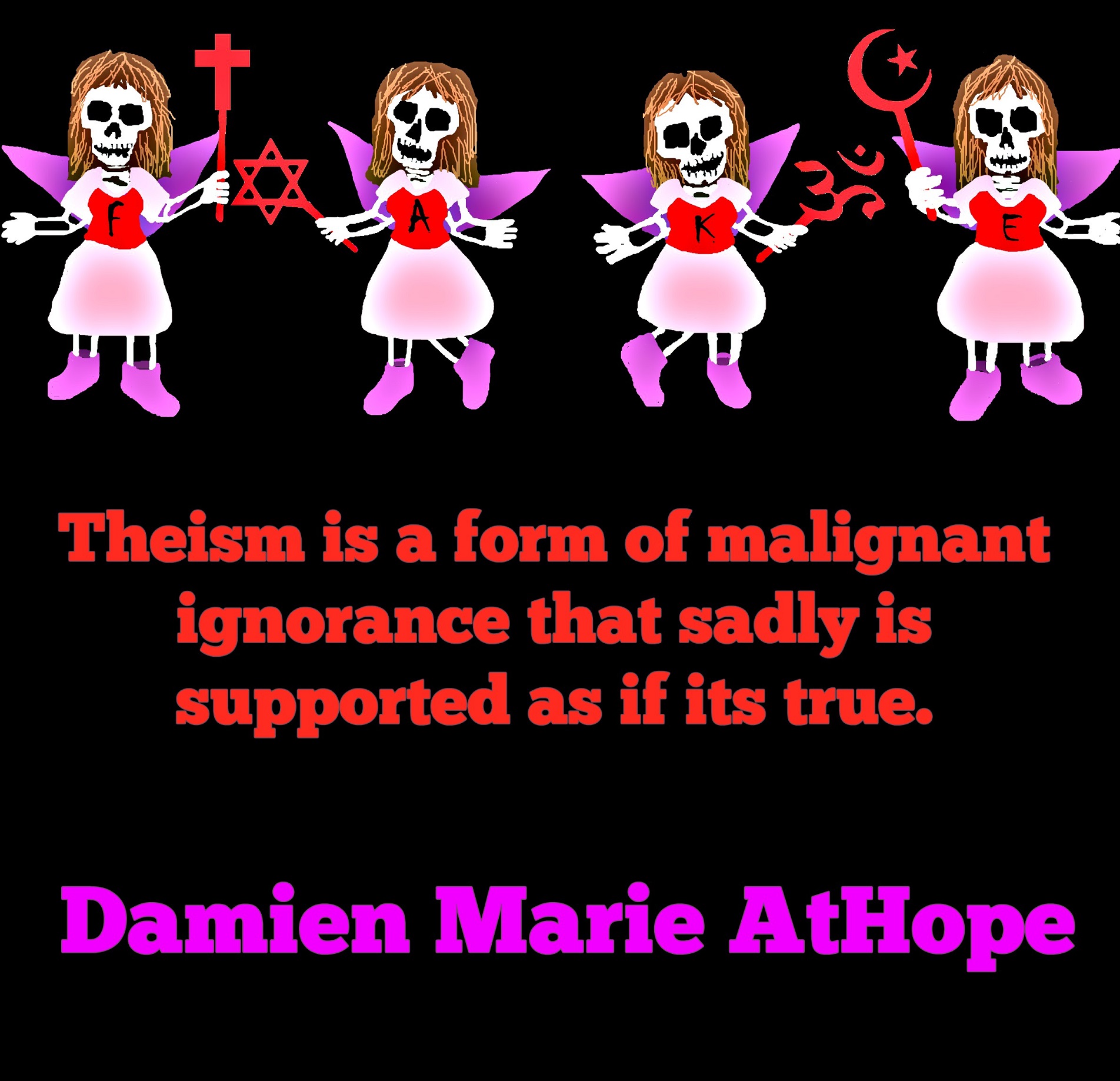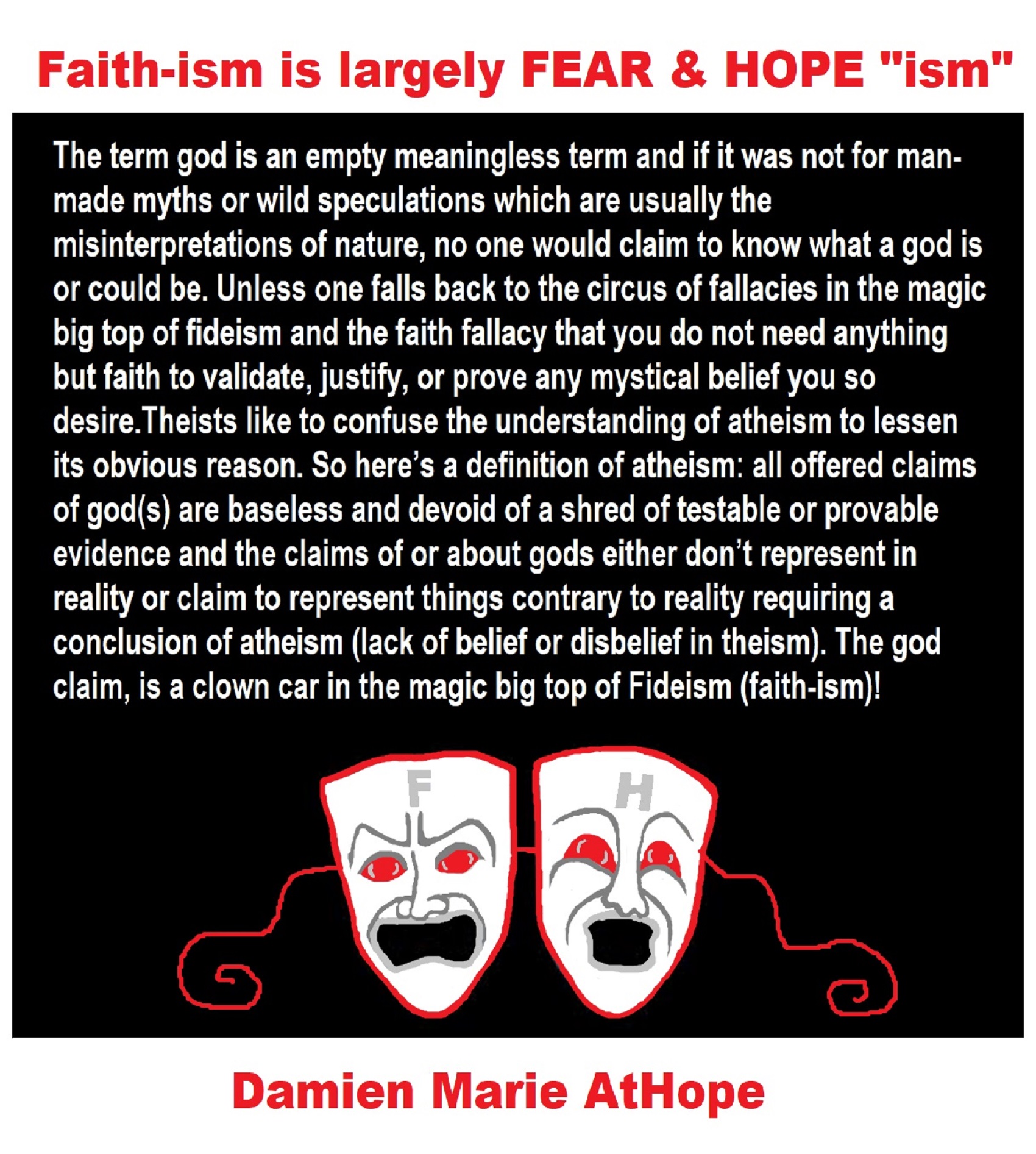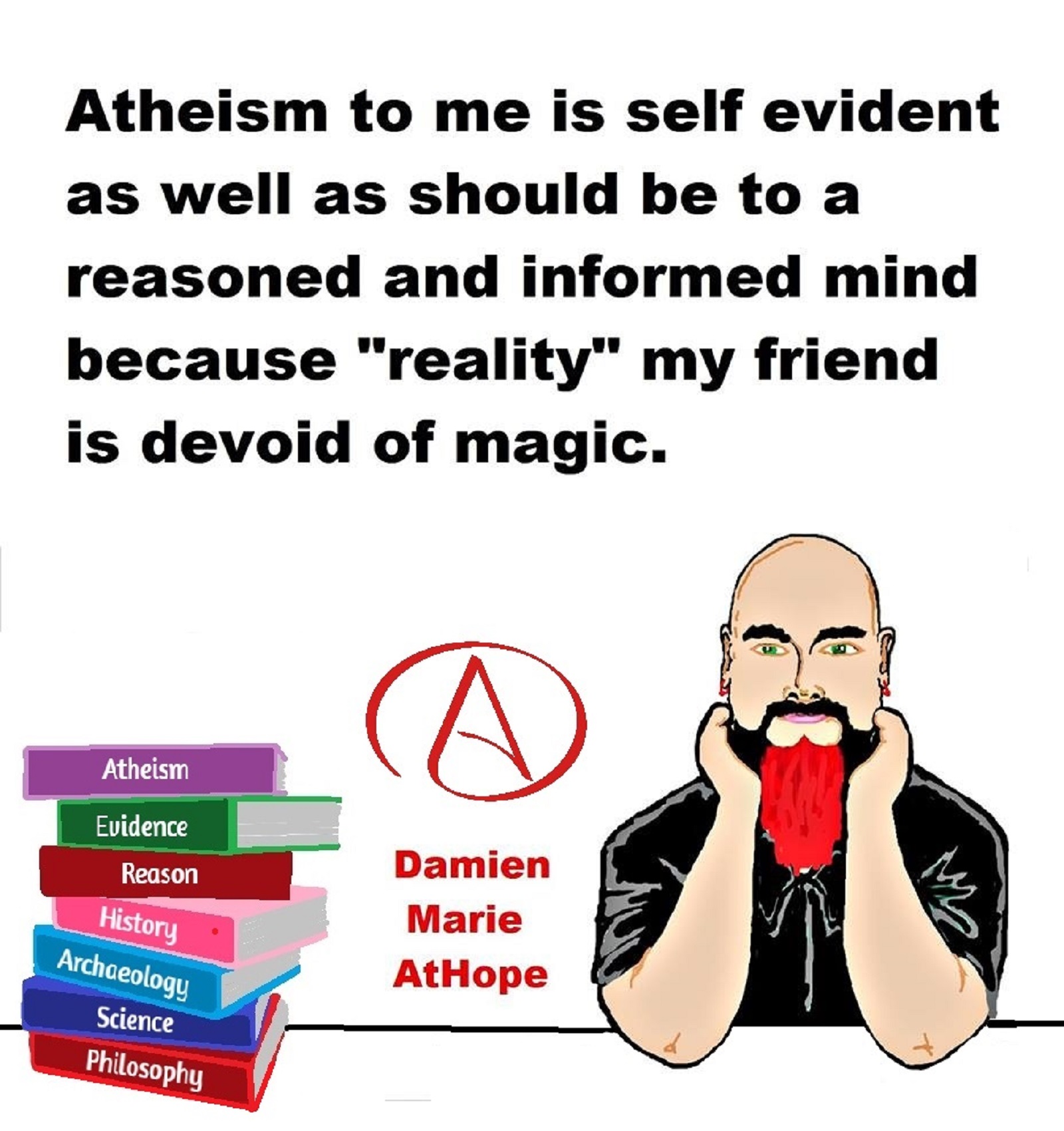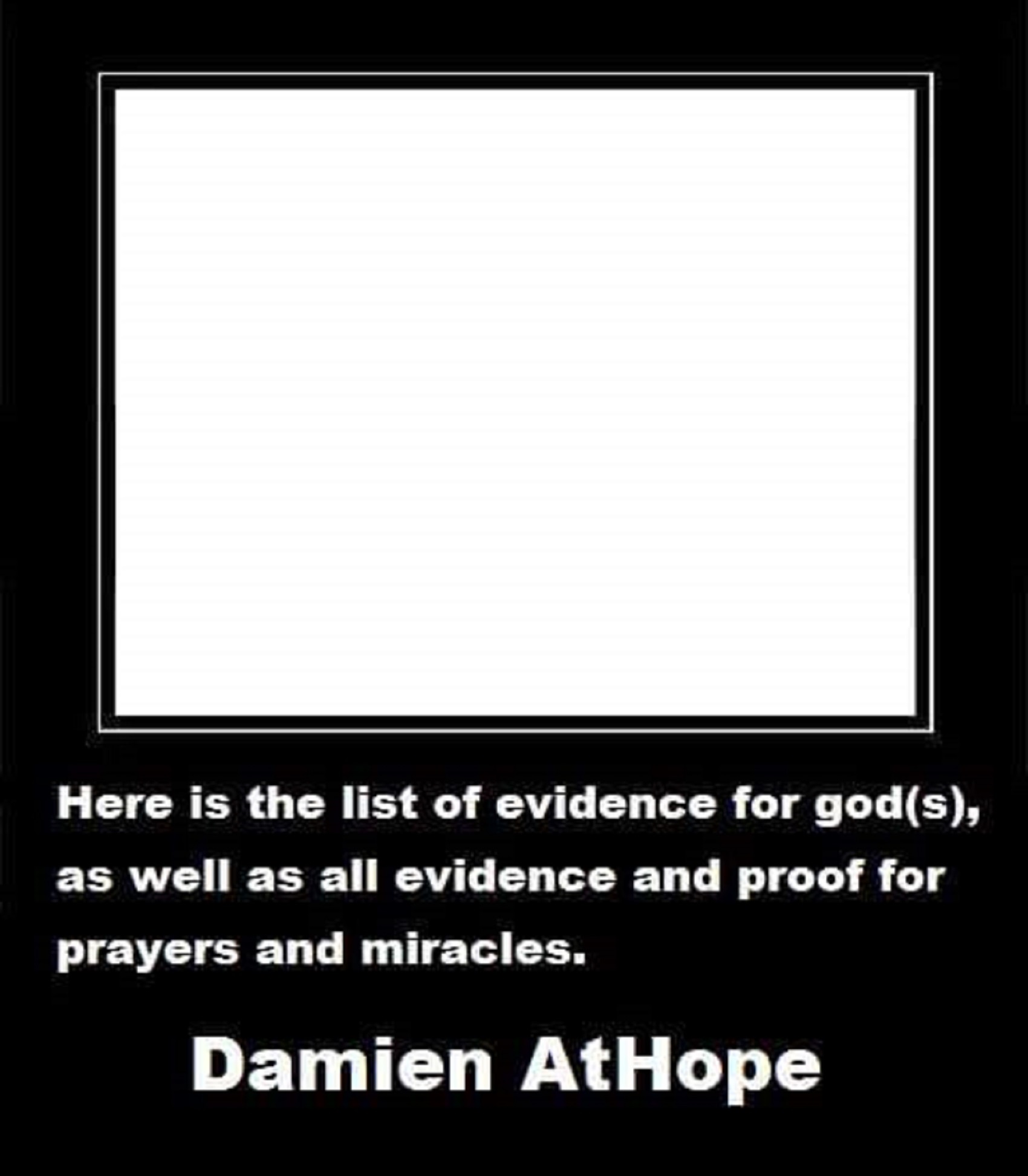
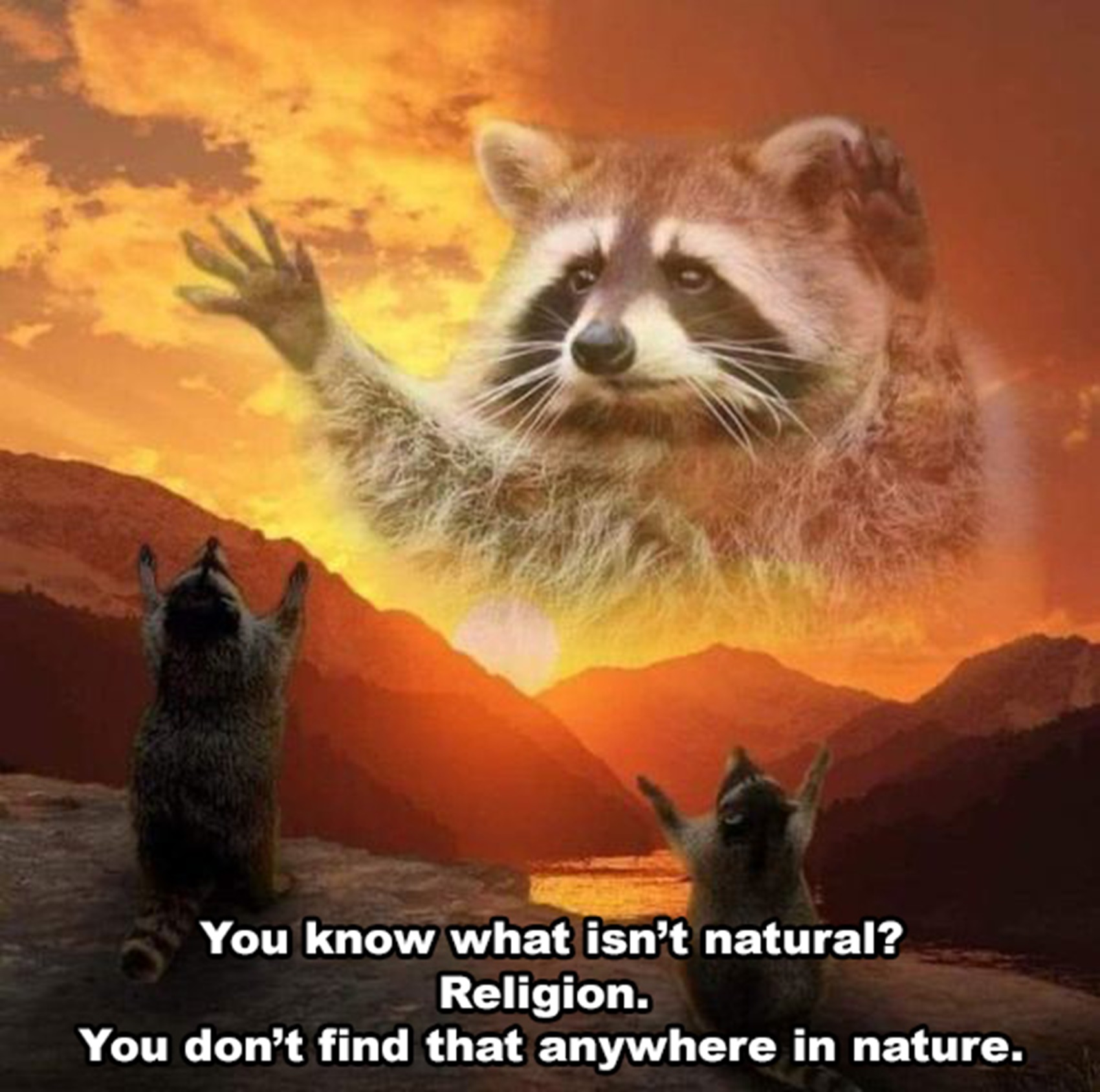
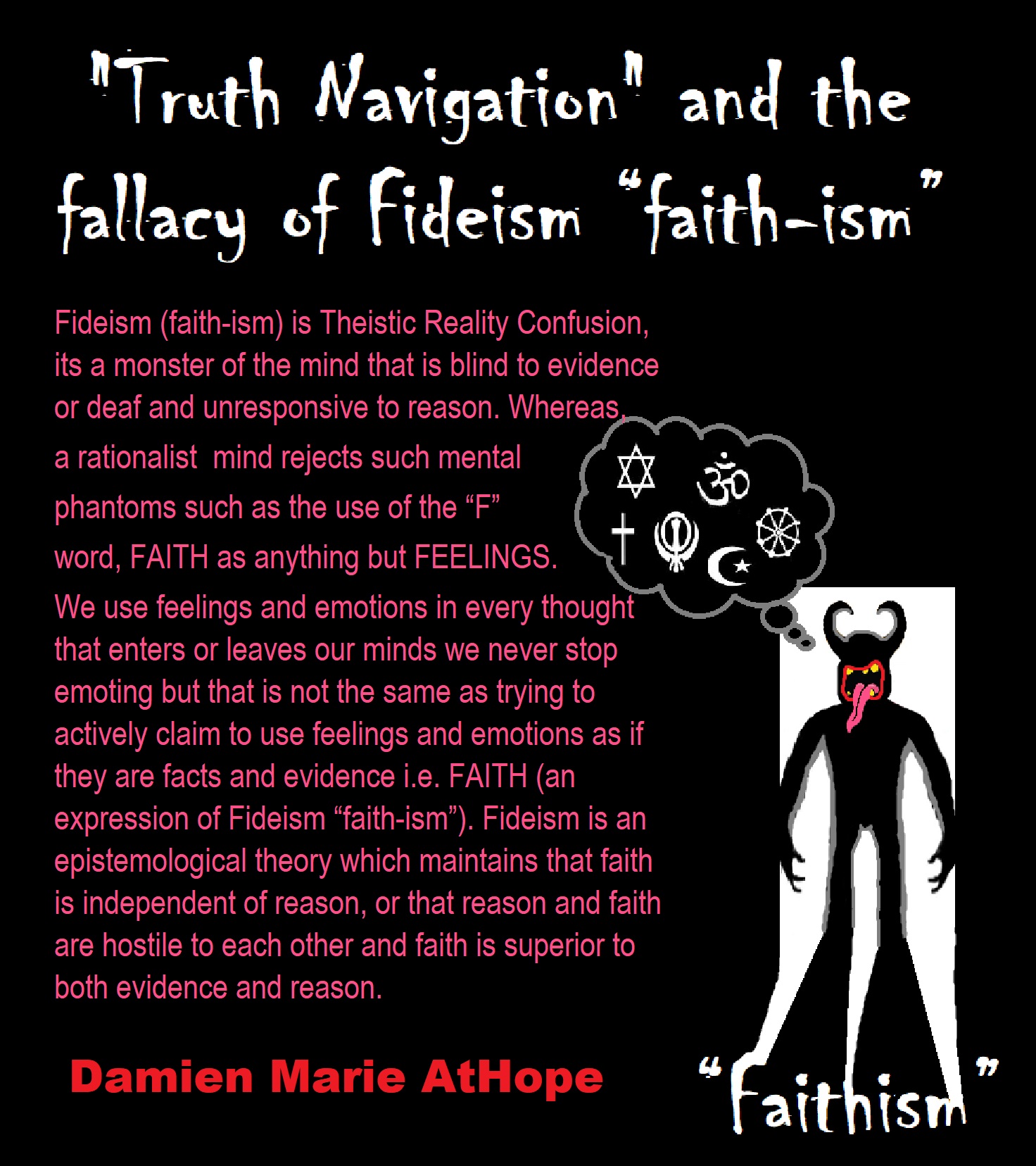
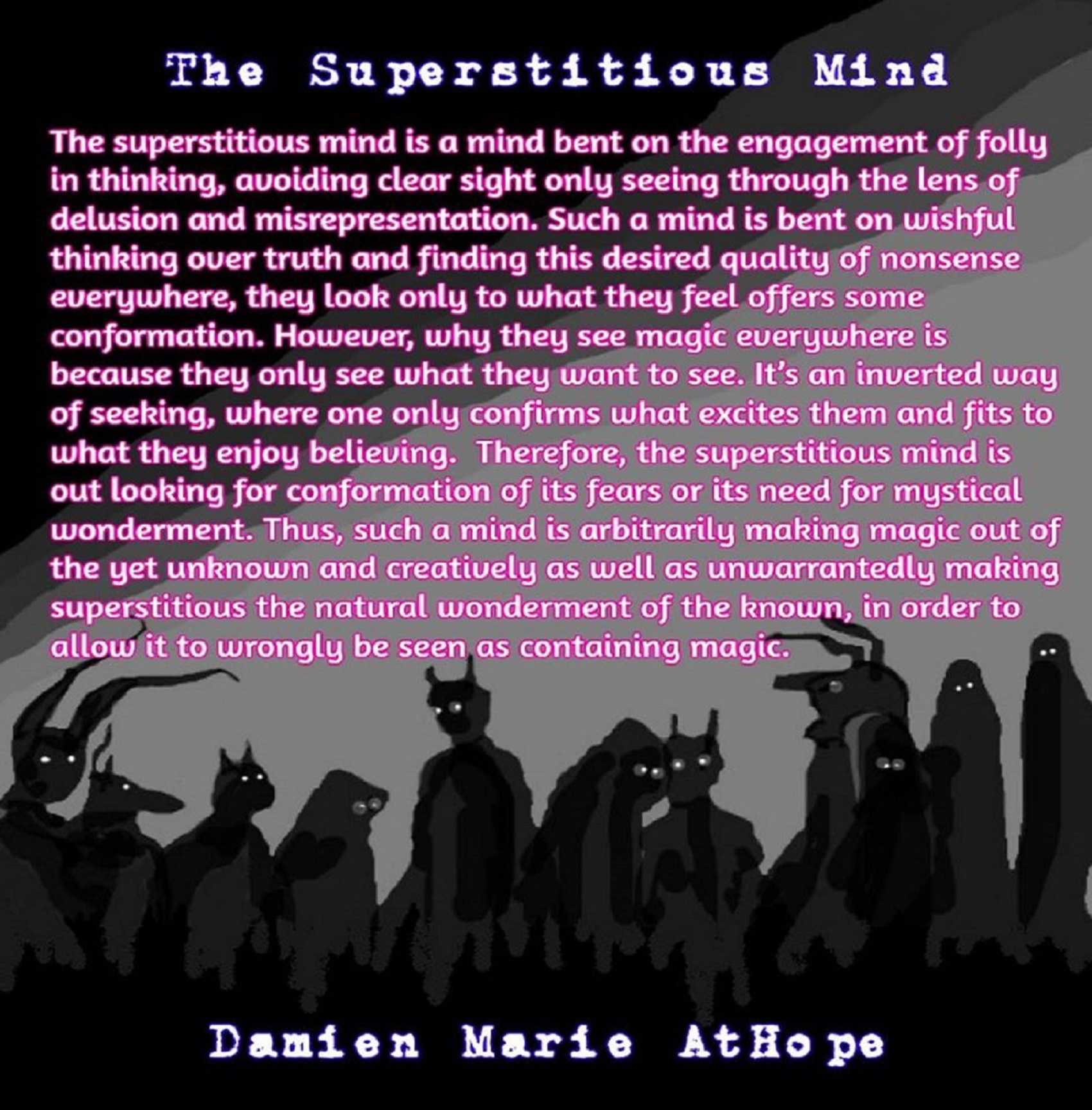
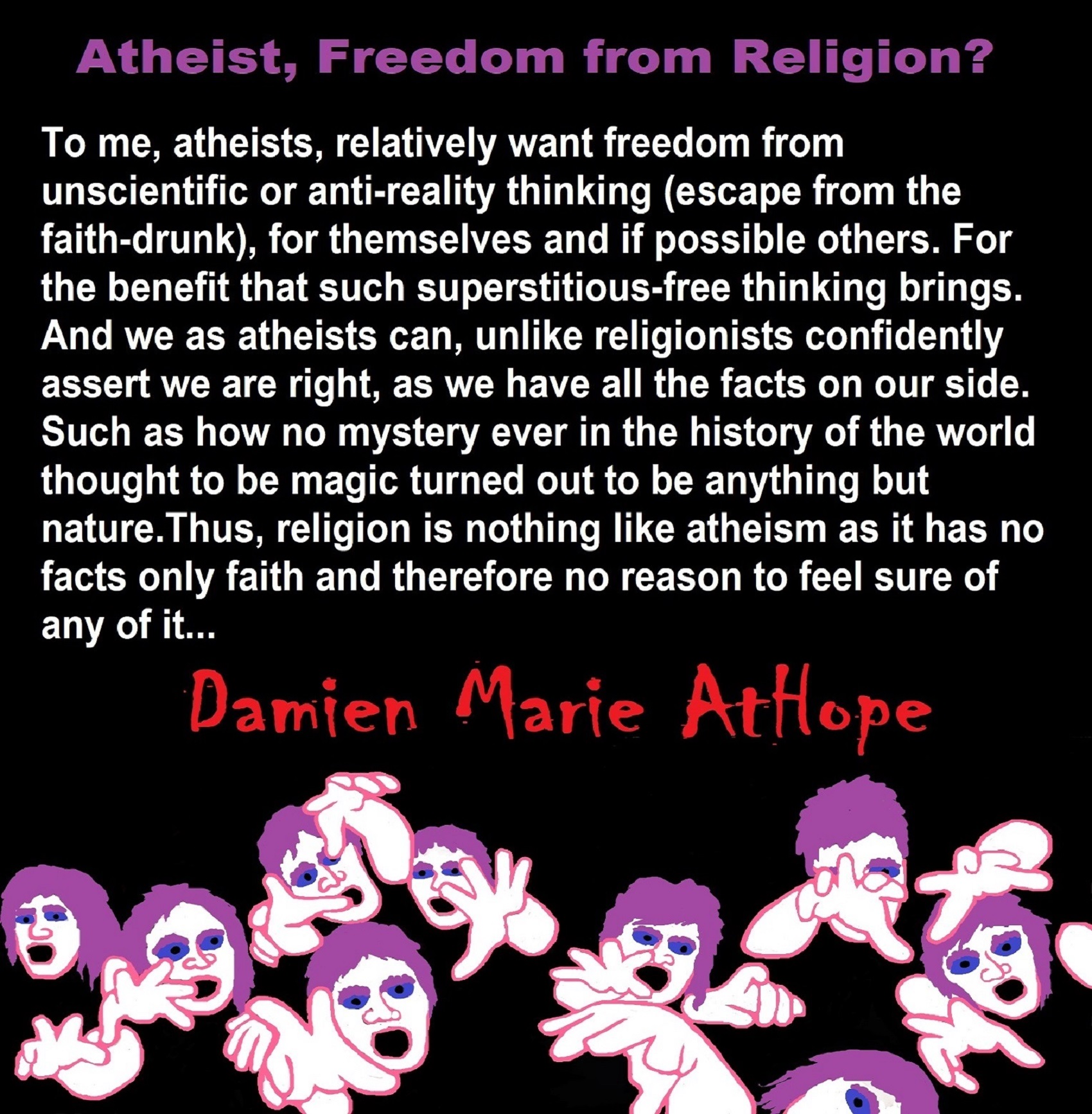
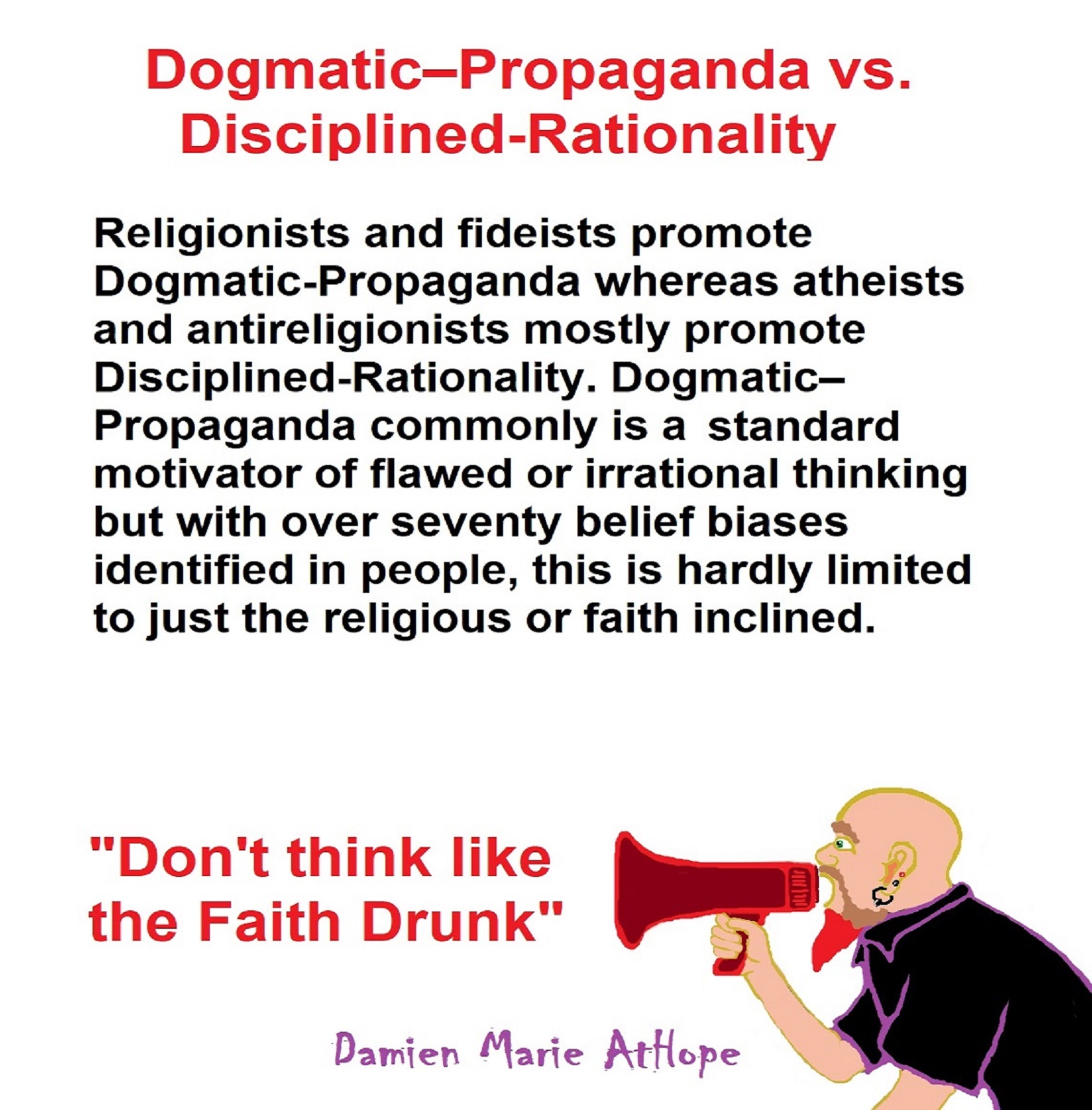
Faith is Not Reason it is Emotion or Delusion
Fideism/Faith-ism (“faith-drunk-thinkers”)
Fideism (faith-ism) is Theistic Reality Confusion
Theists like to confuse the understanding of atheism to lessen its obvious reason. So here’s a definition of atheism: all offered claims of god(s) are baseless and devoid of a shred of testable or provable evidence and the claims of or about gods either don’t represent in reality or claim to represent things contrary to reality requiring a conclusion of atheism (lack of belief or disbelief in theism). The god claim, is a clown car in the magic big top of Fideism (faith-ism)!
A religionist/fideist biases for judgment or reasoning can result from a variety of internal or external cornered motivations such as when beliefs are distorted by faith drunk wishful-thinking wanting a religious myth to be true and not ever accepting that it is not true no matter the challenge with valid and reliable reason and or evidence. What is the first requirement of understanding true knowledge or right reasoning? First, openly engage in yourself to remove faith’s cornered motivation and its excessively dogmatic opinion of oneself as a justification of knowledge. You may think, wait, how does having faith demonstrate the opinion of oneself as a justification of knowledge? Well, when you say I believe (?) due to my faith, that I know is true because I feel it in my heart you are demonstrating the opinion of your emotional self as a justification of knowledge. This emotional self as a justification for knowledge must be removed completely root and branch. For it is impossible for anyone to begin to hear, understand, learn, or adapt what they think that they already know is validated or certain only in their emotional self. And before you try to say it is your rational self, you would be justifying a need for intellectual principles or practices such as affirming you come to knowledge a priori through the use of logic or another rational method or standard. Moreover, by saying, it is your rational self, you would be held to establishing and verifying connective or relative facts, and/or basing or changing belief dependent on existing or new information. But then doing so, you would have just removed any rationale that its faith’s motivation you are using, thus you cannot claim faith and try to attach it to your rational self, instead it is your emotional self, or hopeful, wishful or delusional thinking, so no basis for validating belief, knowledge or truth. https://en.wikipedia.org/wiki/Reason
- Truth Navigation and the fallacy of Fideism “faith-ism”
- Dealing with Presuppositionalism, a school of Christian apologetics (Fascistic Fideism or “faith-ism”)
- Faith is Not Evidence of Reality
- The god claim is a clown car in the magic big top of Fideism!
- Two Dogmatic-Propaganda Fallacies and the fallacy of Fideism “faith-ism”
- Good Belief-Etiquette = Disciplined-Rationality (addressing The Ethics of Belief)
- Addressing a Theistic Philosopher with Fallacious Thinking
Faith is Not Evidence of Reality
Faith is not a substance with which to judge the truth or falsehood of a reality claim, faith is not evidence of reality things, it’s a mental attitude. So bringing up trust, faith (trust to you) when one is asserting a reality thing without evidence is to offer a lie. So faith or trust can be at 100% and yet 100% wrong. Think there are millions of people of different faiths all believing with the same assurity that they and only they are right do to faith. But then you see the trust/faith dilemma you can’t determine who is wrong or right by a proclamation of faith because faith is strong belief without evidence or contrary to evidence it is not a valid test of testing reality or making valid claims about it. Faith is not something one offers if they have evidence but in theism and religions, faith is set in glimmering lights some prised possession believed by some who are desperate to force and keep believing that they use faith this not real world feeling of trust (like religion believers the world over) without valid evidence other then feelings that are not derived from reality but do relly on as well as involves fideism (faith-ism), which is Theistic Reality Confusion that to have faith one has proof of reality and this magic deviod world s fiilled by magic run with magical intervention often including reality was creating by magic anfd to some others magc will one day destroy reality. All nothing but stories supported by Theistic Reality Confusion on the truth value of faith. A rationalist mind rejects the use of the “F” word, FAITH as anything but FEELINGS. We use feelings and emotions in every thought that enters or leaves our minds we never stop emoting but that is not the same as trying to actively claim to use feelings and emotions as if they are facts and evidence i.e. FAITH (an expression of Fideism “faith-ism”).
Understanding Religion Evolution:
Animism, Totemism, Shamanism, Paganism & Progressed organized religion
“Fideism (from the Latin “fides” or “faith”) is the view that religious belief depends on faith or revelation, rather than reason, intellect or natural theology. In this respect, it is in direct opposition to the doctrine of Deism. More accurately it objects to evidentialism, the notion that no belief should be held unless it is supported by evidence. As a result, it holds that theology may include logical contradictions without apology. It may or may not also involve active disparagement of the claims of reason. Fideism teaches that rational or scientific arguments for the existence of God (see the section on Philosophy of Religion) are fallacious and irrelevant, and have nothing to do with the truth of Christian theology because Christian theology teaches that people are saved by faith in the Christian God (i.e. trust in the empirically unprovable) and if the Christian God’s existence can be proven, either empirically or logically, then to that extent faith becomes unnecessary or irrelevant. Therefore, if Christian theology is true, no immediate proof of the Christian God’s existence is possible.” In religious faith beliefs, it is common to hear expressions like “believing with your heart” or “believe in faith alone no facts needed” is an expression of Fideism “faith-ism” and in the end Fideism (faith-ism) adding their chosen version of the “Theistic Reality Confusion.” 1
The god claim is a clown car in the magic big top of Fideism! The god claim is like a clown car rolling in from out of nowhere and it seems like it is only one or possibly a few bad ideas, but no. No, it is a dark festival that masquerades as truth but it is only an evil funhouse of mirrors that distorts reality. The term god is an empty meaningless term and if it was not for man-made myths or wild speculations which are usually the misinterpretations of nature, no one would claim to know what a god is or could be. Unless one falls back to the circus of fallacies in the magic big top of fideism and the faith fallacy that you do not need anything but faith to validate, justify, or prove any mystical belief you so desire.Theists like to confuse the understanding of atheism to lessen its obvious reason. So here’s a definition of atheism: all offered claims of god(s) are baseless and devoid of a shred of testable or provable evidence and the claims of or about gods either don’t represent in reality or claim to represent things contrary to reality requiring a conclusion of atheism (lack of belief or disbelief in theism). The god claim, is a clown car in the magic big top of Fideism (faith-ism)!
The god claim, is like a clown car rolling in from out of nowhere and it seems like it is only one or possibly a few bad ideas, but no. No, it is a dark festival that masquerades as truth but it is only an evil funhouse of mirrors that distorts reality. The term god is an empty meaningless term and if it was not for man-made myths or wild speculations which are usually the misinterpretations of nature, no one would claim to know what a god is or could be. Unless one falls back to the circus of fallacies in the magic big top of fideism and the faith fallacy that you do not need anything but faith to validate, justify, or prove any mystical belief you so desire.Theists like to confuse the understanding of atheism to lessen its obvious reason. So here’s a definition of atheism: all offered claims of god(s) are baseless and devoid of a shred of testable or provable evidence and the claims of or about gods either don’t represent in reality or claim to represent things contrary to reality requiring a conclusion of atheism (lack of belief or disbelief in theism). The god claim, is a clown car in the magic big top of Fideism (faith-ism)!
Atheistic Null Hypothesis: There is no God/Gods
Presuppositional Apologetics is Just Fascist Fideism
Presuppositionalism to me is fascist Christian fideism: Christofascism was caused by the embracing of arrogant authoritarian theology by Christian thinkers. Fascism, in this case, is a form of radical authoritarianism theory about epistemology: the theory of knowledge, beliefs, truth etc. especially with regard to its methods, validity, and scope. The ideological roots of fascism have been traced back to the 1880s, and in particular to the fin de siècle theme of that time notably supporting emotionalism, irrationalism. The theme was based on a revolt against materialism, rationalism, and positivism. Fascism may seem a bit extreme a claim but it can start to sound like fundamental christianity in how it adopted policies such as promoting family values, banning literature on birth control and increased penalties for abortion. Presuppositionalism positions itself as Christian authoritarian fideism (all must accept their apologetic theology). It puts others under philosophic skepticism and places itself under fideism. Fideism is roughly a doctrine that faith is the basis of all knowledge. Presuppositionalism is a school of Christian apologetics that believes the Christian faith is the only basis for rational thought. It presupposes that the Bible is divine revelation and attempts to expose flaws in other worldviews. It claims that apart from presuppositions, one could not make sense of any human experience, and there can be no set of neutral assumptions from which to reason with a non-Christian.
The Doctrine of Fascism states, “The Fascist conception of the State is all-embracing; outside of it no human or spiritual values can exist, much less have value. Thus understood, Fascism is totalitarian, and the Fascist State—a synthesis and a unit inclusive of all values—interprets, develops, and potentiates the whole life of a people.”
Let’s see how well The Doctrine of Presuppositionalism
sounds in the place of The Doctrine of Fascism
“The Presuppositionalist conception of the Christian apologetics is all-embracing; outside of it no human or spiritual values can exist, much less have value. Thus understood, Presuppositionalism is totalitarian, and the Presuppositionalist Christian apologetics — a synthesis and a unit inclusive of all values—interprets, develops, and potentiates the whole life of a people.” Critics of presuppositional apologetics claim that it is logically invalid because it begs the question of the truth of Christianity and the non-truth of other worldviews. Fideism is an epistemological theory which maintains that faith is independent of reason, or that reason and faith are hostile to each other and faith is superior at arriving at particular truths (see natural theology). The word fideism comes from fides, the Latin word for faith, and literally means “faith-ism.” Fideism has received criticism from theologians who argue that fideism is not a proper way to worship God. According to this position, if one does not attempt to understand what one believes, one is not really believing. “Blind faith” is not true faith. Fideism can lead to relativism. The existence of other religions puts a fundamental question to fideists—if faith is the only way to know the truth of God, how are we to know which God to have faith in? Fideism alone is not considered an adequate guide to distinguish true or morally valuable revelations from false ones. An apparent consequence of fideism is that all religious thinking becomes equal. The major monotheistic religions become on par with obscure fringe religions, as neither can be advocated or disputed. As articulated by Friedrich Nietzsche, “A casual stroll through the lunatic asylum shows that faith does not prove anything”.
Circularity of Presuppositional Apologetics
The goal of presuppositional apologetics is to argue that the assumptions and actions of non-Christians require them to believe certain things about God, man and the world which they claim they do not believe. This type of argument is technically called a reductio ad absurdum in that it attempts to reduce the opposition to holding an absurd, i.e. contradictory position; in this case, both believing in facts of Christian revelation (in practice) and denying them (in word). So in essence, presuppositional apologetics attempts to claim all facts for the Christian worldview as the only framework in which they are intelligible. The reasoning in such arguments is fallacious because simply presupposing the conclusion is true in the premises does not constitute evidence for that conclusion. Clearly, assuming a claim is true does not constitute evidence for that claim. (“X is true. The evidence for this claim is that X is true.”) They should be able to do this in a way that isn’t also equally valid for the truth claims of any other religion. If this can not be done, I can only assume that in their realm of thinking all religious scripture, from any religion is equally valid and equally true removing any special claim for christianity or they are using special pleading. Presuppositionalism is a form of fideism that is based on philosophical skepticism. Presuppositionalists generally believe that theological assumptions or presuppositions are loaded into the epistemological foundation of every ‘worldview’ [i.e. philosophy]. Since they also believe that every worldview built on false presuppositions is a false worldview and that Christianity is the only true religion, therefore, they conclude that only the worldview (i.e. philosophy) built on Christian presuppositions is true or reliable. The error is located in the very first premise, i.e. in the notion that theological assumptions or presuppositions lie behind every claim or position, theory, or philosophy. Why do they think that? Is Fascist Christian Fideism and the trinity of logical fallacies: begging the question, special pleading, and circular reasoning. If you point out the circularity in the thinking of Presuppositionalism they may say well under your worldview all positions are circular and under our worldview, we have the truth of Christian god so we are not bothered by such a claim of circularity in the thinking as god created all thinking.
“We can say that at their core all positions are circular,
however, this is not proof of the equalizations of all circular positions.”
I am stating this to address religion circular positions such as “are not equal to the problem of deduction (reason) and the problem of induction (evidence) underlining all problems in philosophy, especially epistemology. All deductive systems, logic in particular and philosophy in general, rely on the truth of its axioms or premises. So the problem of deduction is really that it is impossible to know the truth of axioms without assuming some a priori “fountain of truth” on which to rely. While rationalism claims access to the truth of innate ideas or revelation, skepticism rightfully points out that such fountain of truth is unattainable. The problem of induction is the philosophical question of whether inductive reasoning leads to knowledge, since it focuses on the alleged lack of justification for either: Generalizing or Presupposing.
1. Generalizing about the properties of a class of objects based on some number of observations of particular instances of that class (for example, the inference that “all swans we have seen are white, and, therefore, all swans are white”, before the discovery of black swans) or
2. Presupposing that a sequence of events in the future will occur as it always has in the past (for example, that the laws of physics will hold as they have always been observed to hold). Hume called this the principle of uniformity of nature.
Presuppositional apologetic fascist Christian fideism contrasts every non-Christian epistemology with Christian epistemology by saying that Christian epistemology believes in an ultimate rationalism while all other systems of epistemology believe in an ultimate irrationalism by the default of not being or starting with a Christian epistemology.
Certainly one of the most frequent characterizations of the presuppositional apologetic of Cornelius Van Til is that it is “fideistic.” Lewis, for example, is concerned that Van Til, despite serving forty-five years as a professor of apologetics, has constructed a system of theology, not a system of apologetics. In Lewis’s estimation, Van Til has not supplied a means of disputing with unbelievers concerning the truthfulness of Christianity. “In the name of defending the faith he has left the faith defenceless. Montgomery likewise warns against Van Til’s tendency to treat the unbeliever as a believer, working out systematic theology and its implications rather than verifying Christianity by “focusing upon their needs” and using as a “starting point” the “common rationality. Montgomery fears that Van Til has given the unbeliever “the impression that our gospel is as aprioristically, fideistically irrational as the presuppositional claims of its competitors.’” Pinnock also raises the same issue. While saluting the contribution that Van Til has made to “a virile twentieth century apologetic,” Pinnock contends that “a curious epistemology derived from a modern Calvinistic school of philosophy in Holland has led him to align his orthodox theology with a form of irrational fideism.”s Geisler, in his Christian Apologetics, includes Van Til in his chapter on fideism along with Pascal, Kierkegaard, and Barth. Geisler states that Van Til “speaks from a strong Reformed Biblical perspective theologically and yet in an absolute revelational presuppositionalism apologetically. “Methodological fideism” is Geisler’s term for this position.? Geisler notes five “central contentions” that are characteristic of fideism (including, apparently, that of Van Til): (1) faith alone is the way to God; (2) truth is not found in the purely rational or objective realm, if it is there at all; (3) evidence and reason do not point definitively in the direction of God; (4) the tests of truth are existential, not rational; and (5) not only God’s revelation but his grace is the source of all truth. Hanna has contended that “presuppositionalism” (as he terms it) is able, in response to inquiries as to the warrant for belief, to answer only “in terms of obscurantistic fideism. Hanna regularly uses presuppositionalism and fideism interchangeably in his book. More recently, Sproul, Gerstner, and Lindsley have argued that protestations to the contrary notwithstanding-Van Til’s apologetic has no place (or at least not warranted place) for reasoning with or giving evidence to unbelievers. In their judgment, fideism is the inevitable result of Van Til’s presuppositionalism. 1, 2, 3, 4, 5
God, the Presuppositional Error
First, truly what is a god and how can you claim to know about it? Guessing is not evidence, neither is wild, unfounded assertions that are written in reality devoid documents such as holy books. Atheists do not have to prove that gods do not exist, as gods have never been proven to exist. Nor is there any good reason to think they could exist.
Archaeological, Scientific, & Philosophic evidence shows the god myth is man-made nonsense.
Vague Theism or god Somethingism: just say NO
“Damien sir, i am in a dilemma, can you help me???? i don’t believe in any particular god, but i believe in the god, i believe everything exist in this whole universe is part of god, am i an atheist????? each & everything made out of some mass & energy……” – Challenger
My response, you are a pantheist, a doctrine that identifies God with the universe, or regards the universe as a manifestation of god(s).
“Damien, as the conservation theory explain that the total mass & energy is constant, & we are made from these mass & energy, why we are not part of the god???” – Challenger
My response, to me to call a thing god is to say it’s a superpower with a mind or intelligent expressed will. I don’t see anything like that in nature.
“Damien, sorry sir, but to me it’s the entire mass & energy of the cosmos, which runs on some simple some physical rule……” – Challenger
My response, then it’s not a god.
“Damien, why sir????” – Challenger
My response, it’s like me calling love the expressed emotion god because all humans and most animals have this. But this is a logical fallacy of categorical error. A category mistake (or category error) is a logical fallacy that occurs when a speaker (knowingly or not) confuses the properties of the whole with the properties of a part. It contains the fallacy of composition (assuming the whole has the properties of the part) and the fallacy of division (assuming the part has the properties of the whole).
“Damien, i believe everything i can touch, see or feel, are part of god, even my toilet also is part of my god…… that’s why i never go to the temple (by the certificate i’m a hindu), or any kind of religious place…. my work is my religion…. & god (as I believe) never failed me….. i always get result as i worked…” – Challenger
My response, everything in the real world can fail and does so often. You sound like you have made your claim of god above failure. However, if there is no standard to fail by then there is also no standard to success. So, either your titled god does nothing or to you it does everything but then your label of god actually ends up meaning nothing….
Why are all gods unjustified?
Okay, so, anything you claim needs justification but no one has evidence of god claim attributes they are all unjustified. All god talk as if it is real acts as if one can claim magic is real by thinking it is so or by accepting someone’s claim of knowing the unjustifiably that they understand an unknowable, such as claims of gods being anything as no one has evidence to start such fact devoid things as all knowing (there is no evidence of an all-knowing anything). Or an all-powerful (there is no evidence of an all-powerful anything). Or the most ridiculous an all-loving (there is no evidence of an all-loving anything). But like all god claims, they are not just evidence lacking, the one claiming them has no justified reason to assume that they can even claim them as proof (it’s all the empty air of faith). Therefore, as the limit of all people, is to only be able to justify something from and that which corresponds to the real-world to be real and the last time I checked there is no magic of any kind in our real-world experiences. So, beyond the undefendable magical thinking not corresponding to the real-world how much more ridicules are some claimed supreme magical claimed being thus even more undefendable to the corresponding real-world, which the claimed god(s) thinking is a further and thus more extremely unjustified claim(s).
What is this god you seem to think you have any justification to claim?
Saying that some features of reality are not fully known is not proof of god myth claims. II’s not like every time we lack knowledge, we can just claim magic and if we do we are not being intellectually honest to the appraisal of reality that is devoted of anything magic. So what is a god, when no one has some special knowledge to say what it could be and shotgunning unjustifiable hypothetical claims that one thing or another that you like must gold some magic which there is no evidence of magic anything? Thus, to assert magic anythings by its nature an unjustified ascertain to even present. God claims are presupposition errors in how they are most often assumed to be a hypothetical explanation to the unknown or fear of something it’s not from facts in reality.
“Reason is my only master, whereas faith offered as reality is most defiantly not my friend.”
What do you mean by god Evidence?
As ethical atheists, we are not ok with pretend. So we are not silent because sacred falsehoods must end, even if the truth may offend. What is Faith but an unjustified belief that is willfully supported in violation to The Ethics of Belief, as faith holds a burden of proof until justified so faith claiming to “know” anything by this means is intellectually dishonest, uninformed on good belief etiquette or confused thinking offered as pseudo-knowledge? Theists like to confuse the understanding of atheism to lessen its obvious reason. So, here’s a definition of atheism: all offered claims of god(s) are baseless and devoid of a shred of testable or provable evidence and the claims of or about gods either don’t represent in reality or claim to represent things contrary to reality as well as contradicts each other requiring a conclusion of atheism (lack of belief or disbelief in theism). The god claim, is like a clown car in the magic big top of Fideism “faith-ism”, and Presuppositional Apologetics is Just Fascist Fideism all of which demonstrates the Theistic Reality Confusion. Sure there are intelligent theists and that does not in any way make theism even reasonable as one can be brilliant and hold logical fallacies as their truth and that like any thinking errors like theism can happen to an otherwise sound thinker. I strive to be a sound thinker thus I am an axiological atheist and some may wonder what is that?
Axiological Atheism (“philosophic” value theory/value science “formal axiology” social science” atheism) is Classed Under Anthropocentric (human-centered) arguments: “Axiological atheism favors humanity as the absolute source of ethics and values, and permits individuals to resolve moral problems without resorting to God. Marx, Nietzsche, Sartre and Freud all used this argument to some extent to convey messages of liberation, full-development, and unfettered happiness.” – Link
“Damien, your Axiological Atheism sounds Highly interesting! One point, though. Have you considered that all of this philosophizing will mean nothing when you are dead? Human ideology on the concepts of mortality have been around since the dawn of mankind and will continue until every last human being is dead.” – Challenger
My response, philosophizing like all science will mean nothing after “we” are dead but I care about more than me I want universal betterment and true humanity flourishing so philosophizing like all science matter in this goal does it not? I am Not just Atheist, I am a proud Anti-religionist as well as Anti-theist. Those atheists who still like esoteric religions or religious philosophies, that is not me at all I oppose it all. Yes, you read that right, I reject it all, every religion or even pseudo-religion like. Just so I am not misunderstood, this includes buddhism, satanism, taoism, paganism, wicca, spiritualism, etc. Don’t get me wrong I am against ALL religion. What makes some believed Truth is actually True? To me, truth, in general, is a value judgment we place on what we think or believe is evidence or reason. Therefore, the rational imperative on us as intellectually honest thinkers to demonstrate that the proposed evidence or reasoned assumption is actually of a high epistemic standard with as much valid and reliable reason and evidence as possible from a credible source as possible which then makes some believed “Truth” actually worthy to be seen as Epistemologically True thus a “justified true belief”. Broadly, epistemic means “relating to knowledge (itself) or to the degree of its validation” and epistemological means ” critical study of knowledge validity, methods, as well as limits to knowledge and the study or theory of various aspects of or involved in knowledge”.
I have justification to claim to know what I claim to know, that is proof, not faith which is unproof “Unjustified Belief.” Do you have such Justification? By claiming to know something by faith is to act in a way mirroring a dishonest thinker, as intellectually honest thinkers don’t claim knowledge without justification.
As a general thinking in all my epistemology is Justificationism:(philosophy) is an approach that regards the justification of a claim as primary, while the claim itself is secondary; thus, criticism consists of trying to show that a claim cannot be reduced to the authority or criteria that it appeals to. In a general way, “Justificationism” to me, is the presupposition that claims to knowledge must be authenticated, certified, verified, validated, confirmed, proven, corroborated, back up, show to be accurate, confirmed or in some other way shown to be justified. In other words, if a belief is knowledge, then it is in some way justified, and if a belief is unjustified then it is not knowledge. Justificationism” is the presupposition that claims to knowledge are on trial and the desire is make sure or demonstrate that (something) is true, thus in a Justificationism presupposition inquiry any claim to knowledge can be analyzed, for value by asking for its justification, and failure to provide sufficient justification is enough to reject that claim to knowledge until adequate justification is provided. In this context, a rational ethical belief (Ethics of Belief), is one which is justified, and a rational person is one who provides a rational ethical belief, with good reasons or proof to justify what is believed. For a justificationist, the purpose of philosophical investigation is not a search for faith (unjustified) belief, but only a search for justified true belief. This difference is subtle but important: while a justified belief is always rationally justified as true, it still must be realized that an unjustified belief is not necessarily always false but indeed is not justified. Failure to provide sufficient justification is enough to reject an offered claim to knowledge as unjustified belief (faith: belief without evidence or belief even up against contradictory evidence). These presuppositions constitute a reinforced justificationism uses and defines the rules by which competing proposals are evaluated, it can ensure any attempt to introduce faith (unjustified) belief(s) can be dismissed as unjustified. “Theory of justification is a part of epistemology that attempts to understand the justification of propositions and beliefs. Epistemologists are concerned with various epistemic features of belief, which include the ideas of justification, warrant, rationality, and probability. Loosely speaking, justification is the reason that someone (properly) holds a belief. When a claim is in doubt, justification can be used to support the claim and reduce or remove the doubt. Justification can use empiricism (the evidence of the senses), authoritative testimony (the appeal to criteria and authority), or logical deduction.” Ref
I have to challenge your beliefs, because you won’t. To me, every religion was new at some point and had someone who made shit up, yes all of them, every religion. As an atheist, I am a person who disbelieves or lacks belief in the existence of god or gods. In my non-belief, I am also ignostic feeling that every theological position assumes too much about the concept of god(s). As an ignostic, I am a person who rational no idea of anything from reality whatever to label as “a concept of god” thus I can say I have no idea of anything that can connect to the term god and no reason to think anyone else can either. As an anti-theist, I am a person who is active in opposition to theism: both the concepts of god(s) as well as the religions that support them. This is because theistic concepts and theistic religions are harmful and that even if theistic beliefs were true, they would be undesirable. As an anti-religionist, I am a person who can look at religion on the whole and see it is detrimental to the progress of humanity thus am in opposition to all and every religion, not even just opposition to organized religion. In case you were wondering, I am anti-pseudoscience, anti-supernatural, and anti-superstition as well. Therefore, I am a proud anti-religionist, not just atheist or even anti-theist. Yes, I am an atheist, anti-theist, and an anti-religionist. I am against flawed superstitious magical beliefs like god(s) and/or religion. However, I am not against people. I have many strong opinions and beliefs as well as my challenge of others or I am against many types of beliefs especially if they involve supernatural or superstitious, or harm. However, I am not against people nor am I against their free right to believe as they wish. To me, everyone owns themselves and their beliefs are theirs as well, and will be held accountable for those beliefs. Thus, to me, not I or anyone has the right to force people on what to believe. I as others do have the right to voice our beliefs, just as I or others then have the right to challenge voiced beliefs. Long live mental freedom. Proudly, I am an atheist, anti-theist, and an anti-religionist.
“Damien, what’s your philosophical position? Are you a materialist who believes that everything is reducible to physical? Idealism, Neutral Monist, etc.?” – Questioner
My response, I am a metaphysical naturalist (basically everything is reducible to physical) because of the universal reliable truth of the application of the scientific methods reliable and only demonstration using methodological naturalism, no magic, not even simple supernatural found in any amount ever anywhere by anyone.
“Damien, regardless of fancy wording we can not prove something is true without evidence just the same as we can not prove something is not true without evidence. Do you not agree that is the real argument?” – Questioner
My response, No, I don’t agree, it is always so. If I say I have the Nile River in my pocket you can’t see in my pocket but if you are rational and assess just what is allowable in reality, you don’t have to even look I know as you such a claim is preposterous to the point it can defy reason thus anyone would rightly reject a claim that a very limited space of a pants pocket watch can only at most fit something about 10 inches long but the Nile River is 4,258 mi long and even if it could be moved, which it can’t, more issues, but all and all it is clear that you can with certainty say that the Nile River in my pocket does not exist. I will give you another. Or say I said I have a money in my front pocket and you look finding nothing where it would be if there thus you now have negative evidence of my pocket which is empty when reasonably searched and nothing, you rightly can confirm with certainty that the pocket is, in fact, empty and not filled with money as I had claimed. You are certain there is no money in my pocket exists. There are many more examples but I think you can see what I am saying. To me even your question, while a good one exposes how the approach to reason may be used differently depending on the thinker. I am a Methodological Rationalist, I rarely am pushed to doubt as a default, instead, I see reason as my default and at times it may be responsible to doubt, but I get to that conclusion because of reasoning. A common saying in pseudologic is “You can’t prove a negative.” This is, simply not true. This is clearly not true because any statement can be rewritten into the negation of its negation. Any provable statement can be written as a negative. For example, “X is true” can be rewritten as “X is not false”, a negative statement! If “X is true” can be proven true, then you have also proven a negative statement “X is not false”. Moreover, even if it is widely believed that you can’t prove a negative. Going so far as to have people thinking that it is a law of logic—you can’t prove that Santa Claus, unicorns, the Loch Ness Monster, God, pink elephants, WMD in Iraq and Bigfoot don’t exist. This widespread belief is flatly, 100% wrong.
In this little essay, I show precisely how one can prove a negative, to the same extent that one can prove anything at all. Evidence of absence is evidence of any kind that suggests something is missing or that it does not exist. Per the traditional aphorism, “absence of evidence is not evidence of absence”, positive evidence of this kind is distinct from a lack of evidence or ignorance of that which should have been found already, had it existed. In this regard Irving Copi writes: “In some circumstances, it can be safely assumed that if a certain event had occurred, evidence of it could be discovered by qualified investigators. In such circumstances, it is perfectly reasonable to take the absence of proof of its occurrence as positive proof of its non-occurrence.” — Copi, Introduction to Logic (1953), p. 95
Here are some links about proving a negative: Link, Link, Link, Link, Link, Link We fight IDEAS, not people, so while I wish to destroy harmful or false ideas I wish to uplift and empower people by inspiring their will to reason and know REASON is often the enemy of ignorance.
My Strongest Explicit Atheism “positive” / “strong” / “hard” atheists similar to Antitheist Atheism.
My Atheism: “Axiological Atheism”
God: “antihumanism thinking”
God thinking is a superstitiously transmitted disease, that usually is accompanied by some kind of antihumanism thinking. Relatively all gods, in general, are said to have the will and power over humans. Likewise, such god claims often are attributed to be the ones who decide morality thus remove the true morality nature in humans that actually assist us in morality. So, adding a god is to welcome antihumanism burdens, because god concepts are often an expression. This is especially so when any so-called god somethingism are said to makes things like hells is an antihumanism thinking. A general humanism thinking to me is that everyone owns themselves, not some god and everyone is equal. Such humanism thinking to me, requires a shunning of coercion force that removes a human’s rights or the subjugation of oppression and threats for things like requiring belief or demanding faith in some other unjustified abstraction from others. Therefore, humanism thinking is not open to being in such a beliefs, position or situations that violate free expression of one’s human rights which are not just relinquished because some people believed right or their removal is at the whims of some claimed god (human rights removing/limiting/controlling = ANTIHUMANISM). Humanism to me, summed up as, humans solving human problems through human means. Thus, humanism thinking involves striving to do good without gods, and not welcoming the human rights removing/limiting/controlling, even if the myths could somehow come to be true.
Stop Promoting Errors in Thinking like gods
Theists seem to have very odd attempts as logic, as they most often start with some evidence devoid god myth they favor most often the hereditary favorite of the family or culture that they were born into so a continuous blind acceptance generation after generation of force indicated faith in that which on clear instinctually honest appraisal not only should inspire doubt but full disbelief until valid and reliable justification is offered.
I Hear Theists?
I hear what theists say and what I hear is that they make assertions with no justification discernable of or in reality just some book and your evidence lacking faith. I wish you were open to see but I know you have a wish to believe. I, however, wish to welcome reality as it is devoid of magic which all religions and gods thinkers believe. I want to be mentally free from misinformed ancient myths and free the minds of those confused in the realm of myths and the antihumanism views that they often attach to. So, I do have an agenda human liberation from fears of the uninformed conception of reality.
No god Claims have Justification, Challenge?
“Damien, (responding to me saying no god claims have justification) there are problems thinking everything you believe needs a justification.” – Challenger
My response, so, are you saying something can be claimed as real but have no warrant to justify why one should agree or even entertain it?
“The idea that Induction is reliable can be claimed and seems like an important assumption, but arguments for it are fallacious. There are similar issues with thinking an external world exists.” – Challenger
My response, ok, and how do we discern any of it, if nothing has a need for justification? Because to me, I see your saying something is fallacious as asserting a justification stance and thus, is similar to what I think, which is valid, that there is a rationalistic need for justification. You are telling me I am wrong and that needs a justification, just as me showing your thinking wrong took a justification. If not then tell me how I am wrong utilizing no justification at all. So, try to prove me wrong because even if you do you will have provided a justification so then further proving my assertion of the need for justification.
“Do you know god?”- Challenger
“Damien, God exists go to YouTube and type in Dr.Dino u will understand.”- Challenger
My response, What is a god and how do you know some claim about that concept is real?
“How can u believe that a spinning created life and I also wonder why we don’t see people evolve now days can u observe evolution”- Challenger
“Dot.”- Challenger
“You have no responce? Exactly.”- Challenger
My response, What do you think you did? You did nothing at all to demonstrate magic was, real, did you? NO. Again, what is a god?
Animistic superstition origins of bible god.
El-Shaddai is the claimed original name of bible god Exodus 6:2 it occurs 48 times in the bible 42 of which in the patriarchal period, but which animistic mountain superstition is this god attributed to? Here are a few mountains/hills of bible god: Mount Zion-Psalms 132:13; Mount Sinai-Exodus 19; Mount Horeb-1 Kings 19:8; Mount Paran- Habakkuk 3:3; Mount Hor- Numbers 20:22-29. More animistic superstition origins of bible god as an earthquake: Judges 5:5 – mountains quaked at the presence of Yahweh; Isaiah 64:1- mountains might quake at Your presence; The earth trembled and quaked, and the foundations of the mountains shook; Psalm 18:7 – The earth trembled and quaked, and the mountains shook trembled because god was angry; Nahum 1:5-6 – Mountains quake because of god and the hills dissolve, who can endure god’s anger; Isaiah 64:3 You did awesome things which we did not expect, You came down, the mountains quaked at Your presence; Habakkuk 3:10 the mountains saw god and quaked.
Bible Believer Challenge
“Damien I am a Christian because the evidence supports the gospel (bible) as being objectively true.” – Challenger
My response, wait, are you saying there is evidence of magic or supernatural? I think not, so it’s still belief built of wishful thinking supported by the confusion of looking through an indoctrinated religious mind bent on belief not truth. And I must question your trust in worthy compared to unworthy evidence standard for your source like the gospels. Was it not this reality confused gospel, that said the sun stopped one as well as how there was light on the earth before the sun and the moon were claimed to have been created which was not until the fourth day if I remember right as well as referencing pillars of the earth also expressing that the World is Flat. And what really is a god?
*I hear all the time but did you read the bible?*
Read the bible, you mean the book of dogmatic propaganda. Yes, sadly I have. I read two versions of the bible, the King James and the NIV. I have read history, anthropology and archaeology of world religions and understood right thinking because of philosophy. I know a lot, I don’t claim to know everything but certainly enough to firmly know religion and gods are myths. I could list countless scriptures to contradict the bible’s credibility (it has none) as I have listed some but true believers will believe as they wish (blind faith). The male god (Single God Religions (Monotheism) = Man-o-theism) is an invented idea no more than 5,000 years the female goddess at least 12,000 (Sedentism and the Creation of goddesses as well as gods)but the first worship was and the world’s oldest ritual was of a large Stone Snake of South Africa: “first human worship” 70,000 years ago.
- You have to agree, there is a possibility of god?
- Debunking Jesus?
- jESUS (a fake story) explained as a real bigot but not a gOD
- Archaeology Disproves the Bible
- Archaeology Knowledge Challenge?
- Forget Religions’ Unfounded Myths, I Have Substantiated “Archaeology Facts.”
You say you believe in a possibility of your favored god-claim?
Okay, let’s think through what you claim to believe, if you think there is a possibility of your god-claim existing as something in reality, then there would also have be, to YOU, I am guessing, a possibility of every other god claim in recorded history being possible? I assume by your single-possibility-god-claim that you don’t think all god-claims are possible with the same level of equality in the amount of possibility, do you? That’s even ridiculous to you as a single-possibility-god believer, right? But hold on, wouldn’t that require YOU, I am guessing, as a single-possibility-god believer, to reject believing in any equal possibility of any possible gods, as that would be ridiculous, because they need evidence, right? But hold on, wouldn’t that require YOU, I am guessing, as a single-possibility-god believer, who also like the gods you reject out of hand, also lack any evidence but empty assertions, a single-possibility-god, right? But that is no different than the god-claim you favor belief in, which is a claimed-god-something seen as if it is possible, yet it too is a claim without any evidence. But hold on, wouldn’t not believing in things without evidence, be better? Well, not believing in things without evidence, is exactly why I don’t believe any gods, including one you may favor. Believing in things without evidence, like all god-claims, are like magical thinking child’s play, believing any of them is empty intellectual confusion, as to believe without evidence, is uncritical thinking, foolishness like hiding from imaginary shadows thinking they can hurt you.
You have to agree, there is a possibility of god?
No, possibility, my friend, is not a thing in isolation; as in one needs a frame of reference or there is no possibility to discern anything to attach a possibility to. Without a frame of reference, all you have is just an uncalculated and unknown communicated claim with no relevance or attributed properties to assert. We need to think deep and broad to see many things missed. This reality itself requires a belief, in many presuppositions like there is reality, I the thinker, am actually in control of my thinking, that this thinking is rational and that what I observe is real and corresponds to that real reality, I am an active agent awake and not dreaming this is mostly an internal awareness in confrontation in how I interact with it. We can bypass this and say we don’t believe it but we all actively relate in the world so it is valid to believe.
Justifying Judgments: Possibility and Epistemic Utility theory
The Rationalist Desire for Epistemically Credible Thinking
As a rationalist when I debate or challenge a position or thinking I want the epistemically provable truth, as I am not only closed to my own ideas, rather, I am just as willing to adapt my position if given strong warrant or justification supported by valid and reliable reason and evidence with epistemic credibility.
“Incorporating a prediction into future planning and decision making is advisable only if we have judged the prediction’s credibility. This is notoriously difficult and controversial in the case of predictions of future climate. By reviewing epistemic arguments about climate model performance, we discuss how to make and justify judgments about the credibility of climate predictions. Possibly proposing arguments that justify basing some judgments on the past performance of possibly dissimilar prediction problems. This encourages a more explicit use of data in making quantitative judgments about the credibility of future climate predictions, and in training users of climate predictions to become better judges of value, goodness, credibility, accuracy, worth or usefulness.” Ref
Stop believing in supernatural and be honest in the wonderment of natural reality as it truly is.
Supernatural is our minds animating reality because it is beyond our understanding. That lack of grasping and accepting reality as it does not change it into anything more than it should be. It only shows how profoundly human emotionalism can lead us to conceptual error when allowed to invade our method of knowledge acquisition. For us to finally grasp the amazing facts of reality (naturalism which is proven) we must stop the false beliefs (supernatural which is disproven) holding us back from doing so.
Stop the insecurity of wanting or needing to believe in the possibility of magic.
I see all magical thinking “religious belief” and doubting or rejecting the magical thinking “atheistic disbelief” and stating a possibility of magical thinking being real “agnostic belief”. Allowing that magical thinking or the possibility of magical thinking being real is clearly not supported by any facts in reality. Thus, it is just more a social engineering “indoctrinated belief” connected to learned magical thinking supernaturalism and/or superstitionism. When asked whether they believe in the existence of one or more Gods and/or Goddesses, Theists will answer in the affirmative; strong Atheists will say no. Agnostics often cannot give a straight “Yes” or “No” answer. Agnostics might respond with one of the following (Weak Theism or Weak Atheism):
Weak Atheism: I don’t know. (So, they don’t believe theism thus are atheists)
Weak Atheism: The Gods that various believers worship are like unicorns: they are obviously fictional creations of humanity. But, who knows. They might actually exist.
Weak Atheism: There is no way to know, but perhaps someone will find a proof or disproof in the future. (So, they don’t believe theism thus are atheists)
Weak Atheism: There will never be any way to know. (So, they don’t believe theism thus are atheists)
Weak Atheism: The question is meaningless. (So, they don’t believe theism thus are atheists)
Weak Atheism: I don’t know but will lead my life in the assumption that no God exists. (So they dont believe theism thus are atheists)
Weak Atheism: I cannot give an opinion because there is no way that we can prove the existence or non-existence of God given currently available knowledge. (So they dont believe theism thus are atheists)
Weak Atheism: I cannot give an opinion because there is no way to know, with certainty, anything about God, either now or in the future. (So they dont believe theism thus are atheists)
Weak Atheism: I will have to withhold my opinion until God, if he exists, decides to make his presence known. Rearranging, say, 10,000 stars in the sky to read “I AM” would be a great start. Even recreating an amputated leg would be a strong indicator. But, of course, neither has ever happened. (So they dont believe theism thus are atheists)
Weak Theism: I doubt it, but cannot be sure God doesn’t exist.
Weak Theism: I think so, but cannot be positive that God exists.
Weak Theism: I don’t know but will lead my life assuming that God does exist — perhaps because of the rewards I would receive if God does exist.
Weak Theism: I think that God exists, but have no proof.
Weak Theism: I worship a god (or a god and goddess, or a goddess, or some combination of god(s) and goddess(es) but cannot prove that they exist.
Weak Theism: Yes, God exists. But we do not know anything about God at this time.
Weak Theism: Yes, God exists. But we have no possibility of knowing anything about God, now or in the future.
The god “magic” is a Non-Sequitur
A hypothetical god(s) “magic” offered as a reason for a known aspect of naturalism such as saying, “there is so much beauty in nature, there must be a god” is a Non-Sequitur. Which is belter understood as “there is so much beauty in nature, there must be supernatural ‘magic’.” Hearing the god “magic” claim for what it is truly saying helps expose that it is a logical fallacy of Non-Sequitur. This term Non-Sequitur translates to “doesn’t follow”. This refers to an argument in which the conclusion does not necessarily follow from the premises. In other words, a logical connection is implied where none exists.
So, the saying there must be a non-natural god hypnosis because nature is beautiful, is demonstrating a logical conflict why would anyone have to think because nature is beautiful god “magic” must exist? If nature wasn’t beautiful would they say this was evidence a devil existed? Since they say both a god and devil exist should nature be less beautiful? Is nature as a whole truly beautiful? Think of all death and harm from earthquakes, tidal waves, floods, rip currents, coastal erosion, avalanches, mud slides, lightning, wildfires, erupting volcanoes, drought, hurricanes, tornados, disease, decay, and extreme weather freezing cold or sweltering heat. The world is cruel, pitiless and has a harmful ugly side so maybe nature is not so beautiful after all and you just only want to see the good side just like you only want to see a possibility for your magical god. Supersessionism is the Mother of Supernaturalism, thus Religion is its child.
How does superstitious and magical thinking conform or limit how faith introduces religious and sacralizing thinking particularly on the concept of gods?
Faith hurts itself as it desires to build on its self which only serve to topple the stack of cards it invents to shore it up trying to create more faith. Thus, faith will always involve a willingness to not understand and offer this as a kind of evidence. True believers are utilizing faith as a product to conceive the true concept of gods are then left saying “faith is beyond reason thus with such reasonless faith in god nothing is impossible”, “you must trust in faith and believe even if it contradicts reason in order that you may understand”, Or the believer will say something like “I believe in faith in order that I might understand and make sense of god.”
Let’s look how that plays out in the bible: 1 Corinthians 2:5 your faith might not rest on human wisdom; Proverbs 3:5 don’t lean not on your own understanding; Hebrews 11:1 faith is the substance of things hoped for, evidence of things not seen; Proverbs 1:7 fear of god is the beginning of knowledge.
Gods need to be well defined to be understood however the more they are defined the more problematic abilities come into thoughtful challenge because their unattainable complexities comes into play defying reason. Yet on the other end if gods are simply left undefined they are meaningless or cease as being able to hold reason as be usable as god concepts. I surmise that gods are supernatural agents which are early humans created that started as spirits forces whom where wholly lacking developed formal structure and the substance in beingness. It is this unconfirmed or limiting spirits forces concept of gods that comprise this emerging container unit which the mysterious elements of nature could be put in. But as increasingly higher thinking beings evolve who likewise kept gaining more awareness of the discernable patterns of the mysterious elements of nature attributed as involving spirits forces then to be used managed and understood to keep faith needed to be defined more. So early humans made their spirits forces which had before been undefined lacking beingness or contained no full unit of beingness into which the needed knowable source or like us anthropomorphic spirits forces details could involve reason. But the more this container unit comprising spirits forces which lack understanding morphed into more complex concepts of goddesses then gods it the less the reason it entails.
Thus, superstitious and magical thinking commonly evolves from unorganized conceptions and then overtime grouped together turning into organized forms often denoting some amount of anthropomorphism. This, anthropomorphism though unrealized are what faith needs to create concepts found in what we refer to as religious thinking and the existence of supernatural agents like gods which require anthropomorphic to be thought as even being real. Some may try to challenge whether in “their” conceptions of religion and their creator deity is anthropomorphic (i.e. exhibits human characteristics; such as seen in in the phrase god is a jealous god Exodus 20:5). Moreover, this fact of an undeniable anthropomorphic connection found in all creator deities even in their most ethereal forms can be easily addressed, for instance if you say the “unknown/unknowable” origins of the universe involves an “it” something with a beingness or “I-ness” (like an actual being) in some form which then reasonably can be seen as denoting some amount of anthropomorphism. A problematic reason involved issue this beingness god with anthropomorphic attributes entails is how it evokes a limited realm of personality in which is fixed in time, space, and place. But to do so then makes the anthropomorphic god becomes in some way corporeal (that is, material and natural not supernatural) within its association with beingness.
However, if we try to sidestep this problem and think in terms of a non-beingness god or non-anthropomorphic concept of god such a creator deity becomes a blind power present in uncountable ways. Thus undefinable and an “unknown/unknowable” thing which possibly could be labeled a force which lacks all beingness but where would that leave us? Even if we then buy this creator deity concept of a force which can somehow lacking all beingness thus is a non-being of anti-anthropomorphic blind power we would seem to be left accepting a creator deity who entailed an expression of nothingness or “unknown/unknowable” presence. How then could this still be attributed as being a thing with somethingness?
Does such a nothing or non-defined entity such as this simply through logic ceases to exist as a reasonable conception that is allowed to be referred to as god? Can thoughts about the direction of a creator force with purpose be any more demonstrable or ascertainably different than our notions of purposeless direction (i.e. I say the wind is a purposeless natural force whereas gods are often attributed as being the force of purpose in wind; such as the phrases god made a wind blow and the waters subsided Genesis 8:1; god brought an east wind and with it came the locusts Exodus 10:13; god drove the sea back by a strong east wind all night, and made the sea dry land Exodus 14:21-22)? Let us assume that a deity is ultimately an indirect reference to anthropomorphism which is found in the proposal of god which involves the absolute infinite beingness; thus, the quality of omnipotence (i.e. it can do everything it wants to).
Omnipotence would logically be needed for a being or force of creation in that to be an all-powerful designer of the said universe a power beyond any another would reasonably be required. But if this designer of the universe is an all-powerful and infinite thing is thus is being attributed to an unbound possibility of actions which creates an omnipotence paradox. Such as could a said infinite creator being or force be able to destroy itself or deny its own existence? If the deity or force is omnipotent it can destroy itself, or deny its own existence but an infinite being cannot be eliminated by definition which creates a contradiction.
gOD Believer, Pease Think Critically
If you are a believer think critically, it is not the one deity you see as possible without evidence but to notice how many gods or goddesses you reject as impossible without evidence. What kind of thinker can believe that rationally? There are literally thousands of religions being practiced today and many others once were once thought true in history just to be reworked or rejected.
The world’s 20 largest religions and their number of believers are:
Christianity (2.1 billion)
Islam (1.3 billion)
Nonreligious (Secular/Agnostic/Atheist) (1.1 billion)
Hinduism (900 million)
Chinese traditional religion (394 million)
Buddhism 376 million
Primal-indigenous (300 million)
African traditional and Diasporic (100 million)
Sikhism (23 million)
Juche (19 million)
Spiritism (15 million)
Judaism (14 million)
Bahai (7 million)
Jainism (4.2 million)
Shinto (4 million)
Cao Dai (4 million)
Zoroastrianism (2.6 million)
Tenrikyo (2 million)
Neo-Paganism (1 million)
Unitarian-Universalism (800,000) [Ref]
If you can believe only in a possible God of Christianity, you have chosen to reject Allah, Vishnu, Lord Buddha, Waheguru, Ngame, Isis, Kali, Brigid, Kuan Yin, Europa, Aphrodite, Amaterasu, Aurora, Chicomecoatl, Ishtar, Antares, and all of the thousands of other gods or goddess that other people worship today or once held faith in. It is quite likely that you rejected these other gods or goddesses without ever looking into their history, religions, reading or even learning about them. You may not even know some of the names listed or have heard much about them or the thousands of other deities and mythical beings people now or through time have put faith in. Most people believer or agnostic are singly indoctrinated all their life and simply have absorbed the dominant faith in your home or in the society you grew up in, thus you now see only it as the only possible truth. In the same way, the followers of all these other religions have chosen to reject god or goddesses without reading or even learning about them as well and as many believers put faith over scientific facts. If you are a believer or agnostic only your possibility is true and you think their gods are imaginary, similarly they think you’re god or goddess is imaginary. In other words, each religious person on earth today arbitrarily rejects thousands of gods or goddesses as imaginary. A rational person armed with history, science, psychology, sociology, biology, and archeology rejects all human gods or goddess myths equally, because all of them are equally human inventions. How do we know that they are human inventions? Show me a claimed god that is not limited to having to be promoted by people, only transferred by people who were told about this brand of god or it stays unknown or stops being known when it stops being talked about.
“Sounds like these claimed all-powerful gods are not any power at all, instead they are universally limited and as fragile as any lie, you know just stop telling a gOD lie and it stops existing.”
These gOD myths like all myths not only must be told and retold by humans to other humans they suffer another weakness all myths share in that they tend to be changed or altered as they are retold. Some say not my god (let’s say Christians) but this is a pure delusion and undeserved self-confidence as the over 40,000 sects and denominations as well as the many different translations of one book the bible which easily has over 100 versions in English alone. And even using the same translation people differ how they view or believe the myth of the bible god, you can see why now right because it is only a myth that is limited to being believed and being told. Still not convinced all gods are lies even the one god myth you may like or believe you choose or chose “more likely where raised in and forced to believe” then stop telling people about it and see if it keeps going as always gods have no more power than the believer gives them. God myths are weak and fragile simply stop believing in them and stop talking about them and they stop existing. Just think what claimed god if real requires you to talk about it or it stops being known. What real features of the world stop existing just because we stop talking about them or stop believing in them? Simply imagine that one of these god myths was actually real it would automatically be real not limited to being expressed to stay seen as real. We know that all gods are myths, as if one of these thousands of mythic gods were actually real, then its believers would be experiencing real, undeniable benefits. These undeniable benefits would not only be obvious to everyone they could be testable and demonstrable limited only to some the believers in the one claimed real god. But spoiler alert no such evidence exists, not that it’s a real shocker as all gods are myths. That right there is no special anything followers of a claimed one true god have others don’t have but an odd belief in a God myth as true when there is no proof of such claims not even in the lives of the ones doing the claiming. Because if some myth god was real couldn’t we at least see actual proof in the lives of the ones believing that only occurred in the lives of the believers and was testable and demonstrable like have fewer diseases, or more so-called blessings like more money, etc. In fact, is a belief in a god meant anything at all there would be and I say must be, testable and demonstrable proofs directly connected to or special attributions only surrounding the lives followers of some claimed true god or it’s just not anything true. I know if you are a believer in some claimed god you may defensibly say well even if there is not any testable or demonstrable proofs you still should believe as you don’t want to go to hell if you are wrong, to which we all should say and that works for you? As in what a bunch of nonsense and simple reasoning supported only by fear. Stop this unjustified fear and live life free.
“Stop believing in supernatural or the possibility of magic or other supernaturalism nonsense, stop belief in gOD!”
Yes, I proudly reject gods and religions
It should be understood, that religion as well as its love of gods, must be seem for what they are, which beyond their pomp and circumstance are exposed as little more than indoctrinated cultural products, the conspiracy theories of reality no one should believe today in our world of science. Simply, religion and its gods are the leftovers of an ignorant age trying to explain and control a fearful world which seems now favored by the uninformed, misinformed, emotional/physical/social support seekers and conmen.
Dealing with theists?
When dealing with theists we atheists should ask “What is our goal,” as this very important to me and beyond a call for truth over lies I wish positive kindness over a negative hatred already too prevalent in the world. So, what happens if theists don’t ever change? What is more important, what they believe in made up magic or how they behave? If behavior is “true” which is real, unlike myths that are not, are we atheists more situated to demonstrate ethical and kind behavior? I strive all the time to re-guide my behavior so it better matches what is worthy.
I have been asked before, “Well, Damien, what is your idea of truth?”
So Here you go, I hold a general persuasion that claims with valid justification or proof are true. My general standard for truth is the correspondence theory of truth. “our ideas are true if they accurately correspond to reality and its facts” A common thinking states that the truth or falsity of a statement is determined only by how it relates to the world and whether it accurately describes (i.e., corresponds with) that world. There is a sense in which that which is truth depends on the world it can be demonstrated in, similar to the scientific methods presupposition of methodological naturalism. Methodological naturalism is not a “doctrine” but an essential aspect of the methodology of science, the study of the natural universe. If one believes that natural laws and theories based on them will not suffice to solve the problems attacked by scientists – that supernatural and thus nonscientific principles must be invoked from time to time – then one cannot have the confidence in scientific methodology that is a prerequisite to doing science. The spectacular successes over four centuries of science based on methodological naturalism cannot be denied. Correspondence theories claim that true beliefs and true statements correspond to the actual state of affairs. Bertrand Russell theorized that a statement, to be true, must have a structural isomorphism with the state of affairs in the world that makes it true.The truth predicate of interest in a typical correspondence theory of truth tells of a relation between representations and objective states of affairs, and is therefore expressed, for the most part, by a dyadic predicate. In general terms, one says that a representation is true of an objective situation, more briefly, that a sign is true of an object. The nature of the correspondence may vary from theory to theory in this family. The correspondence can be fairly arbitrary or it can take on the character of an analogy, an icon, or a morphism, whereby a representation is rendered true of its object by the existence of corresponding elements and a similar structure. Historically, most advocates of correspondence theories have been ontological realists; that is, they believe that there is a world external to the minds of all humans.
Pragmatic-theory-of-truth Coherence-theory-of-truth and Correspondence-theory-of-truth
When you ask me, “Do you believe in god?”
I ask, “What is a god? Are you asking me if magic exists?”
Well, my answer as an ignostic atheist is,
first prove the actuality of simple magic before
you try to ask anyone about the possibility of some supreme magic.
Out Atheist?
I am so out about my disbelief as I support reality and not because I feel better than a believer in supernatural things, gods or religions. Actually, I too once was the same until somewhat late in my life. In fact, I did not stop being this way until I was 36. I am so open now with good belief etiquette focusing on reasoned belief acquisitions, good belief maintenance, as well as honest belief relinquishment and challenging not out of hate or loathing, but out of deep compassion and understanding. This care wishes to save the indoctrinated victims of magical thinking falsehoods. I wish then self-esteem, self-ownership, self-leadership, self-efficiency, self-empowerment, self-love and self-mastery all of which can and in some way, are undermined by God’s and Religions; which either directly attack/challenge or subvert in some lesser realized way.
Science is an intellectual endeavor to search for that which is accurate to the way the world is while religion is still desperately relying on fantasy stories and about what the world is not full of many inconsistencies as well as glaring inaccuracies in relation to true reality, thus religion is an unintellectual endeavor forcing a non-accurate/non-truth “faith” over “valid and reliable reason and evidence” so a blind searching to not understand the accurate to the way the world actually is in reality. This is likely because religions are not “real truth” searching endeavors and beyond all the other negative things, on the whole religions and their make-believe are but conspiracies theories of reality not worth believing in. Did you know Moses write nor asked for the writing of the Torah, the first five books Jewish holy book (the old testament)? Well, Moses didn’t, and neither did Jesus write nor asked for the writing of anything not one word in the Bible, just like how Mohammed did not write nor asked for the writing of the Quran: holy book of Islam. Do you see a theme? Well, here you go, because neither did Lao-Tzu write nor asked for the writing of the Tao Te Ching, the holy book of Taoism, and guess what neither did Gautama Buddha (the first Buddha) write nor asked for the writing of a book in Buddhism. And what do you know just like all the rest neither did nor guru Nanak write nor asked for the writing of Guru Gobind Singh the holy book in Sikhism?
Funny isn’t it how almost all of the world’s religions share the same facts that the claimed holy teacher never wrote their holy book and for that matter are not even sure if they are historical or made up. But please don’t say they were not fake or that we don’t know the truth about them. Ha, ha, ha, please, I feel safe in my anti-religionism, thank you very much. I am a reality revolutionary fighting hard to defend reality as it actually is in a world working hard to do the opposite. To offer that which is not true to reality is to offer a conspiracy theory about it, including the beliefs of ghosts, gods, and religions. Believe me wrong prove it with valid and reliable reason and evidence or I don’t believe you nor would anyone have good reason to either including your self if you are an honest thinker. I don’t really have trust it is just from experience I know many beliefs people like holding are not worth believing in and full of shit. Why do most religious people claim to have religious or spiritual experiences is they add make-believe to “reality.” And the general “WHY” people profess to have religious or spiritual experiences is because we are emotional beings, that while we can employ the thinking strategy of rationalism over faith or unreason/illogical beliefs, we still often seem to prefer to follow emotional driven thinking or simply learn to appeal to emotionalism. Things are not the other way around as we are not rational beings who understand the world accurately by employing the logical thinking strategies and not thinking clouded emotionalism needed to replace faith or unreason/illogical beliefs that follow such thinking, right? We are all emotional and thus will experience emotional wonder.
This common experience of things like emotional wonder or awe is just a positive emotional hijacking, as the experience of joy, but that is just the joy of being alive, it’s wholly cheapened to me by fantasy daydreaming delusions (supernatural) to this beautiful magic devoid reality. To me, rationalistic thinkers of intellectual character engaging in a thoughtful critical challenge, and thus should strive to disagree, debate, dispute, debunk, and degrade harmful unjustified beliefs (such as pseudo-science, pseudo-history, and or pseudo-morality the stuff religions love to promote) and not the swindled or reality deluded believer. However, I understand how we treat others matters even as an atheist dealing with theists. When I get angry or frustrated, I strive to have understanding and patience. When I get to where I think I will say something hurtful, so I strive, to say it a better way if possible, as I want to help not hurt. So, I wish to something not often offered to me; I wish to be kind, compassionate, and thoughtful as much as I can, as often as I can because how we treat others matters. Therefore, even as an out firebrand atheist I do respect people, I do not respect religion. I believe in people; I do not believe in religion. Tolerance has its limits for it will not stand for blind ignorance and the intolerance of bigotry, and it’s connected injustice cross that line first. I will NOT tolerate the unjust intolerance of oppression and harm.
Because I want to live a value-driven life to promote kindness and human flourishing as an axiological atheist not just the call for reason in thinking but also thinking in behaviors as well. Simply how we treat others reflects on us just like how we make others feel about themselves tells a lot about our chosen character. Thus how we choose to treat others, respond or react to others, will often identify the kind of person we are striving to be. I wish to be a person of value. I am 100 % sure not you nor anyone can honestly justify their claim of knowing even the concept of gods, if one like me simply demands a valid and reliable ontology of the term god. I see no honesty is saying that god anything as not one person can truly even say what it is and defiantly can offer no valid justification for the thinking either the concept of gods is a thinking error period. You have no ontology of god as you have not validated the term to mean anything but myths or confusions. Provide a support to even claim what a god could or could not be then validated hoe you know this and why it is valid and reasonable or as I already know, no one honestly can they must intellectually lie or be so under confusion they can’t think clear to do so. What is this god whatever you are supposedly agnostic about? if you don’t know then you don’t have something to doubt rather you are holding open a thinking error possibility from some myth others invented without reason as if it was reason.
The concept of gods begins with a faulty presupposition of an unsound thinker who has failed to demand justification an simply accepts the absurd. May the actions of my life be written deep with the poetry of my humanity. I have one big goal in life, I just want to make the world kinder. I am intelligent enough that I see I must be open to learn from everyone around me. I don’t try to compare people, Instead, I compare ideas. I am willing to have anyone teach me something and I hope I am always so wise. Some wish for empirical proof of some god. I say no start at what is god and how is it that you are claiming to know anything about it with a sound justification. I say empirical proof of what, when you cannot justify what the term god should contain? Start by justifying there is anything in the term god other than simply a three letter noise. Theists love their faith so much they unjustifiably appealed to the term god as if its attributes were a given, well they are not and to claim they are is uninformed, intellectually dishonest or confused. Actually, I know there is no theist that has done anything but start with something unjustified “the god claim” empty of worth to begin with, then take said unjustified claim to add something to this unjustifiably defined god term and then assert this willful theist with its myth and superstition driven attributes that not one of them are justified to be packed into the term god seems a kind of mental masturbation inventing unjustified attributes drunk on some wishful thinking hijacking, may simply be confused/uninformed, not truly thinking just willfully believing or outright intellectually dishonest.
God talk is unjustified until you can demonstrate that you can know anything even belongs in the term with valid and reliable reason and justification. What is a god is the first burden of proof that is required. Some wish for empirical proof of some god. I say no start at what is god and how is it that you are claiming to know anything about it with a sound justification. I say empirical proof of what, when you cannot justify what the term god should contain? Start by justifying there is anything in the term god other than simply a three letter noise. Theists love their faith so much they unjustifiably appealed to the term god as if its attributes were a given, well they are not and to claim they are is uninformed, intellectually dishonest or confused. Actually, I know there is no theist that has done anything but start with something unjustified “the god claim” empty of worth to begin with, then take said unjustified claim to add something to this unjustifiably defined god term and then assert this willful theist with its myth and superstition driven attributes that not one of them are justified to be packed into the term god seems a kind of mental masturbation inventing unjustified attributes drunk on some wishful thinking hijacking, may simply be confused/uninformed, not truly thinking just willfully believing or outright intellectually dishonest. God talk is unjustified until you can demonstrate that you can know anything even belongs in the term with valid and reliable reason and justification.
What is a god is the first burden of proof that is required. You say some wish for empirical proof. I say no start at what is god and how is it that you are claiming to know anything about it with a sound justification. I say empirical proof of what, when you cannot justify what the term god should contain? Start by justifying there is anything in the term god other than simply a three letter noise. Theists love their faith so much they unjustifiably appealed to the term god as if its attributes were a given, well they are not and to claim they are is uninformed, intellectually dishonest or confused. It is not intellectually honest to support that that lacks a sound justification. So there is no way a theist or agnostic can honestly assess to know, it’s like you saying you without looking can affirm what is in box A compared to box B. You nor anyone can honestly know anything get it the god term (asserted unknown box you have not looked inside, nor an you: thus you cannot claim anything is inside the hypothetical available posable attributes) you and others see as something is an unjustified list of things added without justification thus you don’t know nor can anyone justify claim knowing what should be added removed fro a possible god term, not one, one attribute, nothing… and each peace anyone wishes to add must be justified. All terms are empty of reality anything unless justified, there is nothing to add to justify the term god after doing so I will create a justifiably offered concept of a god something. What else do you have as a justification if you are a theist or an agnostic available something to assert?
I am all ears? It is nothing that I have to know other than the term god is offered without justifying anything in the term deserves to be in the term. Is god, hod fod, nod, who knows its just letters put together, is this unknown whatever a woman, man, tansgender, or intersex? Is god pink, black collarless? All claims to everything or anything and there is no such valid confirmation for anything wished to be added in the term god must be proven to intellectually claim to know them. No such thing has ever happened or could thus there is no justified thing called god, period. So, are an ignostic now and agree no one can justifiably claim to know anything about the term god but myth terms or descriptions? I don’t start with debunking the offered term god instead I wish to show the absurdity of claiming the term god has anything of value. I begin with an argument of presumptive value, prove the accurate values for anything you wish to define the term god I assert until this is done the term god and all connected ideas that appeal to the god terms meaning which had not even justifiably been defined. You can’t get any church to 100% agree on what a fod/god is or how they think or behave because there is no valid ontology to begin with before everyone gets to do that, not even one of all the famous theistic apologetics nor any reported theist in history at all are the same no it’s a shit show with ideas all over the place, all are a little different you know like myths.
I am an Axiological (Theoretical and Normative VALUE Theorist philosopher) Atheist
Axiology and Value Theory?
Theoretical philosophy? – Wikipedia
“The division of philosophy into a practical and a theoretical discipline has its origin in Aristotle‘s moral philosophy and natural philosophy categories. Theoretical philosophy is sometimes confused with Analytic philosophy, but the latter is a philosophical movement, embracing certain ideas and methods but dealing with all philosophical subject matters, while the former is a way of sorting philosophical questions into two different categories in the context of a curriculum. – Wikipedia
Here are examples of theoretical philosophy subjects I delve into:
- Ontology
- Epistemology
- Axiology
- Ignosticism
- Rationalism
- Antitheism
- Antireligion
- Anarchism
- Secularism
- Secular humanism
- Humanism
- Theories of truth
- Questions on knowledge
- Practical philosophy
- Logic
- Questions on Morality
- Feminist philosophy
- Philosophy of science
- Philosophy of language
- Philosophy of mind
- Metaphysics
Noradrenaline and our Presumptions of Reality (regulation of the Brain’s ‘Inner World’)?
Axiological “Presumptive-Value”
Axiological “presumptive-value” success: Sound Thinker: uses disciplined rationality (sound axiological judgment the evaluation of evidence to make a decision) supporting a valid and reliable justification.
Axiological “presumptive-value” failure: Shallow Thinker: undisciplined, situational, sporadic, or limited thinking lacking a valid and reliable justification.
“Presumptions are things that are credited as being true until evidence of their falsity is presented. Presumptions have many forms and value (Axiology) is just one. In ethics, value denotes the degree of importance of something or action, with the aim of determining what actions are best to do or what way is best to live (normative ethics), or to describe the significance of different actions. It may be described as treating actions as abstract objects, putting VALUE to them. It deals with right conduct and living a good life, in the sense that a highly, or at least relatively high valuable action may be regarded as ethically “good” (adjective sense), and that an action of low value, or relatively low in value, may be regarded as “bad”. What makes an action valuable may, in turn, depend on the ethic values of the objects it increases, decreases or alters. An object with “ethic value” may be termed an “ethic or philosophic good” (noun sense). Values can be defined as broad preferences concerning appropriate courses of actions or outcomes. As such, values reflect a person’s sense of right and wrong or what “ought” to be. “Equal rights for all”, “Excellence deserves admiration”, and “People should be treated with respect and dignity” are representatives of values. Values tend to influence attitudes and behavior and these types include ethical/moral values, doctrinal/ideological(religious, political) values, social values, and aesthetic values. It is debated whether some values that are not clearly physiologically determined, such as altruism, are intrinsic, and whether some, such as acquisitiveness, should be classified as vices or virtues.” ref, ref
“Sound thinking to me, in a general way, is thinking, reasoning, or belief that tends to make foresight a desire to be as accurate as one can with valid and reliable reason and evidence.”
Sound axiological judgment, to me, a “presumptive-value” success, is value judged opinions expressed as facts with a valid and reliable justification. In an informal and psychological sense, it is used in reference to the quality of cognitive faculties and adjudicational (relating to adjudication) capabilities of particular individuals, typically called wisdom or discernment. In a legal sense, – used in the context of a legal trial, to refer to a final finding, statement, or ruling, based on a considered weighing of evidence, called, “adjudication“.
Sound Thinkers don’t value FAITH
Sound thinking to me, in a general way, is thinking, reasoning, or belief
that tends to make foresight a desire to be as accurate as one can
with valid and reliable reason and evidence.
Dogmatic–Propaganda vs. Disciplined-Rationality
Religionists and fideists, promote Dogmatic-Propaganda whereas atheists and antireligionists mostly promote Disciplined-Rationality. Dogmatic–Propaganda commonly is a common motivator of flawed or irrational thinking but with over seventy belief biases identified in people, this is hardly limited to just the religious or faith inclined. Let me illustrate what I am saying, to me all theists are believing lies or irrationally in that aspect of their lives relating to god belief. So the fact of any other common intellectual indexers where there may be right reason in beliefs cannot remove the flawed god belief corruption being committed. What I am saying is like this if you kill one person you are a killer. If you believe in one “god” I know you are a follower of Dogmatic-Propaganda and can not completely be a follower of Disciplined-Rationality. However, I am not proclaiming all atheists are always rational as irrationally is revolving door many people believer or otherwise seem to stumble through. It’s just that god belief does this with intentionally.
Disciplined-Rationality is motivated be principles of correct reasoning with emphasis on valid and reliable methods or theories leading to a range of rational standpoints or conclusions understanding that concepts and beliefs often have consequences thus hold an imperative for truth or at least as close to truth as can be acquired rejecting untruth. Disciplined-Rationality can be seen as an aid in understanding the fundamentals for knowledge, sound evidence, justified true belief and involves things like decision theory and the concern with identifying the value(s), reasonableness, verification, certainties, uncertainties and other relevant issues resulting in the most clear optimal decision/conclusion and/or belief/disbelief. Disciplined-Rationality attempts to understand the justification or lack thereof in propositions and beliefs concerning its self with various epistemic features of belief, truth, and/or knowledge, which include the ideas of justification, warrant, rationality, reliability, validity, and probability.
ps. “Sound Thinker”, “Shallow Thinker”, “Dogmatic–Propaganda” & “Disciplined-Rationality” are concepts/terms I created*
I am an Axiological Atheist
Axiological atheism can be thought to involve ethical/value theory reasoned and moral argument driven apatheism, ignosticism, atheism, anti-theism, anti-religionism, secularism, and humanism. The valuations move up the latter as the levels of evaluation is made to value judge all the elements to better understand the value or disvalue available to reach the most accurate valuation reasonable with a sound aware value conciseness. Axiological atheism can be thought to involve Ethical Atheism.
1. Apatheism: we are born and by the fact reality is devoid of magic removes theological desires to understand the obvious naturalistic world, until we learn otherwise. (a “presumptive-value” failure, thus no motivation to adequately start the evaluation needed to understand if there is real value for an Axiology assessment to accurately place it in the value hierarchy). = no value
2. Ignosticism: Sees theological arguments and language as equivocation, contradictory, and/or un-cognitively relatable other than emotionalism or the like. I see Ignosticism as using the Theological non-cognitivism arguments of “mind understanding issues” (rationalism challenging) and an evidentialist/verificationist arguments of “lacking evidence issues” (empiricism challenging). As an atheist, I am a person who disbelieves or lacks belief in the existence of god or gods. In my non-belief, I am also ignostic feeling that every theological position assumes too much about the concept of god(s). As an ignostic, I am a person who rational no idea of anything from reality whatever to label as “a concept of god” thus I can say I have no idea of anything that can connect to the term god and no reason to think anyone else can either. (again a “presumptive-value” failure, no good Ontology of the thing for Identifying values that could influence belief but without what is needed to understand if there is real value for an axiology assessment to accurately place it in the value hierarchy). = no value
3. Atheism: How can we not reject the concept of gods, aka: supposed supreme magical beings, when not even some simple magic is supported in reality. So how then is it not even more ridiculous to claim some supreme magic aka: gods which are even further from reality. May I remind you that faith in the acquisition of knowledge is not a valid method worth believing in. Because, what proof is “faith”, of anything religion claims by faith, as many people have different faith even in the same religion? As an atheist, I am a person who disbelieves or lacks belief in the existence of god or gods. In my non-belief, I am also ignostic feeling that every theological position assumes too much about the concept of god(s). As an ignostic, I am a person who rational no idea of anything from reality whatever to label as “a concept of god” thus I can say I have no idea of anything that can connect to the term god and no reason to think anyone else can either. Atheists talk about gods and religions for the same reason doctors talk about cancer, they are looking for a cure or a firefighter talking about fires because they burn people and they care to stop them. We atheists too often feel a need to help the victim’s of mental slavery, held in the bondage that is the false beliefs of gods and the conspiracy theories of reality found in religions. If you think you believe in a god, “what do you mean by god,” saying a name tells me not one thing about the thing I am asking to know “its” beingness / thingness / attributes / qualities. Thus, what is the thing “god” to which you are talking about and I want you to explain its beingness /thingness / attributes/ qualities? Religious/theistic people with supernatural beliefs often seem as though they haven’t thought much about and that is something we can help using ontology questions about the beingness / thingness / attributes/ qualities they are trying to refer too. What do you mean by god, when you use the term god? And, I am not asking you for the name you attach to the thing you label as a god. I don’t need to know what the god you believe is known “by.” I am asking, what is the thing you are naming as a god and what that thing is, its qualities every detail like all things have if they are real. Are you just making stuff up or guessing/hoping or just promoting unjustified ideas you want to believe, what is a god? As an atheist, I feel more wonder than I did as a theist because I thought, “big deal” to any wonder I experienced, thinking god could do anything. So with such an unrealistic mindset, everything lost its wonder but it’s the opposite as an atheist. As a theist, the world was full of superstitions and supernatural magic possibilities and thus utilized thinking that was not in the real world. As an atheist all I have now is the real world, not that all atheists seem to get this, we all are in a real world devoid of magic anything, therefore, everything adds to my feeling of awe. There should be little debate with atheist acknowledging discernable reality compared to theists with non-reality claims. Yes, I have way more awe and wonder as an atheist than I ever had as a theist because as a theist anything was possible with god. Therefore, as a theist things where not that amazing. However, as an atheist grasping what an absolute accidental or how random things are, with a 95 to 99 % of all life ever existing on this planet went extinct. I am thoroughly amazed we are even here the evolved children of ancient exploded stars, likely born in galaxies born in super-massive black holes, it’s all amazing. There is no evidence for Gods. But is their proposition outside of reason? As always start in reality from the evidence we do know, such as never in the history of scientific research or investigation has any supernatural claims shown to be true. So it is completely outside of possibility and is utterly ridiculous. Therefore, belief should be rejected as there are no warrants at all and it is axiologically unworthy to such a preponderance to demand disbelief. (yet again a “presumptive value” failure, no good Ontology of the thing not the cognitively meaningful claims relatable to reality that must be attached to all magic and gods claims for Identifying values that could influence belief but without what is needed to understand if there is real value for an axiology assessment to accurately place it in the value hierarchy).
4. Antitheism: Anti-theism requires more than either merely disbelieving in gods or even denying the existence of gods. Anti-theism requires a couple of specific and additional beliefs: first, that theism is harmful to the believer, harmful to society, harmful to politics, harmful, to culture, etc.; second, that theism can and should be countered in order to reduce the harm it causes. If a person believes these things, then they will likely be an anti-theist who works against theism by arguing that it be abandoned, promoting alternatives, or perhaps even supporting measures to suppress it. It’s worth noting here that, however, unlikely it may be in practice, it’s possible in theory for a theist to be an anti-theist. This may sound bizarre at first, but remember that some people have argued in favor of promoting false beliefs if they are socially useful. To me, I think many may have a misconception of the term. Atheism and anti-theism so often occur together at the same time and in the same person that it’s understandable if many individuals fail to realize that they aren’t the same. Making a note of the difference is important, however, because not every atheist is anti-theistic and even those who are, aren’t anti-theistic all the time. Atheism is simply the absence of belief in gods; anti-theism is a conscious and deliberate opposition to theism. Many atheists are also anti-theists, but not all and not always. To me as an antitheist, I see the concept of gods antihumanistic and wholly harmful to a free humanity and if the so-called gods somehow do end up being real that I will switch to direct opposition as I would any tyrant oppressing humanity. Antitheism (sometimes anti-theism) is a term used to describe an opposition to theism. The term has had a range of applications and definitions. In secular contexts, it typically refers to direct opposition to the validity of theism, but not necessarily to the existence of a deity. As an anti-theist, I am a person who is active in opposition to theism: both the concepts of god(s) as well as the religions that support them. This is because theistic concepts and theistic religions are harmful and that even if theistic beliefs were true, they would be undesirable. (And, again a “presumptive value” failure, of the other value challenges of the lesser evaluations and value judgments addressed inthe apatheism, ignosticism, atheism value judgment conclusion and an Axiological Atheism assessment of the god concept that must be attached to all magic and gods claims Identifying a lack of value and/or disvalue that influence harm to real value in an axiology assessment to accurately place its value violations in the value hierarchy).
5. Antireligionism: Not just Atheist, axiological atheists should be antitheists but this generally will involve anti-religionism. it would generally thus hold anti-religionist thinking. Especially, I am an anti-religionist, not just an atheist, and here is why summed up in three ideas I am against. And, in which these three things are common in all religions: “pseudo-science”, “pseudo-history”, and “pseudo-morality”. And my biggest thing of all is the widespread forced indoctrination of children, violating their free choice of what to not believe or believe, I hate forced hereditary religion. And my biggest thing of all is the widespread forced indoctrination of children, violating their free choice of what to not believe or believe, I hate forced hereditary religion. As well as wish to offer strong critiques regarding the pseudo-meaning of the “three letter noise” people call “G.o.d” (group originated delusion)! As an anti-religionist, I am a person who can look at religion on the whole and see it is detrimental to the progress of humanity thus am in opposition to all and every religion, not even just opposition to organized religion. In case you were wondering, I am anti-pseudoscience, anti-supernatural, and anti-superstition as well. May I not be a silent watcher as millions of children are subjugated almost before their birth let alone when they can understand thought and are forcibly coerced, compelled, constrained, and indoctrinated in the mental pollution that religion can be. My main goal against religion is to fully stop as much as possible forced indoctrination, one could ask but then why do I challenge all adults faith? well, who do you think is doing the lying to children in the first place. End Hereditary religion, if its a belief let them the equal right to choose to believe. “Religion is an Evolved Product” and Yes, Religion is Like Fear Given Wings… (And, one last time a “presumptive value” failure, of the other value challenges of the lesser evaluations and value judgments addressed in the apatheism, ignosticism, atheism value judgment conclusion and an Axiological Atheism assessment of the god concept and anti-theism assessment of the god show not just a lack of value but a possibly or likely harm demonstrating bot just a lack of value but a real disvalue and that includes the religions potentially removing value in an axiology assessment to accurately place it in the value hierarchy).
6. Secularism: is the only honorable way to value the dignity of others. If it was not true that there is a large unequal distribution of religion contributing to violence then there would be equal religion and atheist secularism violence. You do not see atheists bombing agnostics the very idea is laughable however even different branches of the same religion do will and have killed one another. So, violence not who we are it’s something we need to be compelled to do. Therefore, please support secularism. We are all one connected human family, proven by DNA showing we should treat each other as fellow dignity beings, supported equally (no gods and no masters). States may often have powers, but only citizens have the glue of morality we call rights. And, as they say, in my “dream society”, lots of things are free (aka. planting free food everywhere, free to everyone); but I wonder what you mean when people say you can’t just let things be free, I think, yeah, how can I take free stuff from a free earth. If one observes the virtues of (T. R. U. E. “The Rational Universal Ethics” or “The Responsible Universal Ethics”) that connect to all things as that of the connectedness equality like those which mirror the rays of the sun, fall down equally with a blind but fair indifference. (what is being expressed is that this sun shining will not favor one over another, no, the same upon everyone offering its light to all plant, animal, human, women, men, single or married, homosexual, bisexual, heterosexual, nonreligious, religious, people of means and those without, able-bodied and those which special needs, people of color, and those who are not, those with access to resources and those which out, young and elderly, etc.) All who wish to follow T. R. U. E. thus embodying a universalize equalitarian standard of ethics should strive to be like a ray of connected light to the world, shining equally and freedom to all of the world. By such efforts a nonbiased unitive ethical approach is possible, one would have an increase in positive feelings to help others understanding equalitarian connectedness. If you don’t think different you will not behave differently, if you have never lived differently it is hard to see things differently and if you do not strive to understand difference one is thus unknowingly or not bound by limited encapsulation. I am for a Free Secular Society. I am not for oppression or abuse of religious believer and want a free secular society with both freedoms of religion and freedom from religion. Even though I wish the end of faith and believing in myths and superstition, I wish this by means of informing the willing and not force of the unwilling. I will openly challenge and rebuff religious falsehoods and misunderstanding as well as rebuke and ridicule harmful or unethical religious ideology or behavior.
7. Humanism: is the philosophic thinking that humans can solve human problems by human means, without feeling a need to appeal to the likes of holy books, mystical anything, nor the belief in gods or religions. But, instead, aspires to a true belief in humanity, viewing it with a persuasion of equality. This caring realist thinking found in humanism utilizes an unstated assumption or aspiration, to do no harm as much as possible and to do good whenever one can. Moreover, we are all one connected human family, proven by DNA showing we should treat each other as fellow dignity beings, supported equally. And, no one really owns the earth, we may make claims to it even draw lines on maps thinking this makes the fantasy borders, illusion supported by force and the potential for threat. Thus the ethical truth is we need to share the earth as communally as possible. And use the resources as safe and ethically as possible striving towards sharing and caring. (do no Harm and do good = Humanism). My core definition of humanism is that humans can solve human problems by human means. I am not saying other things can’t or shouldn’t be added to it but to me, a definition of humanism must always contain something coherent to such a thinking or not contradict such as I have offered. Thus, why it is appropriate to say “good without god” when one is a humanist.
I Believe Archaeology not Myths
The value (axiology) of archaeology (empirical evidence) is knowledge (epistemology) of the past adding to our intellectual (rational) reality of actual events. On the other hand, myths (collection of stories) inaccurate accounts of the past or tails to establish thinking or behaviors, supporting faith (nonrationality) in some unreal belief, behavior or creative fiction of nonevents or actual events.
If you are a religious believer, may I remind you that faith in the acquisition of knowledge is not a valid method worth believing in. Because, what proof is “faith”, of anything religion claims by faith, as many people have different faith even in the same religion?
- To Find Truth You Must First Look
- Archaeology Knowledge Challenge?
- The Evolution of Fire Sacralizing and/or Worship 1.5 million to 300,000 years ago and beyond?
- Stone Age Art: 500,000 – 233,000 Years Old
- 400,000 Years Old Sociocultural Evolution
- Pre-Animism: Portable Rock Art at least 300,000-year-old
- Did Neanderthals teach us “Primal Religion (Pre-Animism/Animism?)” 120,000 Years Ago?
- Animism: an approximately 100,000-year-old belief system?
- Stone Snake of South Africa: “first human worship” 70,000 years ago
- Similarities and differences in Animism and Totemism
- History of Drug Use with Religion or Sacred Rituals possibly 58,000 years ago?
- Totemism: an approximately 50,000-year-old belief system?
- Australia & Aboriginal Religion at least around 50,000 years old
- Modern Humans start around 50,000 years ago Helped by Feminisation
- Out of Africa: “the evolution of religion seems tied to the movement of people”
- Possible Religion Motivations in the First Cave Art at around 43,000 years ago?
- 40,000 years ago “first seeming use of a Totem” ancestor, animal, and possible pre-goddess worship?
- Prehistoric Egypt 40,000 years ago to The First Dynasty 5,150 years ago
- Shamanism: an approximately 30,000-year-old belief system
- Early Shamanism around 30,000 to 20,000 years ago: Sungar (Russia) and Dolni Vestonice (Czech Republic)
- ‘Sky Burial’ theory and its possible origins at least 12,000 years ago to likely 30,000 years ago or older.
- Similarity in Shamanism?
- Black, White, and Yellow Shamanism?
- Shamanistic rock art from central Aboriginal Siberians and Aboriginal drums in the Americas
- Horned female shamans and Pre-satanism Devil/horned-god Worship?
- 12,000 – 10,000 years old Shamanistic Art in a Remote Cave in Egypt
- Fertile Crescent 12,500 – 9,500 Years Ago: fertility and death cult belief system?
- 12,400 – 11,700 Years Ago – Kortik Tepe (Turkey) Pre/early-Agriculture Cultic Ritualism
- Gobekli Tepe: “first human-made temple” around 12,000 years ago.
- Sedentism and the Creation of goddesses around 12,000 years ago as well as male gods after 7,000 years ago.
- First Patriarchy: Split of Women’s Status around 12,000 years ago & First Hierarchy: fall of Women’s Status around 5,000 years ago.
- Natufians: an Ancient People at the Origins of Agriculture and Sedentary Life
- J DNA and the Spread of Agricultural Religion (paganism)
- Paganism: an approximately 12,000-year-old belief system
- Need to Mythicized: gods and goddesses
- “36cu0190” a Historic and Prehistoric site in Pennsylvania
- 12,000 – 10,000 years old Shamanistic Art in a Remote Cave in Egypt
- 12,000 – 7,000 Years Ago – Paleo-Indian Culture (The Americas)
- 12,000 – 2,000 Years Ago – Indigenous-Scandinavians (Nordic)
- Norse did not wear helmets with horns?
- Pre-Pottery Neolithic Skull Cult around 11,500 to 8,400 Years Ago?
- 9,000-8500 year old Female shaman Bad Dürrenberg Germany
- Kurgan 6,000 years ago/dolmens 7,000 years ago: funeral, ritual, and other?
- Connected “dolmen phenomenon” of above-ground stone burial structures?
- Evolution Of Science at least by 5,500 years ago
- 5,500 Years old birth of the State, the rise of Hierarchy, and the fall of Women’s status
- “Jiroft culture” 5,100 – 4,200 years ago and the History of Iran
- Progressed organized religion starts, an approximately 5,000-year-old belief system
- Origin of Logics is Naturalistic Observation at least by around 5,000 years ago.
- Ziggurats (multi-platform temples: 4,900 years old) to Pyramids (multi-platform tombs: 4,700 years old)
- “Happy Easter” Well Happy Eostre/Ishter
- 4,250 to 3,400 Year old Stonehenge from Russia: Arkaim?
- When was the beginning: TIMELINE OF CURRENT RELIGIONS, which start around 4,000 years ago.
- Kultepe? An archaeological site with a 4,000 years old women’s rights document.
- Single God Religions (Monotheism) = Man-o-theism started around 4,000 years ago?
- Confucianism’s Tiān (Shangdi god 4,000 years old): Supernaturalism, Pantheism or Theism?
- Yes, Your Male God is Ridiculous
- The Weakening of Ancient Trade and the Strengthening of Religions around 3000 years ago?
- Are you aware that there are religions that worship women gods, explain now religion tears women down?
- Animistic, Totemistic, and Paganistic Superstition Origins of bible god and the bible’s Religion.
- Jews, Judaism, and the Origins of Some of its Ideas
- An Old Branch of Religion Still Giving Fruit: Sacred Trees
- Dating the BIBLE: naming names and telling times (written less than 3,000 years ago, provable to 2,200 years ago)
- Did a Volcano Inspire the bible god?
- No “dinosaurs and humans didn’t exist together just because some think they are in the bible itself”
- Everyone Killed in the Bible Flood? “Nephilim” (giants)?
- Hey, Damien dude, I have a question for you regarding “the bible” Exodus.
- Archaeology Disproves the Bible
- Bible Battle, Just More, Bible Babble
- The Jericho Conquest lie?
- Canaanites and Israelites?
- Archaeology Knowledge Challenge?
- Accurate Account on how did Christianity Began?
- Let’s talk about Christianity.
- So the 10 commandments isn’t anything to go by either right?
- Misinformed christian
- Debunking Jesus?
- Paulism vs Jesus
- Ok, you seem confused so let’s talk about Buddhism.
- Unacknowledged Buddhism: Gods, Savior, Demons, Rebirth, Heavens, Hells, and Terrorism
- His Foolishness The Dalai Lama
- Yin and Yang is sexist with an ORIGIN around 2,300 years ago?
- I Believe Archaeology, not Myths & Why Not, as the Religious Myths Already Violate Reason!
- Archaeological, Scientific, & Philosophic evidence shows the god myth is man-made nonsense.
- Aquatic Ape Theory/Hypothesis? As Always, Just Pseudoscience.
- Ancient Aliens Conspiracy Theorists are Pseudohistorians
- The Pseudohistoric and Pseudoscientific claims about “Bakoni Ruins” of South Africa
- Why do people think Religion is much more than supernaturalism and superstitionism?
- Religion is an Evolved Product
- Was the Value of Ancient Women Different?
- 1000 to 1100 CE, human sacrifice Cahokia Mounds a pre-Columbian Native American site
- Feminist atheists as far back as the 1800s?
- Promoting Religion as Real is Mentally Harmful to a Flourishing Humanity
- Screw All Religions and Their Toxic lies, they are all fraud
- Forget Religions’ Unfounded Myths, I Have Substantiated “Archaeology Facts.”
- Religion Dispersal throughout the World
- I Hate Religion Just as I Hate all Pseudoscience
- Exposing Scientology, Eckankar, Wicca and Other Nonsense?
- Main deity or religious belief systems
- Quit Trying to Invent Your God From the Scraps of Science.
- Archaeological, Scientific, & Philosophic evidence shows the god myth is man-made nonsense.
- Empiricism-Denier?
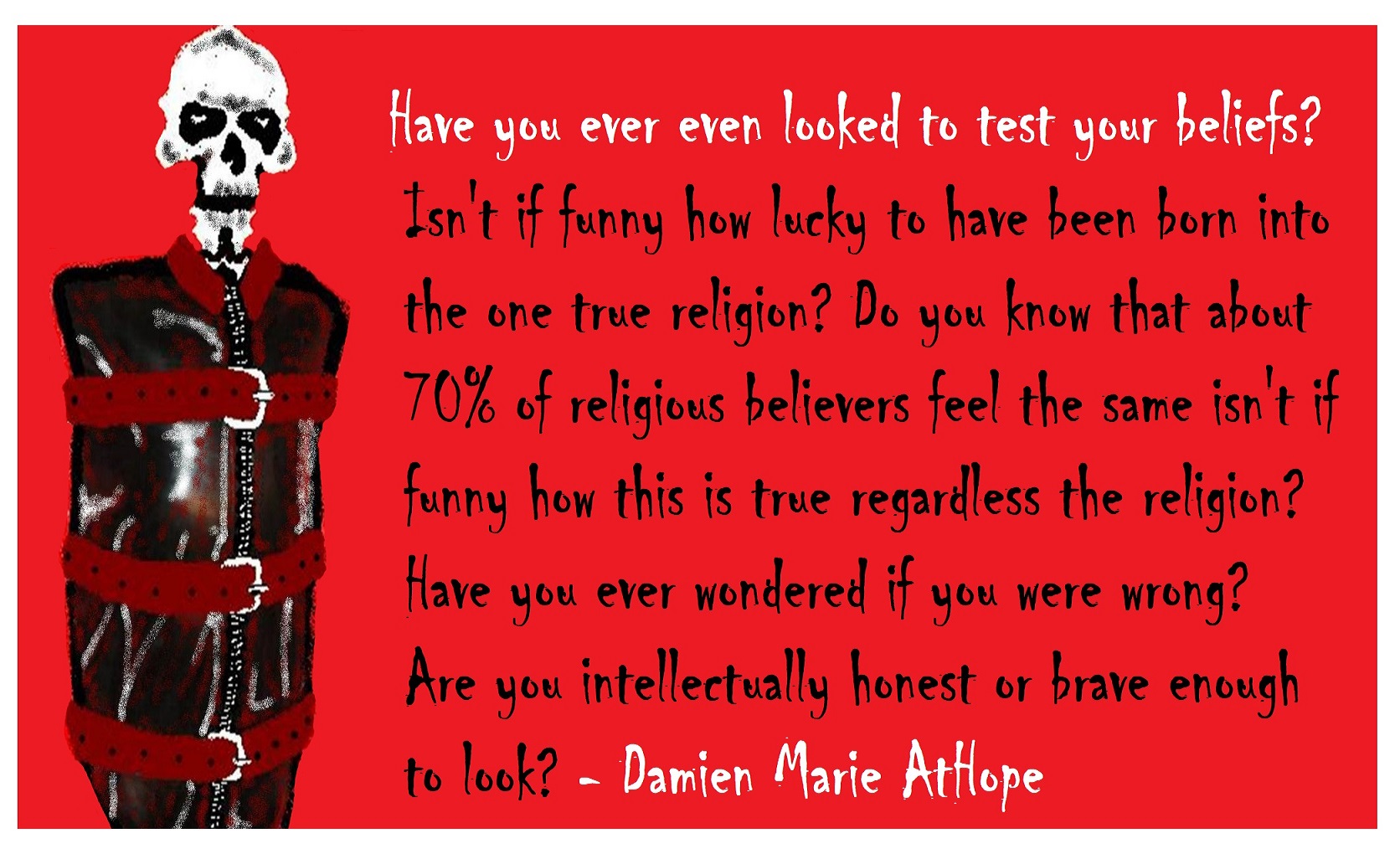
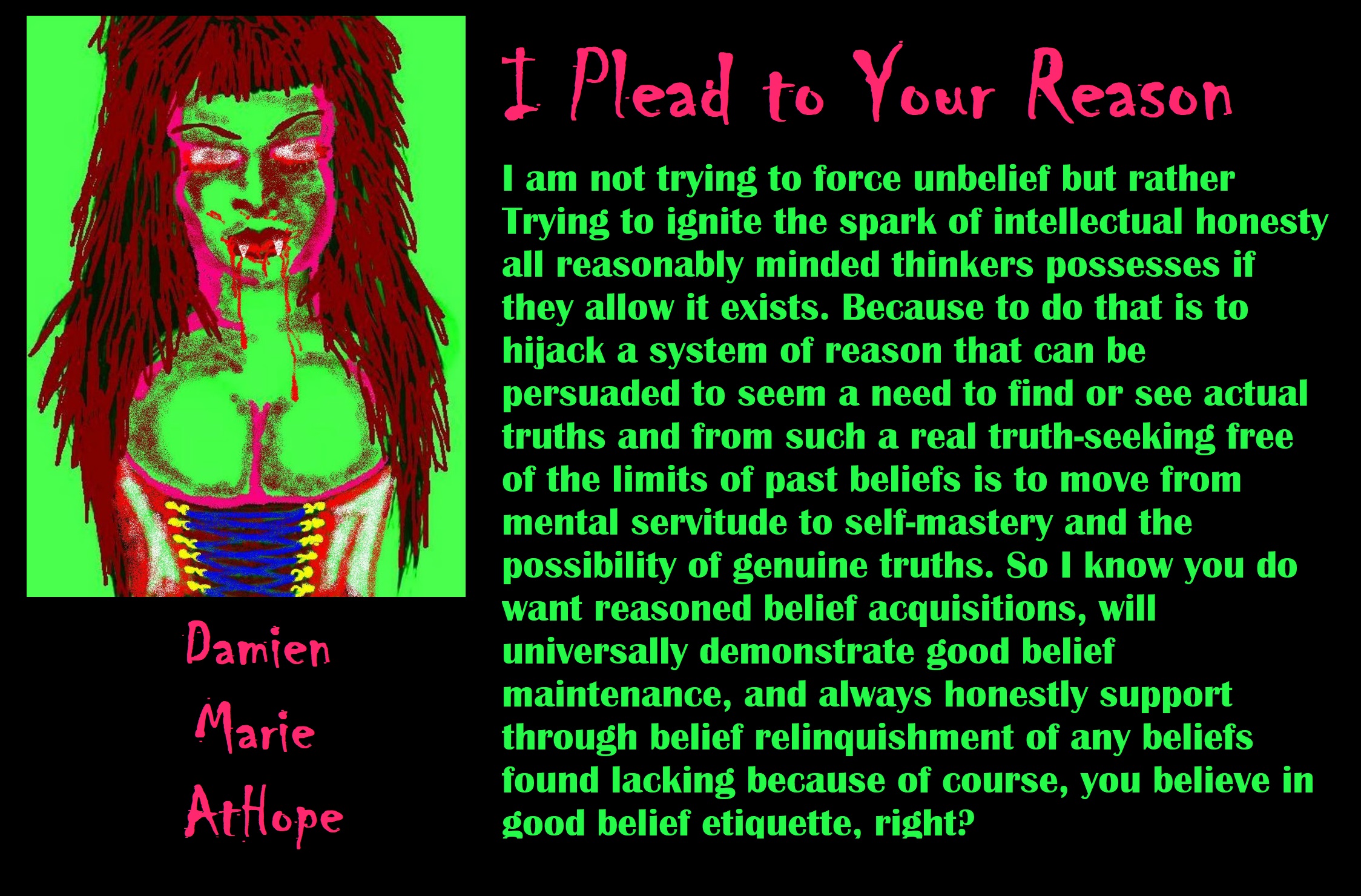

People don’t commonly teach religious history, even that of their own claimed religion. No, rather they teach a limited “pro their religion” history of their religion from a religious perspective favorable to the religion of choice.
We are like believing machines we vacuum up ideas, like Velcro sticks to almost everything. We accumulate beliefs that we allow to negatively influence our lives, often without realizing it. Our willingness must be to alter skewed beliefs that impend our balance or reason, which allows us to achieve new positive thinking and accurate outcomes.



To me, Animism starts in Southern Africa, then to West Europe, and becomes Totemism. Another split goes near the Russia and Siberia border becoming Shamanism, which heads into Central Europe meeting up with Totemism, which also had moved there, mixing the two which then heads to Lake Baikal in Siberia. From there this Shamanism-Totemism heads to Turkey where it becomes Paganism.

Do you truly think “Religious Belief” is only a matter of some personal choice?
Do you not see how coercive one’s world of choice is limited to the obvious hereditary belief, in most religious choices available to the child of religious parents or caregivers? Religion is more commonly like a family, culture, society, etc. available belief that limits the belief choices of the child and that is when “Religious Belief” is not only a matter of some personal choice and when it becomes hereditary faith, not because of the quality of its alleged facts or proposed truths but because everyone else important to the child believes similarly so they do as well simply mimicking authority beliefs handed to them. Because children are raised in religion rather than being presented all possible choices but rather one limited dogmatic brand of “Religious Belief” where children only have a choice of following the belief as instructed, and then personally claim the faith hereditary belief seen in the confirming to the belief they have held themselves all their lives. This is obvious in statements asked and answered by children claiming a faith they barely understand but they do understand that their family believes “this or that” faith, so they feel obligated to believe it too. While I do agree that “Religious Belief” should only be a matter of some personal choice, it rarely is… End Hereditary Religion!

Animism: Respecting the Living World by Graham Harvey
“How have human cultures engaged with and thought about animals, plants, rocks, clouds, and other elements in their natural surroundings? Do animals and other natural objects have a spirit or soul? What is their relationship to humans? In this new study, Graham Harvey explores current and past animistic beliefs and practices of Native Americans, Maori, Aboriginal Australians, and eco-pagans. He considers the varieties of animism found in these cultures as well as their shared desire to live respectfully within larger natural communities. Drawing on his extensive casework, Harvey also considers the linguistic, performative, ecological, and activist implications of these different animisms.” ref

My thoughts on Religion Evolution with external links for more info:
- (Pre-Animism Africa mainly, but also Europe, and Asia at least 300,000 years ago), (Pre-Animism – Oxford Dictionaries)
- (Animism Africa around 100,000 years ago), (Animism – Britannica.com)
- (Totemism Europe around 50,000 years ago), (Totemism – Anthropology)
- (Shamanism Siberia around 30,000 years ago), (Shamanism – Britannica.com)
- (Paganism Turkey around 12,000 years ago), (Paganism – BBC Religion)
- (Progressed Organized Religion “Institutional Religion” Egypt around 5,000 years ago), (Ancient Egyptian Religion – Britannica.com)
- (CURRENT “World” RELIGIONS after 4,000 years ago) (Origin of Major Religions – Sacred Texts)
- (Early Atheistic Doubting at least by 2,600 years ago) (History of Atheism – Wikipedia)
“Religion is an Evolved Product” and Yes, Religion is Like Fear Given Wings…
Atheists talk about gods and religions for the same reason doctors talk about cancer, they are looking for a cure, or a firefighter talks about fires because they burn people and they care to stop them. We atheists too often feel a need to help the victims of mental slavery, held in the bondage that is the false beliefs of gods and the conspiracy theories of reality found in religions.
Understanding Religion Evolution:
- Pre-Animism (at least 300,000 years ago)
- Animism (Africa: 100,000 years ago)
- Totemism (Europe: 50,000 years ago)
- Shamanism (Siberia: 30,000 years ago)
- Paganism (Turkey: 12,000 years ago)
- Progressed organized religion (Egypt: 5,000 years ago), (Egypt, the First Dynasty 5,150 years ago)
- CURRENT “World” RELIGIONS (after 4,000 years ago)
- Early Atheistic Doubting (at least by 2,600 years ago)
“An Archaeological/Anthropological Understanding of Religion Evolution”
It seems ancient peoples had to survived amazing threats in a “dangerous universe (by superstition perceived as good and evil),” and human “immorality or imperfection of the soul” which was thought to affect the still living, leading to ancestor worship. This ancestor worship presumably led to the belief in supernatural beings, and then some of these were turned into the belief in gods. This feeble myth called gods were just a human conceived “made from nothing into something over and over, changing, again and again, taking on more as they evolve, all the while they are thought to be special,” but it is just supernatural animistic spirit-belief perceived as sacred.
Quick Evolution of Religion?
Pre-Animism (at least 300,000 years ago) pre-religion is a beginning that evolves into later Animism. So, Religion as we think of it, to me, all starts in a general way with Animism (Africa: 100,000 years ago) (theoretical belief in supernatural powers/spirits), then this is physically expressed in or with Totemism (Europe: 50,000 years ago) (theoretical belief in mythical relationship with powers/spirits through a totem item), which then enlists a full-time specific person to do this worship and believed interacting Shamanism (Siberia/Russia: 30,000 years ago) (theoretical belief in access and influence with spirits through ritual), and then there is the further employment of myths and gods added to all the above giving you Paganism (Turkey: 12,000 years ago) (often a lot more nature-based than most current top world religions, thus hinting to their close link to more ancient religious thinking it stems from). My hypothesis is expressed with an explanation of the building of a theatrical house (modern religions development). Progressed organized religion (Egypt: 5,000 years ago) with CURRENT “World” RELIGIONS (after 4,000 years ago).
Historically, in large city-state societies (such as Egypt or Iraq) starting around 5,000 years ago culminated to make religion something kind of new, a sociocultural-governmental-religious monarchy, where all or at least many of the people of such large city-state societies seem familiar with and committed to the existence of “religion” as the integrated life identity package of control dynamics with a fixed closed magical doctrine, but this juggernaut integrated religion identity package of Dogmatic-Propaganda certainly did not exist or if developed to an extent it was highly limited in most smaller prehistoric societies as they seem to lack most of the strong control dynamics with a fixed closed magical doctrine (magical beliefs could be at times be added or removed). Many people just want to see developed religious dynamics everywhere even if it is not. Instead, all that is found is largely fragments until the domestication of religion.
Religions, as we think of them today, are a new fad, even if they go back to around 6,000 years in the timeline of human existence, this amounts to almost nothing when seen in the long slow evolution of religion at least around 70,000 years ago with one of the oldest ritual worship. Stone Snake of South Africa: “first human worship” 70,000 years ago. This message of how religion and gods among them are clearly a man-made thing that was developed slowly as it was invented and then implemented peace by peace discrediting them all. Which seems to be a simple point some are just not grasping how devastating to any claims of truth when we can see the lie clearly in the archeological sites.
I wish people fought as hard for the actual values as they fight for the group/clan names political or otherwise they think support values. Every amount spent on war is theft to children in need of food or the homeless kept from shelter.
Here are several of my blog posts on history:
- To Find Truth You Must First Look
- (Magdalenian/Iberomaurusian) Connections to the First Paganists of the early Neolithic Near East Dating from around 17,000 to 12,000 Years Ago
- Natufians: an Ancient People at the Origins of Agriculture and Sedentary Life
- Possible Clan Leader/Special “MALE” Ancestor Totem Poles At Least 13,500 years ago?
- Jewish People with DNA at least 13,200 years old, Judaism, and the Origins of Some of its Ideas
- Baltic Reindeer Hunters: Swiderian, Lyngby, Ahrensburgian, and Krasnosillya cultures 12,020 to 11,020 years ago are evidence of powerful migratory waves during the last 13,000 years and a genetic link to Saami and the Finno-Ugric peoples.
- The Rise of Inequality: patriarchy and state hierarchy inequality
- Fertile Crescent 12,500 – 9,500 Years Ago: fertility and death cult belief system?
- 12,400 – 11,700 Years Ago – Kortik Tepe (Turkey) Pre/early-Agriculture Cultic Ritualism
- Ritualistic Bird Symbolism at Gobekli Tepe and its “Ancestor Cult”
- Male-Homosexual (female-like) / Trans-woman (female) Seated Figurine from Gobekli Tepe
- Could a 12,000-year-old Bull Geoglyph at Göbekli Tepe relate to older Bull and Female Art 25,000 years ago and Later Goddess and the Bull cults like Catal Huyuk?
- Sedentism and the Creation of goddesses around 12,000 years ago as well as male gods after 7,000 years ago.
- Alcohol, where Agriculture and Religion Become one? Such as Gobekli Tepe’s Ritualistic use of Grain as Food and Ritual Drink
- Neolithic Ritual Sites with T-Pillars and other Cultic Pillars
- Paganism: Goddesses around 12,000 years ago then Male Gods after 7,000 years ago
- First Patriarchy: Split of Women’s Status around 12,000 years ago & First Hierarchy: fall of Women’s Status around 5,000 years ago.
- Natufians: an Ancient People at the Origins of Agriculture and Sedentary Life
- J DNA and the Spread of Agricultural Religion (paganism)
- Paganism: an approximately 12,000-year-old belief system
- Paganism 12,000 years old: related to “Anarchism and Socialism” (Pre-Capitalism)
- Shaman burial in Israel 12,000 years ago and the Shamanism Phenomena
- Need to Mythicized: gods and goddesses
- 12,000 – 7,000 Years Ago – Paleo-Indian Culture (The Americas)
- 12,000 – 2,000 Years Ago – Indigenous-Scandinavians (Nordic)
- Norse did not wear helmets with horns?
- Pre-Pottery Neolithic Skull Cult around 11,500 to 8,400 Years Ago?
- 10,400 – 10,100 Years Ago, in Turkey the Nevail Cori Religious Settlement
- 9,000-6,500 Years Old Submerged Pre-Pottery/Pottery Neolithic Ritual Settlements off Israel’s Coast
- Catal Huyuk “first religious designed city” around 9,500 to 7,700 years ago (Turkey)
- Cultic Hunting at Catal Huyuk “first religious designed city”
- Special Items and Art as well as Special Elite Burials at Catal Huyuk
- New Rituals and Violence with the appearance of Pottery and People?
- Haplogroup N and its related Uralic Languages and Cultures
- Ainu people, Sámi people, Native Americans, the Ancient North Eurasians, and Paganistic-Shamanism with Totemism
- Ideas, Technology and People from Turkey, Europe, to China and Back again 9,000 to 5,000 years ago?
- First Pottery of Europe and the Related Cultures
- 9,000 years old Neolithic Artifacts Judean Desert and Hills Israel
- 9,000-7,000 years-old Sex and Death Rituals: Cult Sites in Israel, Jordan, and the Sinai
- 9,000-8500 year old Horned Female shaman Bad Dürrenberg Germany
- Neolithic Jewelry and the Spread of Farming in Europe Emerging out of West Turkey
- 8,600-year-old Tortoise Shells in Neolithic graves in central China have Early Writing and Shamanism
- Swing of the Mace: the rise of Elite, Forced Authority, and Inequality begin to Emerge 8,500 years ago?
- Migrations and Changing Europeans Beginning around 8,000 Years Ago
- My “Steppe-Anatolian-Kurgan hypothesis” 8,000/7,000 years ago
- Around 8,000-year-old Shared Idea of the Mistress of Animals, “Ritual” Motif
- Pre-Columbian Red-Paint (red ochre) Maritime Archaic Culture 8,000-3,000 years ago
- 7,522-6,522 years ago Linear Pottery culture which I think relates to Arcane Capitalism’s origins
- Arcane Capitalism: Primitive socialism, Primitive capital, Private ownership, Means of production, Market capitalism, Class discrimination, and Petite bourgeoisie (smaller capitalists)
- 7,500-4,750 years old Ritualistic Cucuteni-Trypillian culture of Moldova, Romania, and Ukraine
- Roots of a changing early society 7,200-6,700 years ago Jordan and Israel
- Agriculture religion (Paganism) with farming reached Britain between about 7,000 to 6,500 or so years ago and seemingly expressed in things like Western Europe’s Long Barrows
- My Thoughts on Possible Migrations of “R” DNA and Proto-Indo-European?
- “Millet” Spreading from China 7,022 years ago to Europe and related Language may have Spread with it leading to Proto-Indo-European
- Proto-Indo-European (PIE), ancestor of Indo-European languages: DNA, Society, Language, and Mythology
- The Dnieper–Donets culture and Asian varieties of Millet from China to the Black Sea region of Europe by 7,022 years ago
- Kurgan 6,000 years ago/dolmens 7,000 years ago: funeral, ritual, and other?
- 7,020 to 6,020-year-old Proto-Indo-European Homeland of Urheimat or proposed home of their Language and Religion
- Ancient Megaliths: Kurgan, Ziggurat, Pyramid, Menhir, Trilithon, Dolman, Kromlech, and Kromlech of Trilithons
- The Mytheme of Ancient North Eurasian Sacred-Dog belief and similar motifs are found in Indo-European, Native American, and Siberian comparative mythology
- Elite Power Accumulation: Ancient Trade, Tokens, Writing, Wealth, Merchants, and Priest-Kings
- Sacred Mounds, Mountains, Kurgans, and Pyramids may hold deep connections?
- Between 7,000-5,000 Years ago, rise of unequal hierarchy elite, leading to a “birth of the State” or worship of power, strong new sexism, oppression of non-elites, and the fall of Women’s equal status
- Paganism 7,000-5,000 years old: related to “Anarchism and Socialism” (Capitalism) (World War 0) Elite & their slaves
- Hell and Underworld mythologies starting maybe as far back as 7,000 to 5,000 years ago with the Proto-Indo-Europeans?
- The First Expression of the Male God around 7,000 years ago?
- White (light complexion skin) Bigotry and Sexism started 7,000 years ago?
- Around 7,000-year-old Shared Idea of the Divine Bird (Tutelary and/or Trickster spirit/deity), “Ritual” Motif
- Nekhbet an Ancient Egyptian Vulture Goddess and Tutelary Deity
- 6,720 to 4,920 years old Ritualistic Hongshan Culture of Inner Mongolia with 5,000-year-old Pyramid Mounds and Temples
- First proto-king in the Balkans, Varna culture around 6,500 years ago?
- 6,500–5,800 years ago in Israel Late Chalcolithic (Copper Age) Period in the Southern Levant Seems to Express Northern Levant Migrations, Cultural and Religious Transfer
- KING OF BEASTS: Master of Animals “Ritual” Motif, around 6,000 years old or older…
- Around 6000-year-old Shared Idea of the Solid Wheel & the Spoked Wheel-Shaped Ritual Motif
- “The Ghassulian Star,” a mysterious 6,000-year-old mural from Jordan; a Proto-Star of Ishtar, Star of Inanna or Star of Venus?
- Religious/Ritual Ideas, including goddesses and gods as well as ritual mounds or pyramids from Northeastern Asia at least 6,000 years old, seemingly filtering to Iran, Iraq, the Mediterranean, Europe, Egypt, and the Americas?
- Maykop (5,720–5,020 years ago) Caucasus region Bronze Age culture-related to Copper Age farmers from the south, influenced by the Ubaid period and Leyla-Tepe culture, as well as influencing the Kura-Araxes culture
- 5-600-year-old Tomb, Mummy, and First Bearded Male Figurine in a Grave
- Kura-Araxes Cultural 5,520 to 4,470 years old DNA traces to the Canaanites, Arabs, and Jews
- Minoan/Cretan (Keftiu) Civilization and Religion around 5,520 to 3,120 years ago
- Evolution Of Science at least by 5,500 years ago
- 5,500 Years old birth of the State, the rise of Hierarchy, and the fall of Women’s status
- “Jiroft culture” 5,100 – 4,200 years ago and the History of Iran
- Stonehenge: Paganistic Burial and Astrological Ritual Complex, England (5,100-3,600 years ago)
- Around 5,000-year-old Shared Idea of the “Tree of Life” Ritual Motif
- Complex rituals for elite, seen from China to Egypt, at least by 5,000 years ago
- Around 5,000 years ago: “Birth of the State” where Religion gets Military Power and Influence
- The Center of the World “Axis Mundi” and/or “Sacred Mountains” Mythology Could Relate to the Altai Mountains, Heart of the Steppe
- Progressed organized religion starts, an approximately 5,000-year-old belief system
- China’s Civilization between 5,000-3,000 years ago, was a time of war and class struggle, violent transition from free clans to a Slave or Elite society
- Origin of Logics is Naturalistic Observation at least by around 5,000 years ago.
- Paganism 5,000 years old: progressed organized religion and the state: related to “Anarchism and Socialism” (Kings and the Rise of the State)
- Ziggurats (multi-platform temples: 4,900 years old) to Pyramids (multi-platform tombs: 4,700 years old)
- Did a 4,520–4,420-year-old Volcano In Turkey Inspire the Bible God?
- Finland’s Horned Shaman and Pre-Horned-God at least 4,500 years ago?
- 4,000-year-Old Dolmens in Israel: A Connected Dolmen Religious Phenomenon?
- Creation myths: From chaos, Ex nihilo, Earth-diver, Emergence, World egg, and World parent
- Bronze Age “Ritual” connections of the Bell Beaker culture with the Corded Ware/Single Grave culture, which were related to the Yamnaya culture and Proto-Indo-European Languages/Religions
- Low Gods (Earth/ Tutelary deity), High Gods (Sky/Supreme deity), and Moralistic Gods (Deity enforcement/divine order)
- The exchange of people, ideas, and material-culture including, to me, the new god (Sky Father) and goddess (Earth Mother) religion between the Cucuteni-Trypillians and others which is then spread far and wide
- Koryaks: Indigenous People of the Russian Far East and Big Raven myths also found in Tlingit, Haida, Tsimshian, and other Indigenous People of North America
- 42 Principles Of Maat (Egyptian Goddess of the justice) around 4,400 years ago, 2000 Years Before Ten Commandments
- “Happy Easter” Well Happy Eostre/Ishter
- 4,320-3,820 years old “Shimao” (North China) site with Totemistic-Shamanistic Paganism and a Stepped Pyramid
- 4,250 to 3,400 Year old Stonehenge from Russia: Arkaim?
- 4,100-year-old beaker with medicinal & flowering plants in a grave of a woman in Scotland
- Early European Farmer ancestry, Kelif el Boroud people with the Cardial Ware culture, and the Bell Beaker culture Paganists too, spread into North Africa, then to the Canary Islands off West Africa
- Flood Accounts: Gilgamesh epic (4,100 years ago) Noah in Genesis (2,600 years ago)
- Paganism 4,000 years old: related to “Anarchism and Socialism” (First Moralistic gods, then the Origin time of Monotheism)
- When was the beginning: TIMELINE OF CURRENT RELIGIONS, which start around 4,000 years ago.
- Early Religions Thought to Express Proto-Monotheistic Systems around 4,000 years ago
- Kultepe? An archaeological site with a 4,000 years old women’s rights document.
- Single God Religions (Monotheism) = “Man-o-theism” started around 4,000 years ago with the Great Sky Spirit/God Tiān (天)?
- Confucianism’s Tiān (Shangdi god 4,000 years old): Supernaturalism, Pantheism or Theism?
- Yes, Your Male God is Ridiculous
- Mythology, a Lunar Deity is a Goddess or God of the Moon
- Sacred Land, Hills, and Mountains: Sami Mythology (Paganistic Shamanism)
- Horse Worship/Sacrifice: mythical union of Ruling Elite/Kingship and the Horse
- The Amorite/Amurru people’s God Amurru “Lord of the Steppe”, relates to the Origins of the Bible God?
- Bronze Age Exotic Trade Routes Spread Quite Far as well as Spread Religious Ideas with Them
- Sami and the Northern Indigenous Peoples Landscape, Language, and its Connection to Religion
- Prototype of Ancient Analemmatic Sundials around 3,900-3,150 years ago and a Possible Solar Connection to gods?
- Judaism is around 3,450 or 3,250 years old. (“Paleo-Hebrew” 3,000 years ago and Torah 2,500 years ago)
- The Weakening of Ancient Trade and the Strengthening of Religions around 3000 years ago?
- Are you aware that there are religions that worship women gods, explain now religion tears women down?
- Animistic, Totemistic, and Paganistic Superstition Origins of bible god and the bible’s Religion.
- Myths and Folklore: “Trickster gods and goddesses”
- Jews, Judaism, and the Origins of Some of its Ideas
- An Old Branch of Religion Still Giving Fruit: Sacred Trees
- Dating the BIBLE: naming names and telling times (written less than 3,000 years ago, provable to 2,200 years ago)
- Did a Volcano Inspire the bible god?
- Dené–Yeniseian language, Old Copper Complex, and Pre-Columbian Mound Builders?
- No “dinosaurs and humans didn’t exist together just because some think they are in the bible itself”
- Sacred Shit and Sacred Animals?
- Everyone Killed in the Bible Flood? “Nephilim” (giants)?
- Hey, Damien dude, I have a question for you regarding “the bible” Exodus.
- Archaeology Disproves the Bible
- Bible Battle, Just More, Bible Babble
- The Jericho Conquest lie?
- Canaanites and Israelites?
- Accurate Account on how did Christianity Began?
- Let’s talk about Christianity.
- So the 10 commandments isn’t anything to go by either right?
- Misinformed christian
- Debunking Jesus?
- Paulism vs Jesus
- Ok, you seem confused so let’s talk about Buddhism.
- Unacknowledged Buddhism: Gods, Savior, Demons, Rebirth, Heavens, Hells, and Terrorism
- His Foolishness The Dalai Lama
- Yin and Yang is sexist with an ORIGIN around 2,300 years ago?
- I Believe Archaeology, not Myths & Why Not, as the Religious Myths Already Violate Reason!
- Archaeological, Scientific, & Philosophic evidence shows the god myth is man-made nonsense.
- Aquatic Ape Theory/Hypothesis? As Always, Just Pseudoscience.
- Ancient Aliens Conspiracy Theorists are Pseudohistorians
- The Pseudohistoric and Pseudoscientific claims about “Bakoni Ruins” of South Africa
- Why do people think Religion is much more than supernaturalism and superstitionism?
- Religion is an Evolved Product
- Was the Value of Ancient Women Different?
- 1000 to 1100 CE, human sacrifice Cahokia Mounds a pre-Columbian Native American site
- Feminist atheists as far back as the 1800s?
- Promoting Religion as Real is Mentally Harmful to a Flourishing Humanity
- Screw All Religions and Their Toxic lies, they are all fraud
- Forget Religions’ Unfounded Myths, I Have Substantiated “Archaeology Facts.”
- Religion Dispersal throughout the World
- I Hate Religion Just as I Hate all Pseudoscience
- Exposing Scientology, Eckankar, Wicca and Other Nonsense?
- Main deity or religious belief systems
- Quit Trying to Invent Your God From the Scraps of Science.
- Archaeological, Scientific, & Philosophic evidence shows the god myth is man-made nonsense.
- Ancient Alien Conspiracy Theorists: Misunderstanding, Rhetoric, Misinformation, Fabrications, and Lies
- Misinformation, Distortion, and Pseudoscience in Talking with a Christian Creationist
- Judging the Lack of Goodness in Gods, Even the Norse God Odin
- Challenging the Belief in God-like Aliens and Gods in General
- A Challenge to Christian use of Torture Devices?
- Yes, Hinduism is a Religion
- Trump is One of the Most Reactionary Forces of Far-right Christian Extremism
- Was the Bull Head a Symbol of God? Yes!
- Primate Death Rituals
- Christian – “God and Christianity are objectively true”
- Australopithecus afarensis Death Ritual?
- You Claim Global Warming is a Hoax?
- Doubter of Science and Defamer of Atheists?
- I think that sounds like the Bible?
- History of the Antifa (“anti-fascist”) Movements
- Indianapolis Anti-Blasphemy Laws #Free Soheil Rally
- Damien, you repeat the golden rule in so many forms then you say religion is dogmatic?
- Science is a Trustable Methodology whereas Faith is not Trustable at all!
- Was I ever a believer, before I was an atheist?
- Atheists rise in reason
- Mistrust of science?
- Open to Talking About the Definition of ‘God’? But first, we address Faith.
- ‘United Monarchy’ full of splendor and power – Saul, David, and Solomon? Most likely not.
- Is there EXODUS ARCHAEOLOGY? The short answer is “no.”
- Lacking Proof of Bigfoots, Unicorns, and Gods is Just a Lack of Research?
- Religion and Politics: Faith Beliefs vs. Rational Thinking
- Hammer of Truth that lying pig RELIGION: challenged by an archaeologist
- “The Hammer of Truth” -ontology question- What do You Mean by That?
- Navigation of a bad argument: Ad Hominem vs. Attack
- Why is it Often Claimed that Gods have a Gender?
- Why are basically all monotheistic religions ones that have a male god?
- Shifting through the Claims in support of Faith
- Dear Mr. AtHope, The 20th Century is an Indictment of Secularism and a Failed Atheist Century
- An Understanding of the Worldwide Statistics and Dynamics of Terrorist Incidents and Suicide Attacks
- Intoxication and Evolution? Addressing and Assessing the “Stoned Ape” or “Drunken Monkey” Theories as Catalysts in Human Evolution
- Sacred Menstrual cloth? Inanna’s knot, Isis knot, and maybe Ma’at’s feather?
- Damien, why don’t the Hebrews accept the bible stories?
- Dealing with a Troll and Arguing Over Word Meaning
- Knowledge without Belief? Justified beliefs or disbeliefs worthy of Knowledge?
- Afrocentrism and African Religions
- Crecganford @crecganford offers history & stories of the people, places, gods, & culture
- Empiricism-Denier?
I am not an academic. I am a revolutionary that teaches in public, in places like social media, and in the streets. I am not a leader by some title given but from my commanding leadership style of simply to start teaching everywhere to everyone, all manner of positive education.

Not all “Religions” or “Religious Persuasions” have a god(s) but
All can be said to believe in some imaginary beings or imaginary things like spirits, afterlives, etc.

Paganism 12,000-4,000 years old
12,000-7,000 years old: related to (Pre-Capitalism)
7,000-5,000 years old: related to (Capitalism) (World War 0) Elite and their slaves!
5,000 years old: related to (Kings and the Rise of the State)
4,000 years old: related to (First Moralistic gods, then the Origin time of Monotheism)

ref, ref, ref, ref, ref, ref, ref, ref, ref, ref, ref, ref, ref, ref, ref, ref, ref, ref, ref, ref, ref
Low Gods “Earth” or Tutelary deity and High Gods “Sky” or Supreme deity
“An Earth goddess is a deification of the Earth. Earth goddesses are often associated with the “chthonic” deities of the underworld. Ki and Ninhursag are Mesopotamian earth goddesses. In Greek mythology, the Earth is personified as Gaia, corresponding to Roman Terra, Indic Prithvi/Bhūmi, etc. traced to an “Earth Mother” complementary to the “Sky Father” in Proto-Indo-European religion. Egyptian mythology exceptionally has a sky goddess and an Earth god.” ref
“A mother goddess is a goddess who represents or is a personification of nature, motherhood, fertility, creation, destruction or who embodies the bounty of the Earth. When equated with the Earth or the natural world, such goddesses are sometimes referred to as Mother Earth or as the Earth Mother. In some religious traditions or movements, Heavenly Mother (also referred to as Mother in Heaven or Sky Mother) is the wife or feminine counterpart of the Sky father or God the Father.” ref
“Any masculine sky god is often also king of the gods, taking the position of patriarch within a pantheon. Such king gods are collectively categorized as “sky father” deities, with a polarity between sky and earth often being expressed by pairing a “sky father” god with an “earth mother” goddess (pairings of a sky mother with an earth father are less frequent). A main sky goddess is often the queen of the gods and may be an air/sky goddess in her own right, though she usually has other functions as well with “sky” not being her main. In antiquity, several sky goddesses in ancient Egypt, Mesopotamia, and the Near East were called Queen of Heaven. Neopagans often apply it with impunity to sky goddesses from other regions who were never associated with the term historically. The sky often has important religious significance. Many religions, both polytheistic and monotheistic, have deities associated with the sky.” ref
“In comparative mythology, sky father is a term for a recurring concept in polytheistic religions of a sky god who is addressed as a “father”, often the father of a pantheon and is often either a reigning or former King of the Gods. The concept of “sky father” may also be taken to include Sun gods with similar characteristics, such as Ra. The concept is complementary to an “earth mother“. “Sky Father” is a direct translation of the Vedic Dyaus Pita, etymologically descended from the same Proto-Indo-European deity name as the Greek Zeûs Pater and Roman Jupiter and Germanic Týr, Tir or Tiwaz, all of which are reflexes of the same Proto-Indo-European deity’s name, *Dyēus Ph₂tḗr. While there are numerous parallels adduced from outside of Indo-European mythology, there are exceptions (e.g. In Egyptian mythology, Nut is the sky mother and Geb is the earth father).” ref
Tutelary deity
“A tutelary (also tutelar) is a deity or spirit who is a guardian, patron, or protector of a particular place, geographic feature, person, lineage, nation, culture, or occupation. The etymology of “tutelary” expresses the concept of safety and thus of guardianship. In late Greek and Roman religion, one type of tutelary deity, the genius, functions as the personal deity or daimon of an individual from birth to death. Another form of personal tutelary spirit is the familiar spirit of European folklore.” ref
“A tutelary (also tutelar) in Korean shamanism, jangseung and sotdae were placed at the edge of villages to frighten off demons. They were also worshiped as deities. Seonangshin is the patron deity of the village in Korean tradition and was believed to embody the Seonangdang. In Philippine animism, Diwata or Lambana are deities or spirits that inhabit sacred places like mountains and mounds and serve as guardians. Such as: Maria Makiling is the deity who guards Mt. Makiling and Maria Cacao and Maria Sinukuan. In Shinto, the spirits, or kami, which give life to human bodies come from nature and return to it after death. Ancestors are therefore themselves tutelaries to be worshiped. And similarly, Native American beliefs such as Tonás, tutelary animal spirit among the Zapotec and Totems, familial or clan spirits among the Ojibwe, can be animals.” ref
“A tutelary (also tutelar) in Austronesian beliefs such as: Atua (gods and spirits of the Polynesian peoples such as the Māori or the Hawaiians), Hanitu (Bunun of Taiwan‘s term for spirit), Hyang (Kawi, Sundanese, Javanese, and Balinese Supreme Being, in ancient Java and Bali mythology and this spiritual entity, can be either divine or ancestral), Kaitiaki (New Zealand Māori term used for the concept of guardianship, for the sky, the sea, and the land), Kawas (mythology) (divided into 6 groups: gods, ancestors, souls of the living, spirits of living things, spirits of lifeless objects, and ghosts), Tiki (Māori mythology, Tiki is the first man created by either Tūmatauenga or Tāne and represents deified ancestors found in most Polynesian cultures). ” ref, ref, ref, ref, ref, ref, ref
Mesopotamian Tutelary Deities can be seen as ones related to City-States
“Historical city-states included Sumerian cities such as Uruk and Ur; Ancient Egyptian city-states, such as Thebes and Memphis; the Phoenician cities (such as Tyre and Sidon); the five Philistine city-states; the Berber city-states of the Garamantes; the city-states of ancient Greece (the poleis such as Athens, Sparta, Thebes, and Corinth); the Roman Republic (which grew from a city-state into a vast empire); the Italian city-states from the Middle Ages to the early modern period, such as Florence, Siena, Ferrara, Milan (which as they grew in power began to dominate neighboring cities) and Genoa and Venice, which became powerful thalassocracies; the Mayan and other cultures of pre-Columbian Mesoamerica (including cities such as Chichen Itza, Tikal, Copán and Monte Albán); the central Asian cities along the Silk Road; the city-states of the Swahili coast; Ragusa; states of the medieval Russian lands such as Novgorod and Pskov; and many others.” ref
“The Uruk period (ca. 4000 to 3100 BCE; also known as Protoliterate period) of Mesopotamia, named after the Sumerian city of Uruk, this period saw the emergence of urban life in Mesopotamia and the Sumerian civilization. City-States like Uruk and others had a patron tutelary City Deity along with a Priest-King.” ref
“Chinese folk religion, both past, and present, includes myriad tutelary deities. Exceptional individuals, highly cultivated sages, and prominent ancestors can be deified and honored after death. Lord Guan is the patron of military personnel and police, while Mazu is the patron of fishermen and sailors. Such as Tu Di Gong (Earth Deity) is the tutelary deity of a locality, and each individual locality has its own Earth Deity and Cheng Huang Gong (City God) is the guardian deity of an individual city, worshipped by local officials and locals since imperial times.” ref
“A tutelary (also tutelar) in Hinduism, personal tutelary deities are known as ishta-devata, while family tutelary deities are known as Kuladevata. Gramadevata are guardian deities of villages. Devas can also be seen as tutelary. Shiva is the patron of yogis and renunciants. City goddesses include: Mumbadevi (Mumbai), Sachchika (Osian); Kuladevis include: Ambika (Porwad), and Mahalakshmi. In NorthEast India Meitei mythology and religion (Sanamahism) of Manipur, there are various types of tutelary deities, among which Lam Lais are the most predominant ones. Tibetan Buddhism has Yidam as a tutelary deity. Dakini is the patron of those who seek knowledge.” ref
“A tutelary (also tutelar) The Greeks also thought deities guarded specific places: for instance, Athena was the patron goddess of the city of Athens. Socrates spoke of hearing the voice of his personal spirit or daimonion:
You have often heard me speak of an oracle or sign which comes to me … . This sign I have had ever since I was a child. The sign is a voice which comes to me and always forbids me to do something which I am going to do, but never commands me to do anything, and this is what stands in the way of my being a politician.” ref
“Tutelary deities who guard and preserve a place or a person are fundamental to ancient Roman religion. The tutelary deity of a man was his Genius, that of a woman her Juno. In the Imperial era, the Genius of the Emperor was a focus of Imperial cult. An emperor might also adopt a major deity as his personal patron or tutelary, as Augustus did Apollo. Precedents for claiming the personal protection of a deity were established in the Republican era, when for instance the Roman dictator Sulla advertised the goddess Victory as his tutelary by holding public games (ludi) in her honor.” ref
“Each town or city had one or more tutelary deities, whose protection was considered particularly vital in time of war and siege. Rome itself was protected by a goddess whose name was to be kept ritually secret on pain of death (for a supposed case, see Quintus Valerius Soranus). The Capitoline Triad of Juno, Jupiter, and Minerva were also tutelaries of Rome. The Italic towns had their own tutelary deities. Juno often had this function, as at the Latin town of Lanuvium and the Etruscan city of Veii, and was often housed in an especially grand temple on the arx (citadel) or other prominent or central location. The tutelary deity of Praeneste was Fortuna, whose oracle was renowned.” ref
“The Roman ritual of evocatio was premised on the belief that a town could be made vulnerable to military defeat if the power of its tutelary deity were diverted outside the city, perhaps by the offer of superior cult at Rome. The depiction of some goddesses such as the Magna Mater (Great Mother, or Cybele) as “tower-crowned” represents their capacity to preserve the city. A town in the provinces might adopt a deity from within the Roman religious sphere to serve as its guardian, or syncretize its own tutelary with such; for instance, a community within the civitas of the Remi in Gaul adopted Apollo as its tutelary, and at the capital of the Remi (present-day Rheims), the tutelary was Mars Camulus.” ref
Household deity (a kind of or related to a Tutelary deity)
“A household deity is a deity or spirit that protects the home, looking after the entire household or certain key members. It has been a common belief in paganism as well as in folklore across many parts of the world. Household deities fit into two types; firstly, a specific deity – typically a goddess – often referred to as a hearth goddess or domestic goddess who is associated with the home and hearth, such as the ancient Greek Hestia.” ref
“The second type of household deities are those that are not one singular deity, but a type, or species of animistic deity, who usually have lesser powers than major deities. This type was common in the religions of antiquity, such as the Lares of ancient Roman religion, the Gashin of Korean shamanism, and Cofgodas of Anglo-Saxon paganism. These survived Christianisation as fairy-like creatures existing in folklore, such as the Anglo-Scottish Brownie and Slavic Domovoy.” ref
“Household deities were usually worshipped not in temples but in the home, where they would be represented by small idols (such as the teraphim of the Bible, often translated as “household gods” in Genesis 31:19 for example), amulets, paintings, or reliefs. They could also be found on domestic objects, such as cosmetic articles in the case of Tawaret. The more prosperous houses might have a small shrine to the household god(s); the lararium served this purpose in the case of the Romans. The gods would be treated as members of the family and invited to join in meals, or be given offerings of food and drink.” ref
“In many religions, both ancient and modern, a god would preside over the home. Certain species, or types, of household deities, existed. An example of this was the Roman Lares. Many European cultures retained house spirits into the modern period. Some examples of these include:
- Brownie (Scotland and England) or Hob (England) / Kobold (Germany) / Goblin / Hobgoblin
- Domovoy (Slavic)
- Nisse (Norwegian or Danish) / Tomte (Swedish) / Tonttu (Finnish)
- Húsvættir (Norse)” ref
“Although the cosmic status of household deities was not as lofty as that of the Twelve Olympians or the Aesir, they were also jealous of their dignity and also had to be appeased with shrines and offerings, however humble. Because of their immediacy they had arguably more influence on the day-to-day affairs of men than the remote gods did. Vestiges of their worship persisted long after Christianity and other major religions extirpated nearly every trace of the major pagan pantheons. Elements of the practice can be seen even today, with Christian accretions, where statues to various saints (such as St. Francis) protect gardens and grottos. Even the gargoyles found on older churches, could be viewed as guardians partitioning a sacred space.” ref
“For centuries, Christianity fought a mop-up war against these lingering minor pagan deities, but they proved tenacious. For example, Martin Luther‘s Tischreden have numerous – quite serious – references to dealing with kobolds. Eventually, rationalism and the Industrial Revolution threatened to erase most of these minor deities, until the advent of romantic nationalism rehabilitated them and embellished them into objects of literary curiosity in the 19th century. Since the 20th century this literature has been mined for characters for role-playing games, video games, and other fantasy personae, not infrequently invested with invented traits and hierarchies somewhat different from their mythological and folkloric roots.” ref
“In contradistinction to both Herbert Spencer and Edward Burnett Tylor, who defended theories of animistic origins of ancestor worship, Émile Durkheim saw its origin in totemism. In reality, this distinction is somewhat academic, since totemism may be regarded as a particularized manifestation of animism, and something of a synthesis of the two positions was attempted by Sigmund Freud. In Freud’s Totem and Taboo, both totem and taboo are outward expressions or manifestations of the same psychological tendency, a concept which is complementary to, or which rather reconciles, the apparent conflict. Freud preferred to emphasize the psychoanalytic implications of the reification of metaphysical forces, but with particular emphasis on its familial nature. This emphasis underscores, rather than weakens, the ancestral component.” ref
“William Edward Hearn, a noted classicist, and jurist, traced the origin of domestic deities from the earliest stages as an expression of animism, a belief system thought to have existed also in the neolithic, and the forerunner of Indo-European religion. In his analysis of the Indo-European household, in Chapter II “The House Spirit”, Section 1, he states:
The belief which guided the conduct of our forefathers was … the spirit rule of dead ancestors.” ref
“In Section 2 he proceeds to elaborate:
It is thus certain that the worship of deceased ancestors is a vera causa, and not a mere hypothesis. …
In the other European nations, the Slavs, the Teutons, and the Kelts, the House Spirit appears with no less distinctness. … [T]he existence of that worship does not admit of doubt. … The House Spirits had a multitude of other names which it is needless here to enumerate, but all of which are more or less expressive of their friendly relations with man. … In [England] … [h]e is the Brownie. … In Scotland this same Brownie is well known. He is usually described as attached to particular families, with whom he has been known to reside for centuries, threshing the corn, cleaning the house, and performing similar household tasks. His favorite gratification was milk and honey.” ref

ref, ref, ref, ref, ref, ref, ref, ref, ref, ref, ref, ref, ref, ref, ref, ref, ref
“These ideas are my speculations from the evidence.”
I am still researching the “god‘s origins” all over the world. So you know, it is very complicated but I am smart and willing to look, DEEP, if necessary, which going very deep does seem to be needed here, when trying to actually understand the evolution of gods and goddesses. I am sure of a few things and less sure of others, but even in stuff I am not fully grasping I still am slowly figuring it out, to explain it to others. But as I research more I am understanding things a little better, though I am still working on understanding it all or something close and thus always figuring out more.
Sky Father/Sky God?
“Egyptian: (Nut) Sky Mother and (Geb) Earth Father” (Egypt is different but similar)
Turkic/Mongolic: (Tengri/Tenger Etseg) Sky Father and (Eje/Gazar Eej) Earth Mother *Transeurasian*
Hawaiian: (Wākea) Sky Father and (Papahānaumoku) Earth Mother *Austronesian*
New Zealand/ Māori: (Ranginui) Sky Father and (Papatūānuku) Earth Mother *Austronesian*
Proto-Indo-European: (Dyḗus/Dyḗus ph₂tḗr) Sky Father and (Dʰéǵʰōm/Pleth₂wih₁) Earth Mother
Indo-Aryan: (Dyaus Pita) Sky Father and (Prithvi Mata) Earth Mother *Indo-European*
Italic: (Jupiter) Sky Father and (Juno) Sky Mother *Indo-European*
Etruscan: (Tinia) Sky Father and (Uni) Sky Mother *Tyrsenian/Italy Pre–Indo-European*
Hellenic/Greek: (Zeus) Sky Father and (Hera) Sky Mother who started as an “Earth Goddess” *Indo-European*
Nordic: (Dagr) Sky Father and (Nótt) Sky Mother *Indo-European*
Slavic: (Perun) Sky Father and (Mokosh) Earth Mother *Indo-European*
Illyrian: (Deipaturos) Sky Father and (Messapic Damatura’s “earth-mother” maybe) Earth Mother *Indo-European*
Albanian: (Zojz) Sky Father and (?) *Indo-European*
Baltic: (Perkūnas) Sky Father and (Saulė) Sky Mother *Indo-European*
Germanic: (Týr) Sky Father and (?) *Indo-European*
Colombian-Muisca: (Bochica) Sky Father and (Huythaca) Sky Mother *Chibchan*
Aztec: (Quetzalcoatl) Sky Father and (Xochiquetzal) Sky Mother *Uto-Aztecan*
Incan: (Viracocha) Sky Father and (Mama Runtucaya) Sky Mother *Quechuan*
China: (Tian/Shangdi) Sky Father and (Dì) Earth Mother *Sino-Tibetan*
Sumerian, Assyrian and Babylonian: (An/Anu) Sky Father and (Ki) Earth Mother
Finnish: (Ukko) Sky Father and (Akka) Earth Mother *Finno-Ugric*
Sami: (Horagalles) Sky Father and (Ravdna) Earth Mother *Finno-Ugric*
Puebloan-Zuni: (Ápoyan Ta’chu) Sky Father and (Áwitelin Tsíta) Earth Mother
Puebloan-Hopi: (Tawa) Sky Father and (Kokyangwuti/Spider Woman/Grandmother) Earth Mother *Uto-Aztecan*
Puebloan-Navajo: (Tsohanoai) Sky Father and (Estsanatlehi) Earth Mother *Na-Dene*
ref, ref, ref, ref, ref, ref, ref, ref, ref, ref, ref, ref, ref, ref, ref, ref, ref, ref, ref, ref, ref, ref, ref, ref, ref, ref, ref
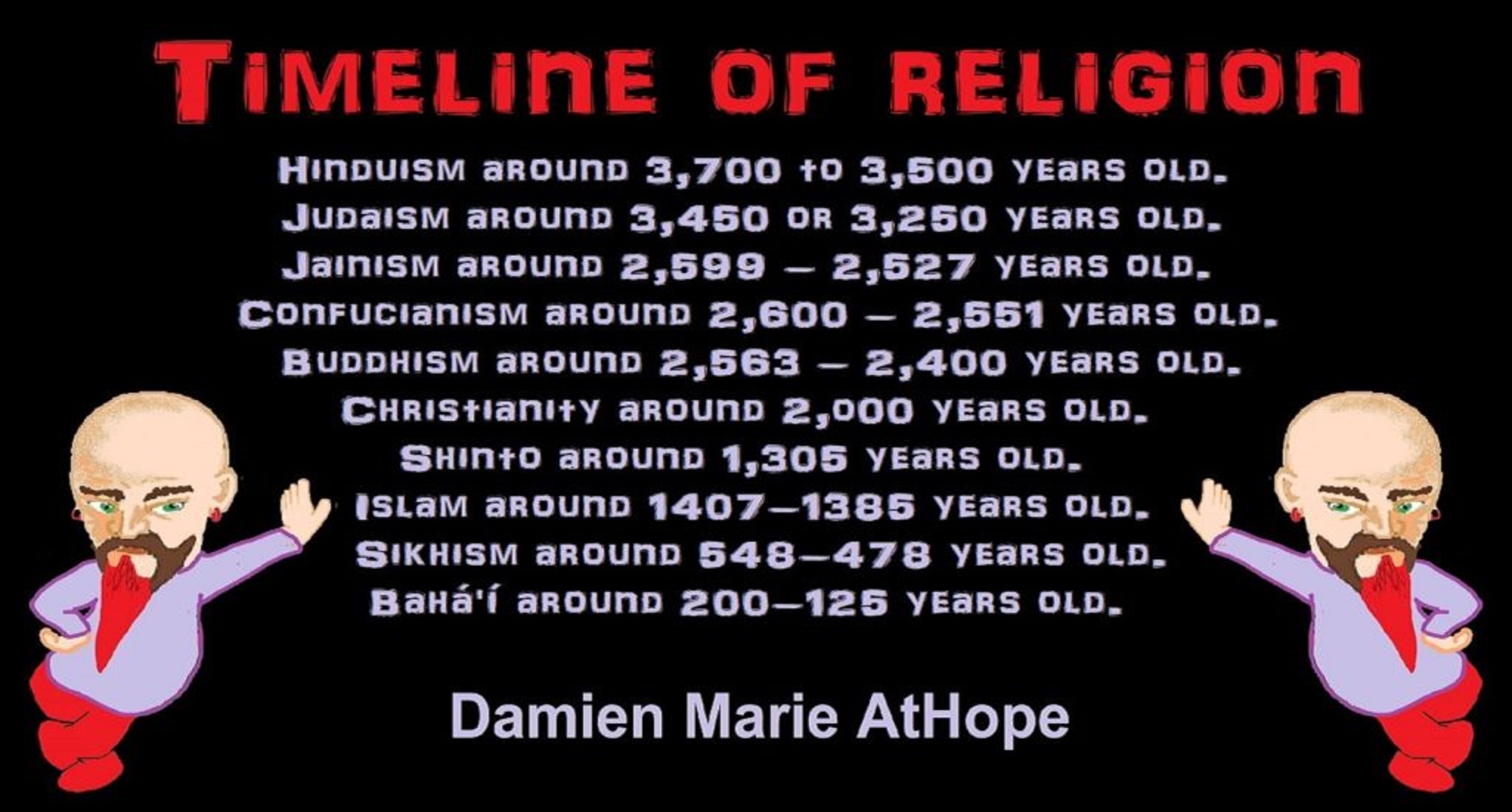
Hinduism around 3,700 to 3,500 years old. ref
Judaism around 3,450 or 3,250 years old. (The first writing in the bible was “Paleo-Hebrew” dated to around 3,000 years ago Khirbet Qeiyafa is the site of an ancient fortress city overlooking the Elah Valley. And many believe the religious Jewish texts were completed around 2,500) ref, ref
Judaism is around 3,450 or 3,250 years old. (“Paleo-Hebrew” 3,000 years ago and Torah 2,500 years ago)
“Judaism is an Abrahamic, its roots as an organized religion in the Middle East during the Bronze Age. Some scholars argue that modern Judaism evolved from Yahwism, the religion of ancient Israel and Judah, by the late 6th century BCE, and is thus considered to be one of the oldest monotheistic religions.” ref
“Yahwism is the name given by modern scholars to the religion of ancient Israel, essentially polytheistic, with a plethora of gods and goddesses. Heading the pantheon was Yahweh, the national god of the Israelite kingdoms of Israel and Judah, with his consort, the goddess Asherah; below them were second-tier gods and goddesses such as Baal, Shamash, Yarikh, Mot, and Astarte, all of whom had their own priests and prophets and numbered royalty among their devotees, and a third and fourth tier of minor divine beings, including the mal’ak, the messengers of the higher gods, who in later times became the angels of Judaism, Christianity and Islam. Yahweh, however, was not the ‘original’ god of Israel “Isra-El”; it is El, the head of the Canaanite pantheon, whose name forms the basis of the name “Israel”, and none of the Old Testament patriarchs, the tribes of Israel, the Judges, or the earliest monarchs, have a Yahwistic theophoric name (i.e., one incorporating the name of Yahweh).” ref
“El is a Northwest Semitic word meaning “god” or “deity“, or referring (as a proper name) to any one of multiple major ancient Near Eastern deities. A rarer form, ‘ila, represents the predicate form in Old Akkadian and in Amorite. The word is derived from the Proto-Semitic *ʔil-, meaning “god”. Specific deities known as ‘El or ‘Il include the supreme god of the ancient Canaanite religion and the supreme god of East Semitic speakers in Mesopotamia’s Early Dynastic Period. ʼĒl is listed at the head of many pantheons. In some Canaanite and Ugaritic sources, ʼĒl played a role as father of the gods, of creation, or both. For example, in the Ugaritic texts, ʾil mlk is understood to mean “ʼĒl the King” but ʾil hd as “the god Hadad“. The Semitic root ʾlh (Arabic ʾilāh, Aramaic ʾAlāh, ʾElāh, Hebrew ʾelōah) may be ʾl with a parasitic h, and ʾl may be an abbreviated form of ʾlh. In Ugaritic the plural form meaning “gods” is ʾilhm, equivalent to Hebrew ʾelōhîm “powers”. In the Hebrew texts this word is interpreted as being semantically singular for “god” by biblical commentators. However the documentary hypothesis for the Old Testament (corresponds to the Jewish Torah) developed originally in the 1870s, identifies these that different authors – the Jahwist, Elohist, Deuteronomist, and the Priestly source – were responsible for editing stories from a polytheistic religion into those of a monotheistic religion. Inconsistencies that arise between monotheism and polytheism in the texts are reflective of this hypothesis.” ref
Jainism around 2,599 – 2,527 years old. ref
Confucianism around 2,600 – 2,551 years old. ref
Buddhism around 2,563/2,480 – 2,483/2,400 years old. ref
Christianity around 2,o00 years old. ref
Shinto around 1,305 years old. ref
Islam around 1407–1385 years old. ref
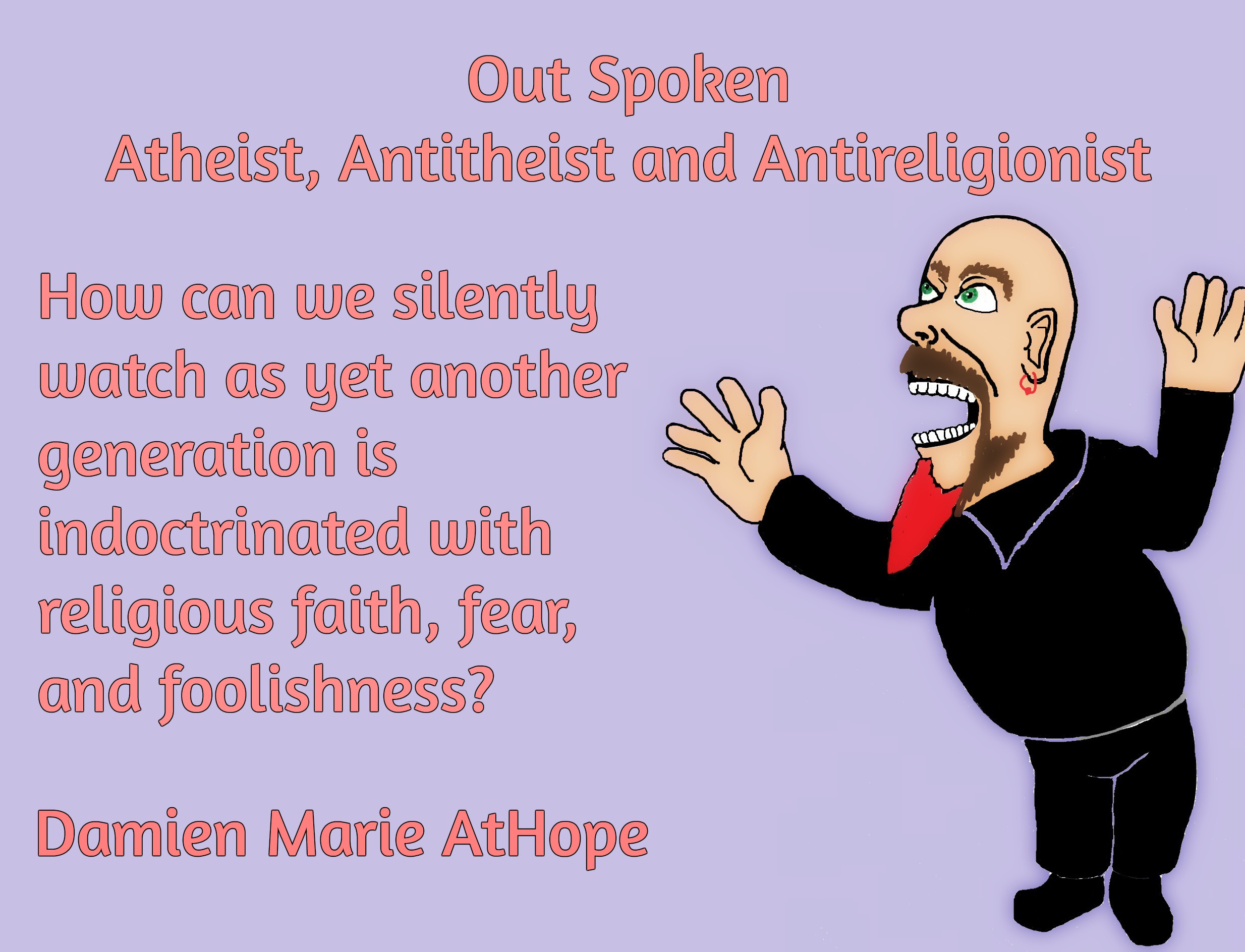
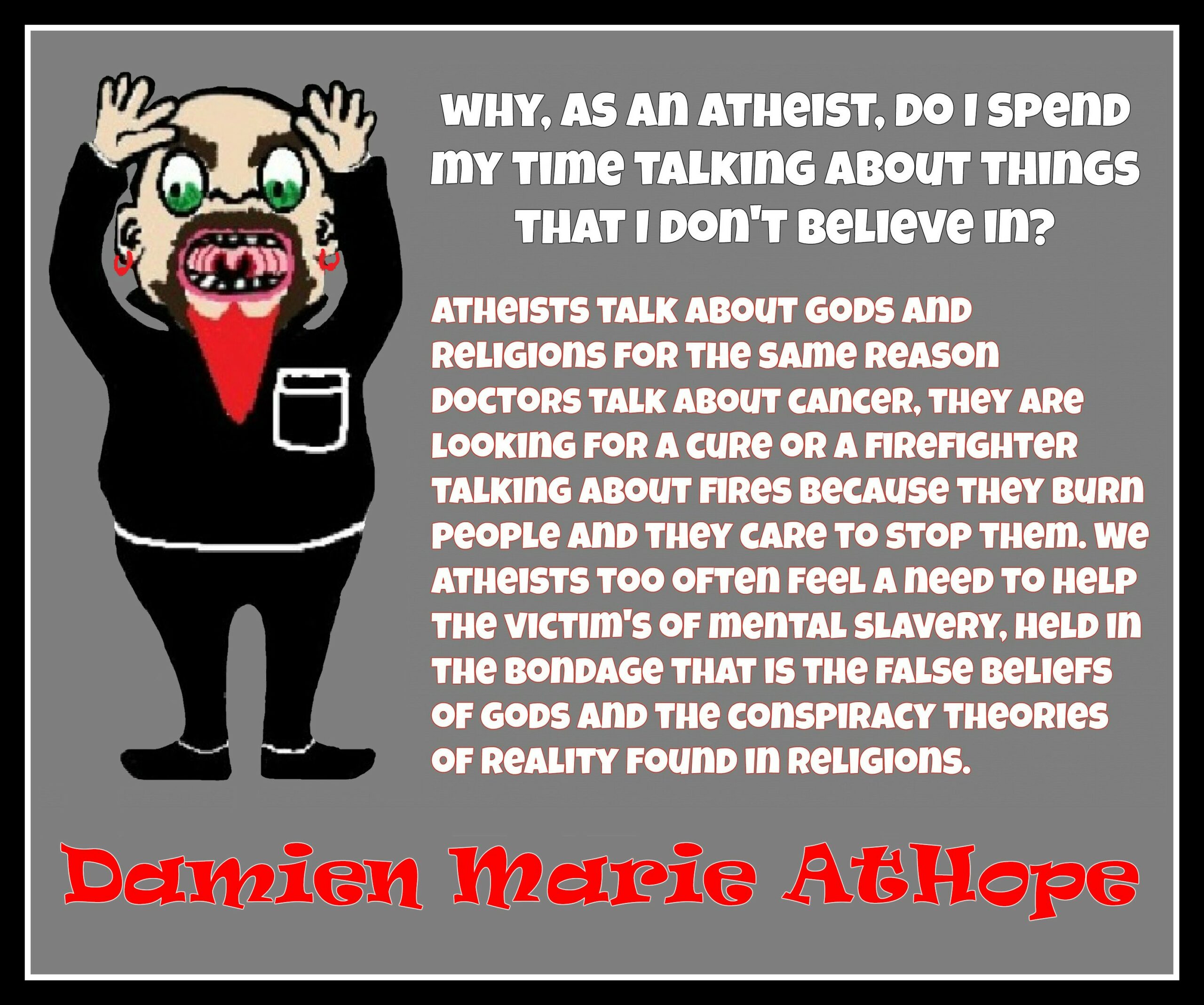
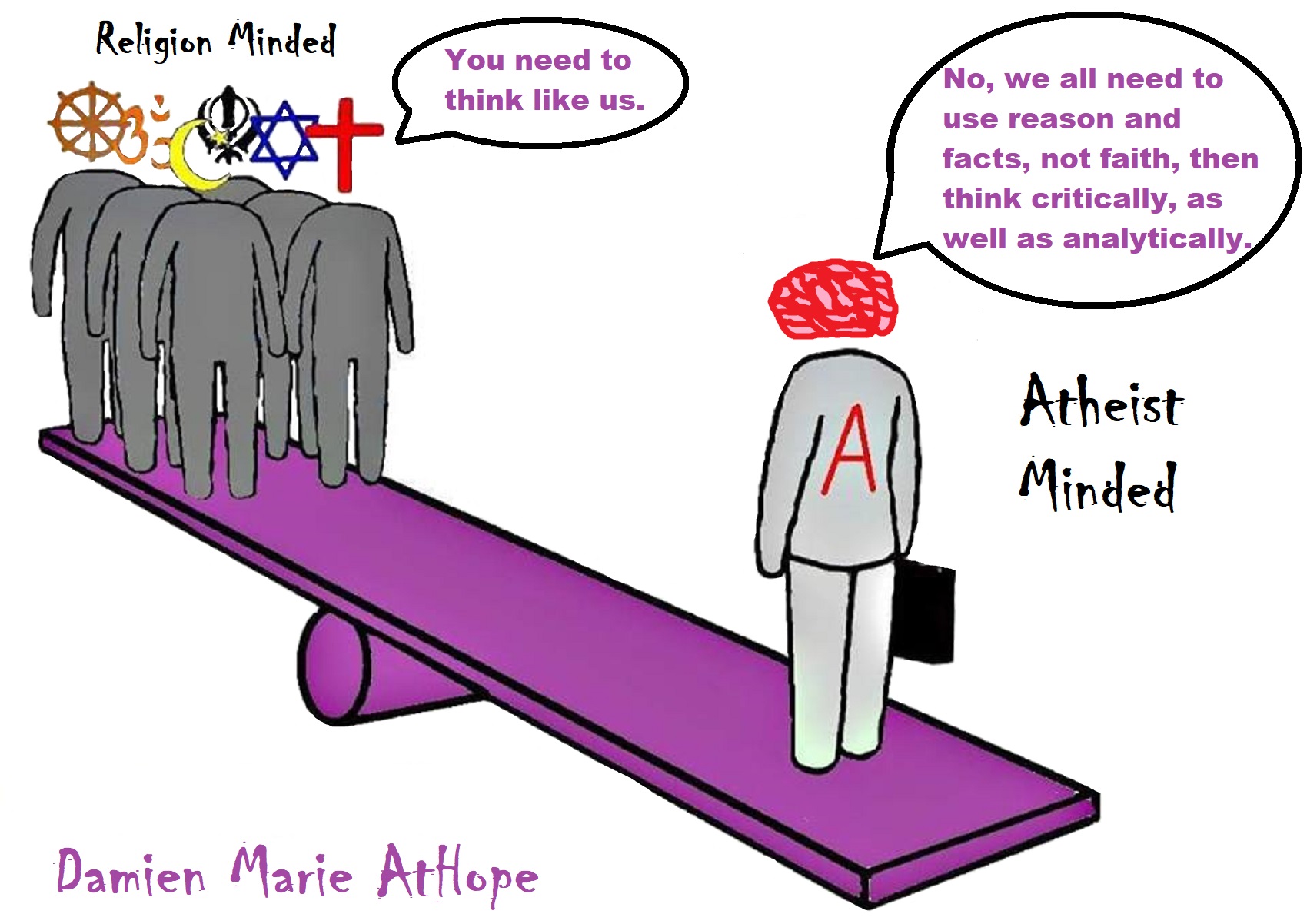

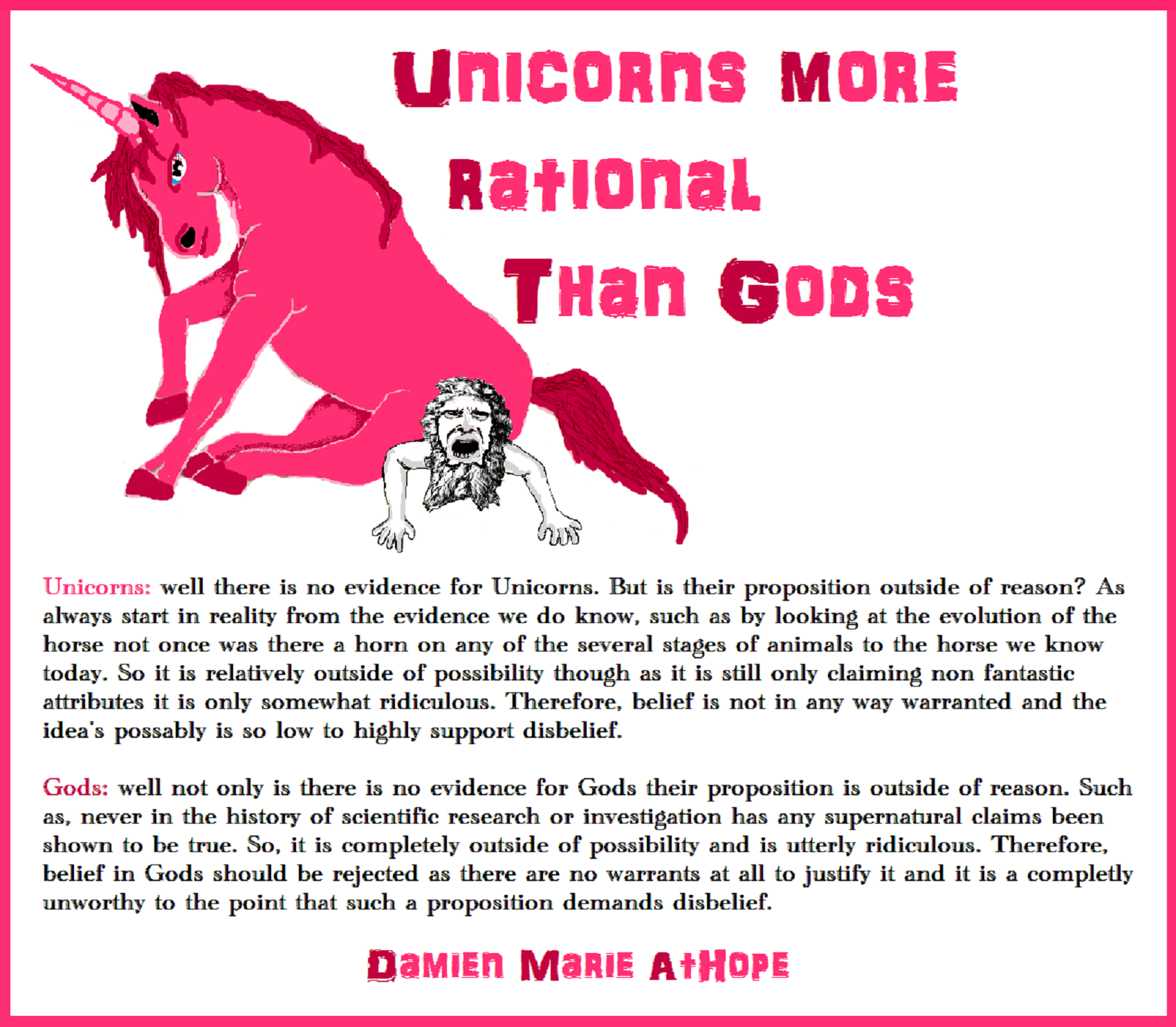


“Theists, there has to be a god, as something can not come from nothing.”
Well, thus something (unknown) happened and then there was something. This does not tell us what the something that may have been involved with something coming from nothing. A supposed first cause, thus something (unknown) happened and then there was something is not an open invitation to claim it as known, neither is it justified to call or label such an unknown as anything, especially an unsubstantiated magical thinking belief born of mythology and religious storytelling.


While hallucinogens are associated with shamanism, it is alcohol that is associated with paganism.
The Atheist-Humanist-Leftist Revolutionaries Shows in the prehistory series:
Show two: Pre-animism 300,000 years old and animism 100,000 years old: related to “Anarchism and Socialism”
Show tree: Totemism 50,000 years old: related to “Anarchism and Socialism”
Show four: Shamanism 30,000 years old: related to “Anarchism and Socialism”
Show five: Paganism 12,000 years old: related to “Anarchism and Socialism”
Show six: Emergence of hierarchy, sexism, slavery, and the new male god dominance: Paganism 7,000-5,000 years old: related to “Anarchism and Socialism” (Capitalism) (World War 0) Elite and their slaves!
Prehistory: related to “Anarchism and Socialism” the division of labor, power, rights, and recourses: VIDEO
Pre-animism 300,000 years old and animism 100,000 years old: related to “Anarchism and Socialism”: VIDEO
Totemism 50,000 years old: related to “Anarchism and Socialism”: VIDEO
Shamanism 30,000 years old: related to “Anarchism and Socialism”: VIDEO
Paganism 12,000 years old: related to “Anarchism and Socialism” (Pre-Capitalism): VIDEO
Paganism 7,000-5,000 years old: related to “Anarchism and Socialism” (Capitalism) (World War 0) Elite and their slaves: VIEDO
Paganism 5,000 years old: progressed organized religion and the state: related to “Anarchism and Socialism” (Kings and the Rise of the State): VIEDO
Paganism 4,000 years old: related to “Anarchism and Socialism” (First Moralistic gods, then the Origin time of Monotheism): VIEDO
I do not hate simply because I challenge and expose myths or lies any more than others being thought of as loving simply because of the protection and hiding from challenge their favored myths or lies.
The truth is best championed in the sunlight of challenge.
An archaeologist once said to me “Damien religion and culture are very different”
My response, So are you saying that was always that way, such as would you say Native Americans’ cultures are separate from their religions? And do you think it always was the way you believe?
I had said that religion was a cultural product. That is still how I see it and there are other archaeologists that think close to me as well. Gods too are the myths of cultures that did not understand science or the world around them, seeing magic/supernatural everywhere.
I personally think there is a goddess and not enough evidence to support a male god at Çatalhöyük but if there was both a male and female god and goddess then I know the kind of gods they were like Proto-Indo-European mythology.
This series idea was addressed in, Anarchist Teaching as Free Public Education or Free Education in the Public: VIDEO
Our 12 video series: Organized Oppression: Mesopotamian State Force and the Politics of power (9,000-4,000 years ago), is adapted from: The Complete and Concise History of the Sumerians and Early Bronze Age Mesopotamia (7000-2000 BC): https://www.youtube.com/watch?v=szFjxmY7jQA by “History with Cy“
Show #1: Mesopotamian State Force and the Politics of Power (Samarra, Halaf, Ubaid)
Show #2: Mesopotamian State Force and the Politics of Power
Show #3: Mesopotamian State Force and the Politics of Power (Uruk and the First Cities)
Show #4: Mesopotamian State Force and the Politics of Power (First Kings)
Show #5: Mesopotamian State Force and the Politics of Power (Early Dynastic Period)
Show #6: Mesopotamian State Force and the Politics of Power
Show #7: Mesopotamian State Force and the Politics of Power (Sargon and Akkadian Rule)
Show #9: Mesopotamian State Force and the Politics of Power (Gudea of Lagash and Utu-hegal)
Show #12: Mesopotamian State Force and the Politics of Power (Aftermath and Legacy of Sumer)

The “Atheist-Humanist-Leftist Revolutionaries”
Cory Johnston ☭ Ⓐ Atheist Leftist @Skepticallefty & I (Damien Marie AtHope) @AthopeMarie (my YouTube & related blog) are working jointly in atheist, antitheist, antireligionist, antifascist, anarchist, socialist, and humanist endeavors in our videos together, generally, every other Saturday.
Why Does Power Bring Responsibility?
Think, how often is it the powerless that start wars, oppress others, or commit genocide? So, I guess the question is to us all, to ask, how can power not carry responsibility in a humanity concept? I know I see the deep ethical responsibility that if there is power their must be a humanistic responsibility of ethical and empathic stewardship of that power. Will I be brave enough to be kind? Will I possess enough courage to be compassionate? Will my valor reach its height of empathy? I as everyone, earns our justified respect by our actions, that are good, ethical, just, protecting, and kind. Do I have enough self-respect to put my love for humanity’s flushing, over being brought down by some of its bad actors? May we all be the ones doing good actions in the world, to help human flourishing.
I create the world I want to live in, striving for flourishing. Which is not a place but a positive potential involvement and promotion; a life of humanist goal precision. To master oneself, also means mastering positive prosocial behaviors needed for human flourishing. I may have lost a god myth as an atheist, but I am happy to tell you, my friend, it is exactly because of that, leaving the mental terrorizer, god belief, that I truly regained my connected ethical as well as kind humanity.
Cory and I will talk about prehistory and theism, addressing the relevance to atheism, anarchism, and socialism.
At the same time as the rise of the male god, 7,000 years ago, there was also the very time there was the rise of violence, war, and clans to kingdoms, then empires, then states. It is all connected back to 7,000 years ago, and it moved across the world.
Cory Johnston: https://damienmarieathope.com/2021/04/cory-johnston-mind-of-a-skeptical-leftist/?v=32aec8db952d
The Mind of a Skeptical Leftist (YouTube)
Cory Johnston: Mind of a Skeptical Leftist @Skepticallefty
The Mind of a Skeptical Leftist By Cory Johnston: “Promoting critical thinking, social justice, and left-wing politics by covering current events and talking to a variety of people. Cory Johnston has been thoughtfully talking to people and attempting to promote critical thinking, social justice, and left-wing politics.” http://anchor.fm/skepticalleft
Cory needs our support. We rise by helping each other.
Cory Johnston ☭ Ⓐ @Skepticallefty Evidence-based atheist leftist (he/him) Producer, host, and co-host of 4 podcasts @skeptarchy @skpoliticspod and @AthopeMarie
Damien Marie AtHope (“At Hope”) Axiological Atheist, Anti-theist, Anti-religionist, Secular Humanist. Rationalist, Writer, Artist, Poet, Philosopher, Advocate, Activist, Psychology, and Armchair Archaeology/Anthropology/Historian.
Damien is interested in: Freedom, Liberty, Justice, Equality, Ethics, Humanism, Science, Atheism, Antiteism, Antireligionism, Ignosticism, Left-Libertarianism, Anarchism, Socialism, Mutualism, Axiology, Metaphysics, LGBTQI, Philosophy, Advocacy, Activism, Mental Health, Psychology, Archaeology, Social Work, Sexual Rights, Marriage Rights, Woman’s Rights, Gender Rights, Child Rights, Secular Rights, Race Equality, Ageism/Disability Equality, Etc. And a far-leftist, “Anarcho-Humanist.”
I am not a good fit in the atheist movement that is mostly pro-capitalist, I am anti-capitalist. Mostly pro-skeptic, I am a rationalist not valuing skepticism. Mostly pro-agnostic, I am anti-agnostic. Mostly limited to anti-Abrahamic religions, I am an anti-religionist.
To me, the “male god” seems to have either emerged or become prominent around 7,000 years ago, whereas the now favored monotheism “male god” is more like 4,000 years ago or so. To me, the “female goddess” seems to have either emerged or become prominent around 11,000-10,000 years ago or so, losing the majority of its once prominence around 2,000 years ago due largely to the now favored monotheism “male god” that grow in prominence after 4,000 years ago or so.
My Thought on the Evolution of Gods?
Animal protector deities from old totems/spirit animal beliefs come first to me, 13,000/12,000 years ago, then women as deities 11,000/10,000 years ago, then male gods around 7,000/8,000 years ago. Moralistic gods around 5,000/4,000 years ago, and monotheistic gods around 4,000/3,000 years ago.
To me, animal gods were likely first related to totemism animals around 13,000 to 12,000 years ago or older. Female as goddesses was next to me, 11,000 to 10,000 years ago or so with the emergence of agriculture. Then male gods come about 8,000 to 7,000 years ago with clan wars. Many monotheism-themed religions started in henotheism, emerging out of polytheism/paganism.
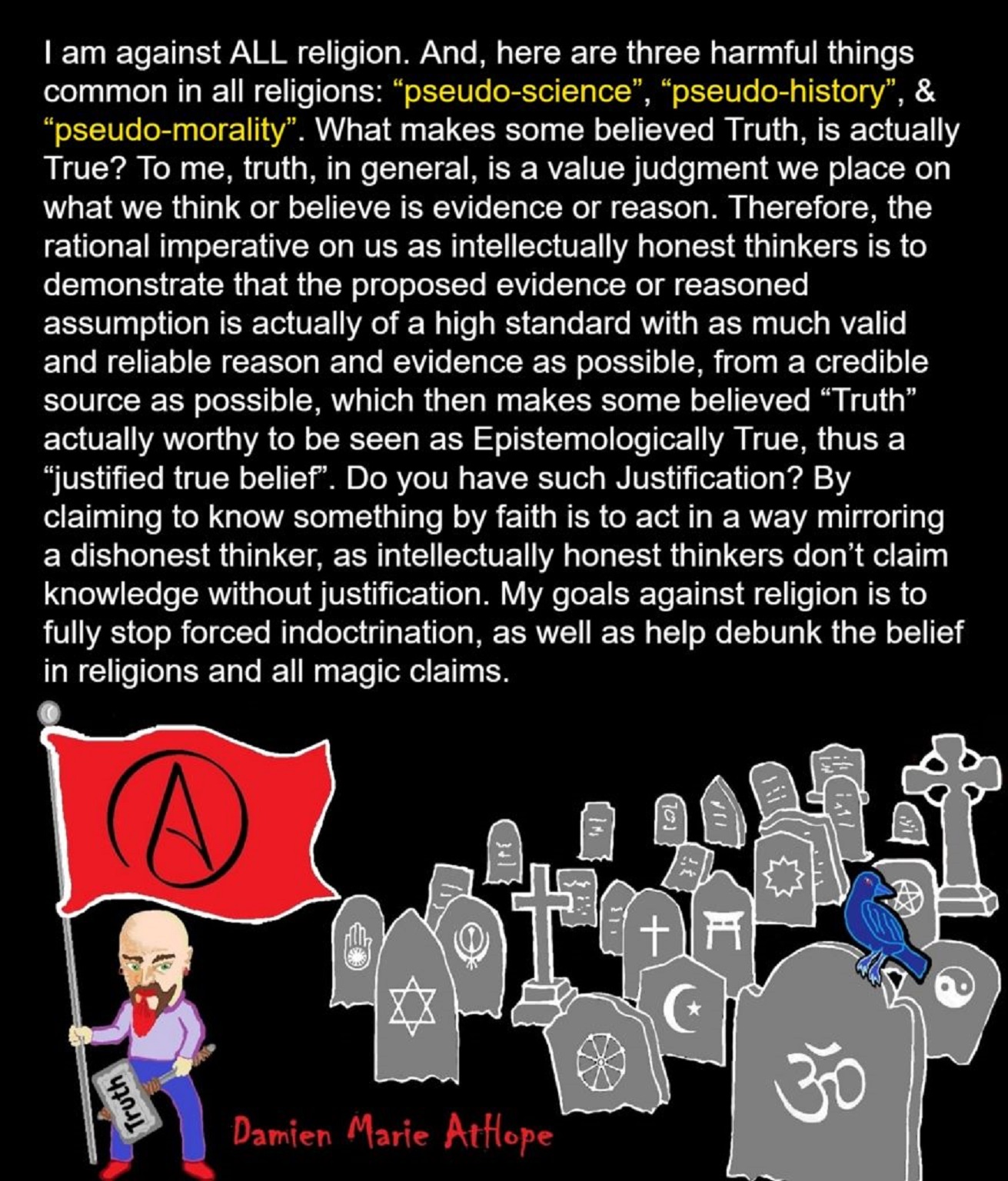

Damien Marie AtHope (Said as “At” “Hope”)/(Autodidact Polymath but not good at math):
Axiological Atheist, Anti-theist, Anti-religionist, Secular Humanist, Rationalist, Writer, Artist, Jeweler, Poet, “autodidact” Philosopher, schooled in Psychology, and “autodidact” Armchair Archaeology/Anthropology/Pre-Historian (Knowledgeable in the range of: 1 million to 5,000/4,000 years ago). I am an anarchist socialist politically. Reasons for or Types of Atheism
My Website, My Blog, & Short-writing or Quotes, My YouTube, Twitter: @AthopeMarie, and My Email: damien.marie.athope@gmail.com

